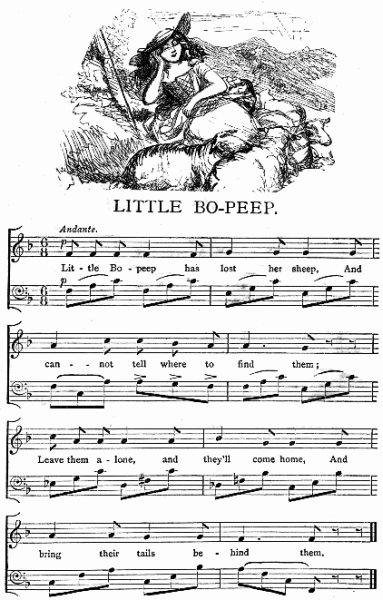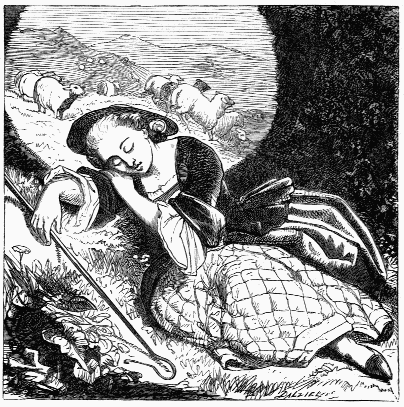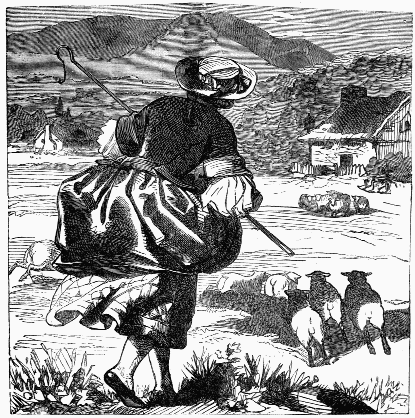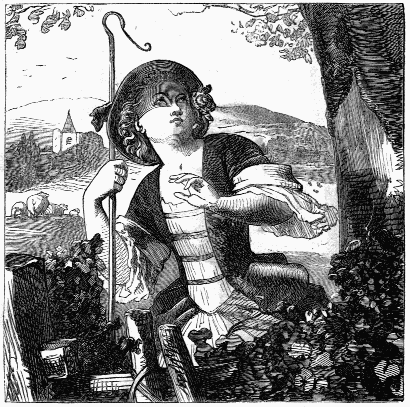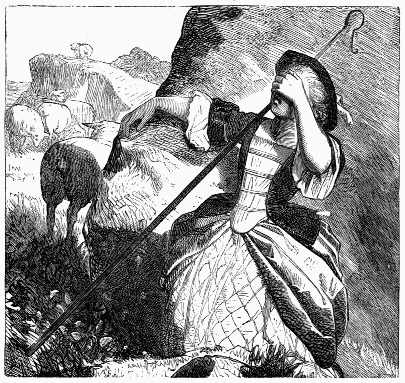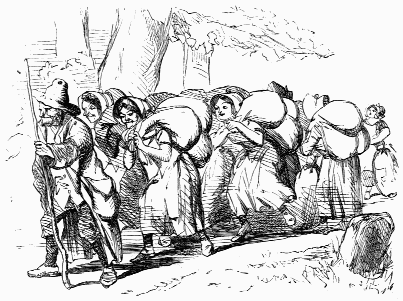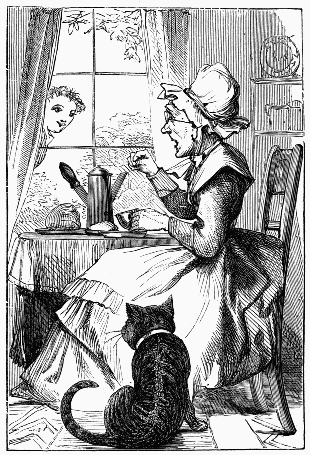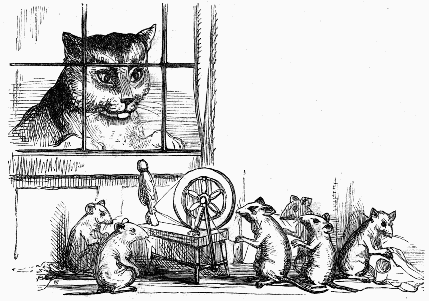The Project Gutenberg EBook of Mother Goose's Nursery Rhymes, by Walter Crane
This eBook is for the use of anyone anywhere at no cost and with
almost no restrictions whatsoever. You may copy it, give it away or
re-use it under the terms of the Project Gutenberg License included
with this eBook or online at www.gutenberg.org
Title: Mother Goose's Nursery Rhymes
A Collection of Alphabets, Rhymes, Tales, and Jingles
Author: Walter Crane
Illustrator: John Gilbert
John Tenniel
Harrison Weir
and others
Release Date: May 24, 2012 [EBook #39784]
Language: English
Character set encoding: ISO-8859-1
*** START OF THIS PROJECT GUTENBERG EBOOK MOTHER GOOSE'S NURSERY RHYMES ***
Produced by Chris Curnow, Emmy and the Online Distributed
Proofreading Team at http://www.pgdp.net Music transcribed
by Anne Celnick. (This file was produced from images
generously made available by The Internet Archive)
[ii]
[iii]
MOTHER GOOSE'S
Nursery Rhymes
A collection of
Alphabets, Rhymes, Tales, and Jingles
With Illustrations
BY
Sir JOHN GILBERT, R.A., JOHN TENNIEL, HARRISON WEIR,
WALTER CRANE, W. McCONNELL, J. B. ZWECKER
AND OTHERS
London
George Routledge and Sons
THE BROADWAY, LUDGATE
NEW YORK: 416 BROOME STREET
1877
[iv]
[v]
CONTENTS.
| | Page |
| A Apple Pie | 156 |
| A B C, Tumble down D | 286 |
| A Carrion Crow sat on an Oak | 120 |
| A Diller, a Dollar, a Ten o'Clock Scholar | 257 |
| A Farmer went Trotting upon his Grey Mare | 292 |
| A little Boy went into a Barn | 207 |
| A little Cock Sparrow sat on a Tree | 309 |
| A Man of Words and not of Deeds | 295 |
| A Man went Hunting at Reigate | 47 |
| A-milking, a-milking, my Maid | 140 |
| Apple-Pie, Pudding, and Pancake | 288 |
| As I was going along, long, long | 140 |
| As I was going up Pippin Hill | 297 |
| As I was going up Primrose Hill | 207 |
| As I was going to St. Ives | 318 |
| As I went to Bonner | 60 |
| As Tommy Snooks and Bessy Brooks | 264 |
| At the Siege of Belleisle I was there all the while | 141 |
| Away, Birds, away! | 118 |
| |
| Baa, baa, Black Sheep (Music) | 170 |
| Barber, Barber, shave a Pig | 172 |
| Bat, Bat, come under my Hat | 241 |
| Bessy Bell and Mary Gray | 173 |
| Bless you, bless you, bonny Bee | 308 |
| Blow, Wind, blow, and go, Mill, go | 183 |
| Bow-wow-wow | 304 |
| Boys and Girls, come out to Play | 14 |
| Brow, brow, brinkie | 61 |
| Bye, Baby Bunting | 141 |
| |
| Charley, Charley, stole the Barley | 285 |
| Come, let's to bed, says Sleepy-Head | 144 |
| Cross-Patch, draw the Latch | 223 |
| Cry, Baby, cry | 214 |
| Curly-Locks, Curly-Locks, wilt thou be mine? | 188 |
| |
| Daffy-Down-dilly has come up to Town | 209 |
| Dame Duck's Lessons to her Ducklings | 150 |
| Dance a Baby Diddit | 141 |
| Dance to your Daddy | 180 |
| Death and Burial of poor Cock Robin | 79 |
| Deedle, deedle, Dumpling, my Son John | 228 |
| Dickery, Dickery, Dock (Music) | 256 |
| Dickery, Dickery, Dare | 58 |
| Ding, Dong, Bell | 224 |
| Ding, Dong, Darrow | 149 |
| Doctor Foster went to Glo'ster | 148 |
| |
| Early to Bed and Early to Rise | 297 |
| Eggs, Butter, Cheese, Bread | 221 |
| Elizabeth, Elspeth, Betsy, and Bess | 286 |
| |
| For every Evil under the Sun | 300 |
| Four and Twenty Tailors went to kill a Snail | 148 |
| Freddie in the Cherry-Tree | 111 |
| Frog he would a-wooing go | 124 |
| [vi]Frog's (The) Chorus | 222 |
| |
| Georgie Porgie (Music) | 289 |
| Good Dobbin | 265 |
| Good King Arthur | 51 |
| Goosey, Goosey, Gander (Music) | 193 |
| Go to Bed first, a Golden Purse | 318 |
| Great A, Little A | 239 |
| |
| Handy, Spandy, Jack-a-Dandy | 194 |
| Hark, hark, the Dogs do bark | 190 |
| Here am I, little Jumping Joan | 264 |
| Here we go up, up, up | 194 |
| He that would Thrive | 217 |
| Hey, diddle, diddle | 174 |
| Hey, my Kitten, my Kitten | 194 |
| Hickety, Pickety, my Black Hen | 230 |
| High Diddle Ding | 135 |
| High diddle doubt, my Candle's out | 169 |
| Hot Cross Buns | 52 |
| Humpty Dumpty sat on a Wall (Music) | 48 |
| Hush-a-bye, Baby | 217 |
| Hush-a-bye, Baby, lie still with thy Daddy | 294 |
| Hush Baby, my Doll, I pray you don't cry | 61 |
| |
| If all the World were Water | 194 |
| If Wishes were Horses, Beggars would ride | 189 |
| If you are to be a Gentleman | 61 |
| I had a little Dog, they called him Buff | 119 |
| I had a little Hen, the prettiest ever seen | 208 |
| I had a little Hobby-Horse | 221 |
| I had a little Husband no bigger than my Thumb | 192 |
| I had a little Pony | 195 |
| I have a little Sister they call her Peep, Peep | 192 |
| I'll tell you a Story | 231 |
| I love Sixpence | 232 |
| I love little Pussy | 290 |
| I saw a Ship a-sailing | 129 |
| Is John Smith within? | 153 |
| |
| Jack and Jill went up the Hill (Music) | 212 |
| Jack be Nimble | 183 |
| Jack Sprat could eat no Fat | 60 |
| Jack Sprat had a Cat | 119 |
| Jack Sprat's Pig | 308 |
| Jacky, come give me thy Fiddle | 257 |
| Jenny shall have a new Bonnet | 305 |
| John Cook he had a little Grey Mare | 153 |
| John Gilpin | 266 |
| |
| Ladybird, Ladybird | 261 |
| Leg over Leg | 261 |
| "Let us go to the Woods," says this Pig | 304 |
| Little Betty Blue | 294 |
| Little Blue Betty lived in a Lane | 123 |
| Little Bo-Peep (Music) | 312 |
| Little Boy Blue | 136 |
| Little Boy, pretty Boy, where were you born? | 173 |
| Little Girl, little Girl, where have you been? | 180 |
| Little Jack Horner (Music) | 80 |
| Little Miss Muffett | 263 |
| Little Nancy Etticote | 123 |
| Little Polly Flinders | 239 |
| Little Robin Redbreast sat upon a Rail | 149 |
| Little Tommy Tittlemouse | 195 |
| Little Tom Tucker (Music) | 146 |
| |
| [vii]Margery Mutton-Pie and Johnny Bo-Peep | 188 |
| Marriage of Cock Robin and Jenny Wren | 84 |
| Mary had a pretty Bird | 122 |
| Mary, Mary, quite contrary | 148 |
| Molly, my Sister, and I fell out | 59 |
| Mr. Isbister and Betsy his Sister | 311 |
| Multiplication is Vexation | 209 |
| My Lady Wind, my Lady Wind | 303 |
| My little Old Man and I fell out | 288 |
| |
| Needles and Pins, Needles and Pins | 300 |
| Nievie, Nievie, Nicknack | 306 |
| Nursery Rhyme Alphabet | 226 |
| |
| Oh, Mother, I'm to be Married to Mr. Punchinello | 306 |
| Oh, the Rusty, Dusty, Rusty Miller | 168 |
| Old Father Grey Beard | 140 |
| Old King Cole | 154 |
| Old Mother Goose | 9 |
| Old Mother Hubbard | 64 |
| Old Mother Widdle-Waddle | 206 |
| Old Woman, Old Woman, shall we go a-Shearing? | 298 |
| One misty, moisty Morning | 228 |
| One, Two, buckle my Shoe | 191 |
| One, Two, Three | 219 |
| One, Two, Three, Four, Five | 261 |
| |
| Pat-a-cake, pat-a-cake, Baker's Man | 299 |
| Pease Pudding Hot | 188 |
| Peter White will ne'er go right | 217 |
| Pit, pat, well-a-day! | 149 |
| Pitty Patty Polt | 61 |
| Please to remember the Fifth of November | 260 |
| Poor Dog Bright | 296 |
| Poor old Robinson Crusoe | 240 |
| Pussy Cat ate the Dumplings | 299 |
| Pussy Cat, Pussy Cat, where have you been? | 195 |
| Pussy sits beside the Fire | 168 |
| |
| Queen Anne, Queen Anne, she sits in the Sun | 180 |
| |
| Rain, Rain, go away | 309 |
| Rain, Rain, go to Spain | 307 |
| Ride a Cock-Horse | 184 |
| Robin and Richard were two pretty Men | 183 |
| |
| See a Pin and pick it up | 259 |
| See-saw, Margery Daw | 178 |
| See, see, what shall I see? | 195 |
| Simple Simon (Music) | 112 |
| Sing a Song of Sixpence (Music) | 234 |
| Snail, Snail, come out of your Hole | 141 |
| Snail, Snail, come put out your Horn | 189 |
| Solomon Grundy | 59 |
| Some little Mice sat in a Barn | 320 |
| Swan, Swan, over the Sea | 228 |
| |
| Taffy was a Welshman | 291 |
| The Barber shaved the Mason | 63 |
| The Cat sat asleep by the side of the Fire | 264 |
| The Cock doth Crow | 119 |
| The Cuckoo's a bonny Bird | 298 |
| The Fox and the Farmer | 186 |
| The great Brown Owl | 145 |
| The House that Jack built | 196 |
| The King of France went up the Hill | 119 |
| The Lion and the Unicorn were fighting for the Crown | 172 |
| The Man in the Moon | 149 |
| The North Wind doth blow | 241 |
| [viii]The Old Woman and her Pig | 242 |
| The Old Woman must stand at the Tub, Tub, Tub | 229 |
| The Queen of Hearts | 210 |
| There was a Crooked Man | 169 |
| There was a Fat Man of Bombay | 233 |
| There was a Jolly Miller | 56 |
| There was a little Man and he had a little Gun | 209 |
| There was a Monkey climbed up a Tree | 82 |
| There was an Old Crow | 223 |
| There was an Old Man of Tobago | 262 |
| There was an Old Woman, and what do you think? | 319 |
| There was an Old Woman as I've heard tell | 134 |
| There was an Old Woman called Nothing-at-all | 220 |
| There was an Old Woman lived under a Hill | 139 |
| There was an Old Woman tossed up in a Basket | 181 |
| There was an Old Woman who lived in a Shoe | 218 |
| There was an Owl lived in an Oak | 50 |
| There was a Rat, for want of Stairs | 188 |
| There were Three Crows sat ona Stone | 211 |
| The Robin Redbreasts | 138 |
| The Rose is Red, the Violet's Blue | 310 |
| The Turtle Dove's Nest | 215 |
| The Waves on the Sea-shore | 83 |
| The Wonderful Derby Ram | 302 |
| The Young Linnets | 176 |
| This is the way the Ladies go | 261 |
| Thomas a Tattamus took two T's | 172 |
| Three Children sliding on the Ice | 301 |
| Three Straws on a Staff | 209 |
| Three Wise Men of Gotham | 135 |
| To make your Candles last for aye | 144 |
| To Market, to Market, a gallop, a trot | 288 |
| To Market, to Market, to buy a Fat Pig | 52 |
| Tommy kept a Chandler's Shop | 258 |
| Tom Thumb's Alphabet | 15 |
| Tom, Tom, the Piper's Son (Music) | 130 |
| Twinkle, twinkle, little Star | 284 |
| Two Legs sat upon Three Legs | 206 |
| |
| Up Hill and down Dale | 287 |
| Up Hill, spare me | 307 |
| |
| Valentine, oh, Valentine | 311 |
| |
| Walrus (The) and the Carpenter | 42 |
| We are all in the Dumps | 139 |
| We'll go a-shooting | 310 |
| What's the News of the Day? | 223 |
| When I was a Bachelor, I lived by myself | 182 |
| When Little Fred went to Bed | 308 |
| When the Wind is in the East | 214 |
| Where are you going to, my pretty Maid? | 62 |
| Who Stole the Bird's Nest? | 53 |
| Willy Boy, Willy Boy, where are you going? | 118 |
| |
| Young Lambs to sell, Young Lambs to sell | 142 |
| You shall have an Apple | 294 |
[9]
MOTHER GOOSE'S NURSERY RHYMES.
OLD MOTHER GOOSE.
Old Mother Goose, when
She wanted to wander,
Would ride through the air
On a very fine gander.
Mother Goose had a house,
'Twas built in a wood,
Where an owl at the door
For sentinel stood.
This is her son Jack,
A plain-looking lad,
He is not very good,
Nor yet very bad.
She sent him to market,
A live goose he bought,
"Here, mother," says he,
"It will not go for nought."
Jack's goose and her gander
Grew very fond,
They'd both eat together,
Or swim in one pond.
[10]
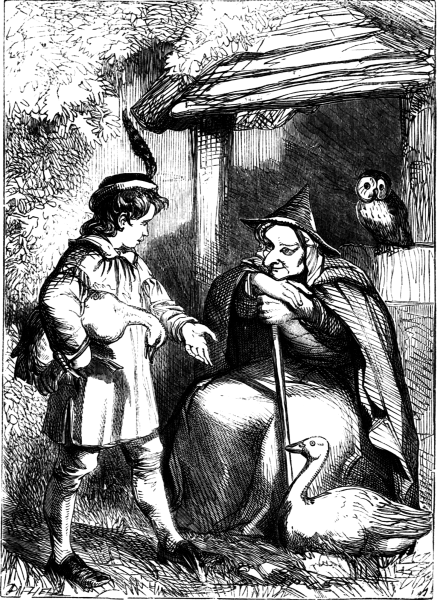 "SHE SENT HIM TO MARKET, A LIVE GOOSE HE BOUGHT."
"SHE SENT HIM TO MARKET, A LIVE GOOSE HE BOUGHT."
[11]
Jack found one fine morning
As I have been told,
His goose had laid him
An egg of pure gold.
Jack rode to his mother,
The news for to tell,
She called him a good boy
And said it was well.
Jack sold his gold egg
To a rogue of a Jew,
Who cheated him out of
The half of his due.
Then Jack went a-courting
A lady so gay,
As fair as the lily,
And sweet as the May.
The Jew and the Squire
Came behind his back,
And began to belabour
The sides of poor Jack.
And then the gold egg
Was thrown into the sea,
[12]
When Jack he jumped in,
And got it back presently.
The Jew got the goose,
Which he vowed he would kill,
Resolving at once
His pockets to fill.
[13]
Jack's mother came in,
And caught the goose soon,
And mounting its back,
Flew up to the moon.
[14]
Boys and girls, come out to play,
The moon does shine as bright as day,
Leave your supper, and leave your sleep,
And meet your playfellows in the street;
Come with a whoop, and come with a call,
And come with a good will, or not at all.
Up the ladder and down the wall,
A halfpenny loaf will serve us all.
You find milk and I'll find flour,
And we'll have a pudding in half an hour.
[15]
[16]
[17]
[18]
[19]
[20]
[21]
[22]
[23]
[24]
[25]
[26]
[27]
[28]
[29]
[30]
[31]
[32]
[33]
[34]
[35]
[36]
[37]
[38]
[39]
[40]
[41]
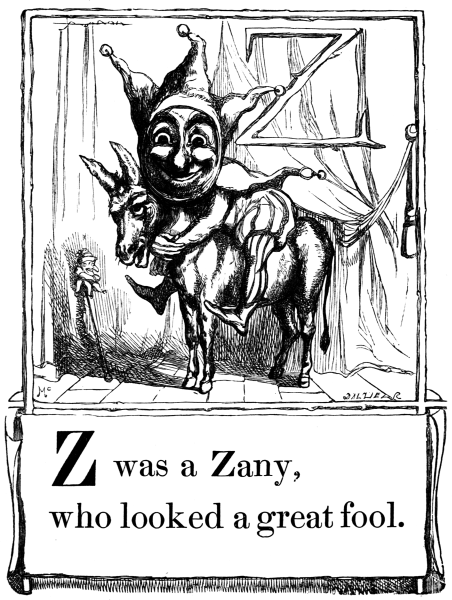
A was an Archer,
who shot at a frog.
B was a Butcher,
who had a great dog.
C was a Captain,
all covered with lace.
D was a Drummer,
who played with a grace.
E was an Esquire
with pride on his brow.
F was a Farmer,
who followed the plough.
G was a Gamester,
who had but ill-luck.
H was a Hunter,
who hunted a buck.
I was an Italian,
who had a white mouse.
J was a Joiner,
who built up a house.
K was a King,
so mighty and grand.
L was a Lady,
who had a white hand.
M was a Miser,
who hoarded up gold.
N was a Nobleman,
gallant and bold.
O was an Organ-Boy,
who played for his bread.
P a Policeman,
of bad boys the dread.
Q was a Quaker,
who would not bow down.
R was a Robber,
who prowled about town.
S was a Sailor,
who spent all he got.
T was a Tinker,
who mended a pot.
U was an Usher,
with dunces severe.
V was a Veteran,
who never knew fear.
W was a Waiter,
with dinners in store.
X was Expensive,
and so became poor.
Y was a Youth,
who did not like school.
Z was a Zany,
who looked a great fool.
[42]
THE WALRUS AND THE CARPENTER.
[A]
The sun was shining on the sea,
Shining with all his might:
He did his very best to make
The billows smooth and bright—
And this was odd, because it was
The middle of the night.
The moon was shining sulkily,
Because she thought the sun
Had got no business to be there
After the day was done—
"It's very rude of him," she said,
"To come and spoil the fun!"
The sea was wet as wet could be,
The sands were dry as dry.
You could not see a cloud, because
No cloud was in the sky:
No birds were flying overhead—
There were no birds to fly.
The Walrus and the Carpenter
Were walking close at hand;
They wept like anything to see
Such quantities of sand:
"If this were only cleared away,"
They said, "it would be grand!"
[43]
"If seven maids with seven mops
Swept it for half a year,
Do you suppose," the Walrus said,
"That they could get it clear?"
"I doubt it," said the Carpenter,
And shed a bitter tear.
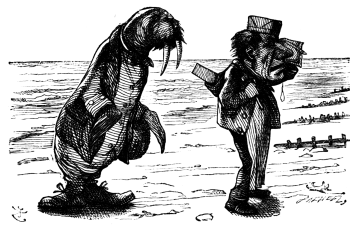
"O Oysters, come and walk with us!"
The Walrus did beseech.
"A pleasant walk, a pleasant talk,
Along the briny beach:
We cannot do with more than four,
To give a hand to each."
The eldest Oyster looked at him,
But never a word he said:
The eldest Oyster winked his eye,
And shook his heavy head—
Meaning to say he did not choose
[44]To leave the oyster-bed.
But four young Oysters hurried up,
All eager for the treat:
Their coats were brushed, their faces washed,
Their shoes were clean and neat—
And this was odd, because, you know,
They hadn't any feet.
Four other Oysters followed them,
And yet another four;
And thick and fast they came at last,
And more, and more, and more—
All hopping through the frothy waves,
And scrambling to the shore.
The Walrus and the Carpenter
Walked on a mile or so,
And then they rested on a rock
Conveniently low:
And all the little Oysters stood
And waited in a row.
"The time has come," the Walrus said,
"To talk of many things:
Of shoes—and ships—and sealing-wax—
Of cabbages—and kings—
And why the sea is boiling hot—
And whether pigs have wings."
"But wait a bit," the Oysters cried,
"Before we have our chat;
For some of us are out of breath,
And all of us are fat!"
"No hurry!" said the Carpenter.
They thanked him much for that.
[45]
"A loaf of bread," the Walrus said,
"Is what we chiefly need:
Pepper and vinegar besides
Are very good indeed—
Now if you're ready, Oysters dear,
We can begin to feed."
"But not on us!" the Oysters cried,
Turning a little blue.
"After such kindness, that would be
A dismal thing to do!"
"The night is fine," the Walrus said.
"Do you admire the view?
"It was so kind of you to come!
And you are very nice!"
The Carpenter said nothing but
"Cut us another slice:
I wish you were not quite so deaf—
[46]I've had to ask you twice!"
"It seems a shame," the Walrus said,
"To play them such a trick,
After we've brought them out so far,
And made them trot so quick!"
The Carpenter said nothing but
"The butter's spread too thick!"
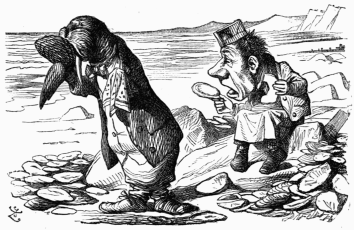
"I weep for you," the Walrus said:
"I deeply sympathize."
With sobs and tears he sorted out
Those of the largest size,
Holding his pocket-handkerchief
Before his streaming eyes.
"O Oysters," said the Carpenter,
"You've had a pleasant run!
Shall we be trotting home again?"
But answer there came none—
And this was scarcely odd, because
They'd eaten every one.
—Lewis Carroll.
[47]
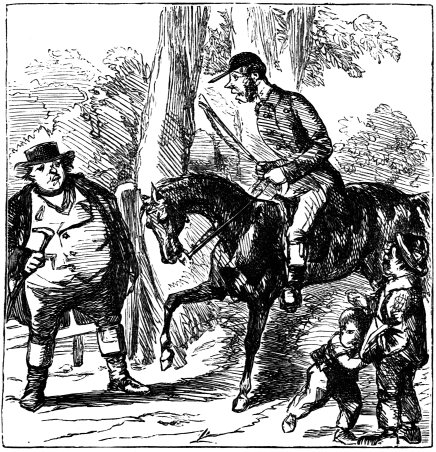 A MAN WENT HUNTING AT REIGATE.
A MAN WENT HUNTING AT REIGATE.
A man went hunting at Reigate,
And wished to jump over a high gate;
Says the owner, "Go round,
With your horse and your hound,
For you never shall leap over my gate."
[48]
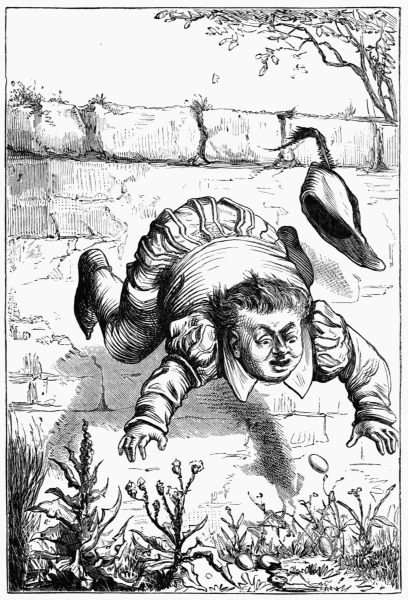 HUMPTY-DUMPTY.
HUMPTY-DUMPTY.
[49]
[Transcriber's Note: You can play this music (MIDI file) by clicking here.]
Humpty Dumpty sat on a wall,
Humpty Dumpty had a great fall;
All the king's horses,
and all the king's men,
Couldn't set Humpty Dumpty up again.
[50]
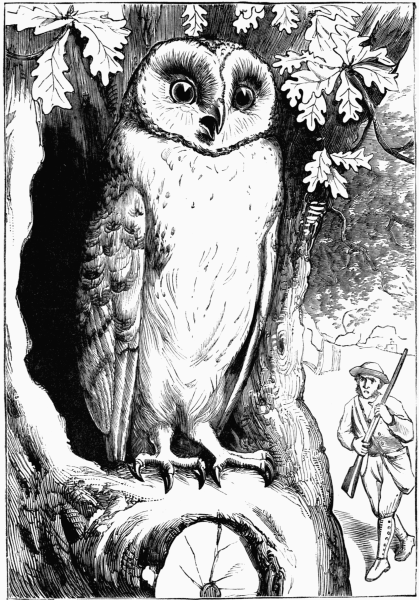 "THERE WAS AN OWL LIVED IN AN OAK."
"THERE WAS AN OWL LIVED IN AN OAK."
[51]
There was an Owl lived in an oak,
Whiskey, Whaskey, Weedle;
And all the words he ever spoke
Were Fiddle, Faddle, Feedle.
A sportsman chanced to come that way,
Whiskey, Whaskey, Weedle;
Says he, "I'll shoot you, silly bird,
So Fiddle, Faddle, Feedle!"
GOOD KING ARTHUR.
When good King Arthur ruled this land,
He was a goodly King;
He bought three pecks of barley-meal,
To make a bag-pudding.
A bag-pudding the King did make,
And stuffed it well with plums,
And in it put great lumps of fat,
As big as my two thumbs.
The King and Queen did eat thereof,
And noblemen beside;
And what they could not eat that night,
The Queen next morning fried.
[52]
To market, to market, to buy a fat pig,
Home again, home again, jiggety jig.
To market, to market, to buy a fat hog,
Home again, home again, jiggety jog.
Hot cross buns, hot cross buns,
One a penny, two a penny,
Hot cross buns.
If your daughters don't like them,
Give them to your sons,
One a penny, two a penny,
Hot cross buns.
[53]
WHO STOLE THE BIRD'S-NEST?
To-whit! to-whit! to-whee!
Will you listen to me?
Who stole four eggs I laid,
And the nice nest I made?
Not I, said the cow, moo-oo!
Such a thing I'd never do.
I gave you a wisp of hay,
But did not take your nest away;
Not I, said the cow, moo-oo!
Such a thing I'd never do.
Bob-o-link! Bob-o-link!
Now, what do you think?
Who stole a nest away
From the plum-tree to-day?
[54]
Not I, said the dog, bow-wow!
I wouldn't be so mean, I vow.
I gave some hairs the nest to make,
But the nest I did not take;
Not I, said the dog, bow-wow!
I would not be so mean, I vow.
Coo-coo! coo-coo! coo-coo!
Let me speak a word or two:
Who stole that pretty nest
From little Robin Redbreast?
Not I, said the sheep; oh, no,
I would not treat a poor bird so;
I gave the wool the nest to line,
But the nest was none of mine.
Baa! baa! said the sheep; oh, no!
I wouldn't treat a poor bird so.
Caw! caw! cried the crow,
I should like to know
What thief took away
A bird's-nest to-day.
[55]
Chuck! chuck! said the hen,
Don't ask me again;
Why, I haven't a chick
Would do such a trick.
We all gave her a feather,
And she wove them together.
I'd scorn to intrude
On her and her brood.
Chuck! chuck! said the hen,
Don't ask me again.
Chirr-a-whirr! chirr-a-whirr!
We will make a great stir.
Let us find out his name,
And all cry—For shame!
A little boy hung down his head,
And went and hid behind the bed;
For he stole that pretty nest
From little Robin Redbreast;
And he felt so full of shame
He did not like to tell his name.
[56]
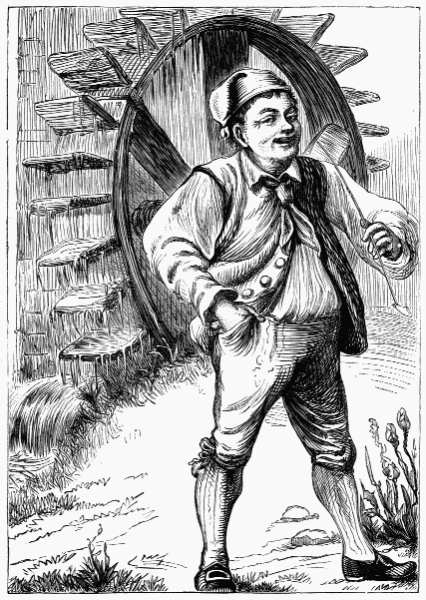 "THERE WAS A JOLLY MILLER."
"THERE WAS A JOLLY MILLER."
[57]
There was a jolly miller
Lived on the river Dee:
He worked and sang from morn till night,
No lark so blithe as he.
And this the burden of his song
For ever used to be—
I care for nobody—no! not I,
Since nobody cares for me.
[58]
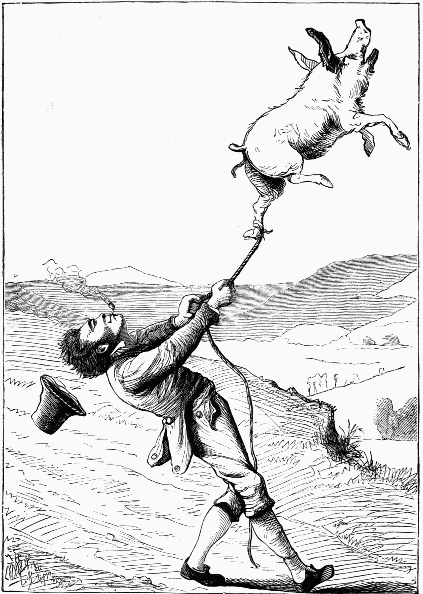 "DICKERY, DICKERY, DARE."
"DICKERY, DICKERY, DARE."
[59]
Dickery, dickery, dare,
The pig flew up in the air;
The man in brown soon brought him down,
Dickery, dickery, dare.
Molly, my sister, and I fell out,
And what do you think it was about?
She loved coffee, and I loved tea,
And that was the reason we couldn't agree.
Solomon Grundy,
Born on a Monday,
Christened on Tuesday,
Married on Wednesday,
Very ill on Thursday,
Worse on Friday,
Died on Saturday,
Buried on Sunday.
This is the end
Of Solomon Grundy.
[60]
Jack Sprat could eat no fat,
His wife could eat no lean;
And so betwixt them both, you see,
They licked the platter clean.
As I went to Bonner,
I met a pig
Without a wig,
Upon my word and honour.
[61]
Hush, baby, my doll, I pray you don't cry,
And I'll give you some bread, and some milk by-and-by;
Or perhaps you like custard, or, maybe, a tart,
Then to either you are welcome, with all my heart.
Pitty Patty Polt,
Shoe the wild colt;
Here a nail,
And there a nail,
Pitty Patty Polt.
Brow, brow, brinkie,
Eye, eye, winkie,
Mouth, mouth, merry,
Cheek, cheek, cherry,
Chin chopper, chin chopper,
&c.
If you are to be a gentleman, as I suppose you'll be,
You'll neither laugh nor smile for a tickling of the knee.
[62]
"Where are you going to, my pretty maid?"
"I am going a-milking, sir," she said.
"May I go with you, my pretty maid?"
[63]"You're kindly welcome, sir," she said.
"What is your father, my pretty maid?"
"My father's a farmer, sir," she said.
"What is your fortune, my pretty maid?"
"My face is my fortune, sir," she said.
"Then I won't marry you, my pretty maid."
"Nobody asked you, sir," she said.
The barber shaved the mason,
And as I suppose
Cut off his nose,
And popped it in the basin.
[64]
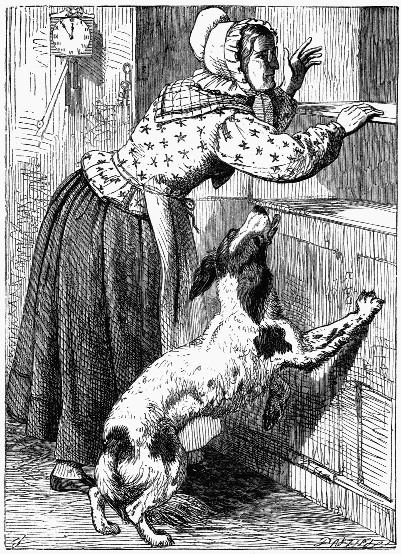 "OLD MOTHER HUBBARD WENT TO THE CUPBOARD."
"OLD MOTHER HUBBARD WENT TO THE CUPBOARD."
[65]
OLD MOTHER HUBBARD
AND HER DOG.
Old Mother Hubbard
Went to the cupboard,
To get her poor Dog a bone;
But when she came there
The cupboard was bare,
And so the poor Dog had none.
[66]
She went to the baker's
To buy him some bread,
But when she came back
The poor Dog was dead.
[67]
She went to the joiner's
To buy him a coffin,
But when she came back
The poor Dog was laughing,
[68]
She took a clean dish
To get him some tripe,
But when she came back
He was smoking a pipe.
[69]
She went to the alehouse
To get him some beer,
But when she came back
The Dog sat in a chair.
[70]
She went to the tavern
For white wine and red,
But when she came back
The Dog stood on his head.
[71]
She went to the hatter's
To buy him a hat,
But when she came back
He was feeding the cat.
[72]
She went to the barber's
To buy him a wig,
But when she came back
He was dancing a jig.
[73]
She went to the fruiterer's
To buy him some fruit,
But when she came back
He was playing the flute.
[74]
She went to the tailor's
To buy him a coat,
But when she came back
He was riding a goat.
[75]
She went to the cobbler's
To buy him some shoes,
But when she came back
He was reading the news.
[76]
She went to the sempstress
To buy him some linen,
But when she came back
The Dog was a-spinning.
[77]
She went to the hosier's
To buy him some hose,
But when she came back
He was dressed in his clothes.
[78]
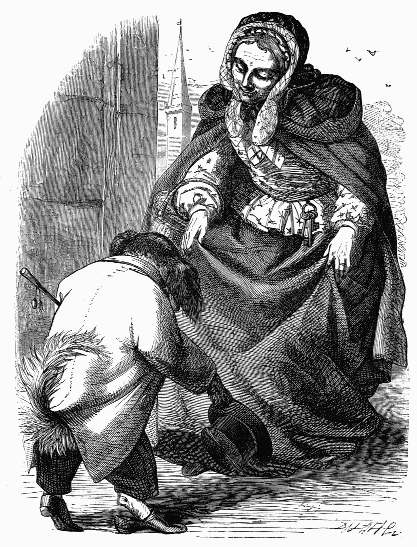 "THE DAME MADE A CURTSEY, THE DOG MADE A BOW."
"THE DAME MADE A CURTSEY, THE DOG MADE A BOW."
[79]
The Dame made a curtsey,
The Dog made a bow;
The Dame said, "Your servant,"
The Dog said, "Bow wow."
This wonderful Dog
Was Dame Hubbard's delight;
He could sing, he could dance,
He could read, he could write.
She gave him rich dainties
Whenever he fed,
And erected a monument
When he was dead.
[80]
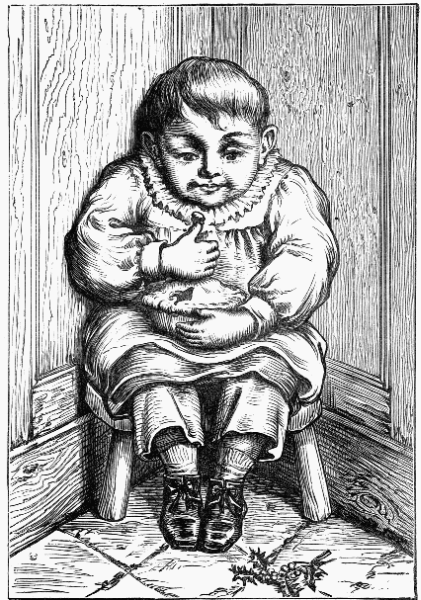 LITTLE JACK HORNER.
LITTLE JACK HORNER.
[81]
[Transcriber's Note: You can play this music (MIDI file) by clicking here.]
Little Jack Horner sat in a corner,
Eating a Christmas pie;
He put in his thumb, and he took out a plum,
And said, "What a good boy am I!"
[82]
There was a monkey climbed up a tree;
When he fell down, then down fell he.
There was a crow sat on a stone;
When he was gone, then there was none.
There was an old wife did eat an apple;
When she ate two, she had ate a couple.
There was a horse going to the mill;
When he went on, he didn't stand still.
There was a butcher cut his thumb.
When it did bleed, then blood it did run.
There was a jockey ran a race;
When he ran fast, he ran apace.
There was a cobbler, clouting shoon;
When they were mended, then they were done.
There was a navy went into Spain;
When it returned, it came back again.
[83]
THE WAVES ON THE SEA-SHORE.
Roll on, roll on, you restless waves,
That toss about and roar;
Why do you all run back again
When you have reached the shore?
Roll on, roll on, you noisy waves,
Roll higher up the strand;
How is it that you cannot pass
That line of yellow sand?
"We may not dare," the waves reply:
"That line of yellow sand
Is laid along the shore to bound
The waters and the land.
"And all should keep to time and place,
And all should keep to rule,
Both waves upon the sandy shore,
And little boys at school."
[84]
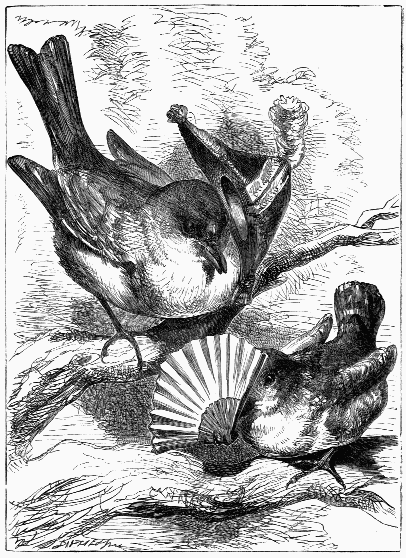 "JENNY BLUSHED BEHIND HER FAN."
"JENNY BLUSHED BEHIND HER FAN."
[85]
THE MARRIAGE OF COCK ROBIN AND
JENNY WREN.
It was on a merry time,
When Jenny Wren was young,
So neatly as she danced,
And so sweetly as she sung,—
Robin Redbreast lost his heart:
He was a gallant bird;
He doffed his hat to Jenny,
And thus to her he said:
[86]
"My dearest Jenny Wren,
If you will but be mine,
You shall dine on cherry-pie,
And drink nice currant-wine.
"I'll dress you like a goldfinch,
Or like a peacock gay;
So if you'll have me, Jenny,
Let us appoint the day."
[87]
Jenny blushed behind her fan,
And thus declared her mind:
"Then let it be to-morrow, Bob,—
I take your offer kind;
"Cherry-pie is very good,
So is currant-wine;
But I'll wear my russet gown,
And never dress too fine."
[88]
Robin rose up early,
At the break of day;
He flew to Jenny Wren's house,
To sing a roundelay.
He met the Cock and Hen,
And bade the Cock declare,
This was his wedding-day
With Jenny Wren the fair.
The Cock then blew his horn,
To let the neighbours know
This was Robin's wedding-day,
And they might see the show.
[89]
At first came Parson Rook,
With his spectacles and band;
And one of Mother Hubbard's books
He held within his hand.
Then followed him the Lark,
For he could sweetly sing,
And he was to be the clerk
At Cock Robin's wedding.
He sang of Robin's love
For Little Jenny Wren;
And when he came unto the end,
Then he began again.
[90]
The Goldfinch came on next,
To give away the Bride;
The Linnet, being bridesmaid,
Walked by Jenny's side;
And as she was a-walking,
Said, "Upon my word,
I think that your Cock Robin
Is a very pretty bird."
The Blackbird and the Thrush,
And charming Nightingale,
Whose sweet "jug" sweetly echoes
Through every grove and dale;
The Sparrow and Tomtit,
And many more, were there;
All came to see the wedding
Of Jenny Wren the fair.
The Bullfinch walked by Robin,
And thus to him did say,
"Pray mark, friend Robin Redbreast,
That Goldfinch dressed so gay:
"What though her gay apparel
Becomes her very well,
Yet Jenny's modest dress and look
Must bear away the bell."
[91]
Then came the Bride and Bridegroom;
Quite plainly was she dressed,
And blushed so much, her cheeks were
As red as Robin's breast.
But Robin cheered her up;
"My pretty Jen," said he,
"We're going to be married,
[92]And happy we shall be."
"Oh, then," says Parson Rook,
"Who gives this maid away?"
"I do," says the Goldfinch,
"And her fortune I will pay:
"Here's a bag of grain of many sorts,
And other things beside:
Now happy be the bridegroom,
And happy be the bride!"
"And will you have her, Robin,
To be your wedded wife?"
"Yes, I will," says Robin,
"And love her all my life!"
"And you will have him, Jenny,
Your husband now to be?"
"Yes, I will," says Jenny,
"And love him heartily!"
Then on her finger fair
Cock Robin put the ring;
"You're married now," says Parson Rook,
While the Lark aloud did sing:
"Happy be the bridegroom,
And happy be the bride!
And may not man, nor bird, nor beast,
This happy pair divide!"
[93]
The birds were asked to dine,
Not Jenny's friends alone,
But every pretty songster
That had Cock Robin known.
They had a cherry-pie,
Besides some currant-wine,
And every guest brought something,
That sumptuous they might dine.
Now they all sat or stood,
To eat and to drink;
And every one said what
He happened to think.
[94]
They each took a bumper,
And drank to the pair,
Cock Robin the bridegroom,
And Jenny the fair.
The dinner-things removed,
They all began to sing;
And soon they made the place
Near a mile round to ring.
The concert it was fine;
And every bird tried
Who best should sing for Robin,
And Jenny Wren the bride.
[95]
When in came the Cuckoo,
And made a great rout;
He caught hold of Jenny,
And pulled her about.
Cock Robin was angry,
And so was the Sparrow,
Who fetched in a hurry
His bow and his arrow.
His aim then he took,
But he took it not right;
His skill was not good,
[96]Or he shot in a fright;
For the Cuckoo he missed,
But Cock Robin he killed!—
And all the birds mourned
That his blood was so spilled.
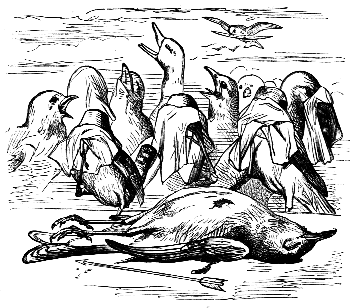 Alas! Poor Cock Robin!
Alas! Poor Cock Robin!
[97]
THE DEATH AND BURIAL OF POOR
COCK ROBIN.
Who killed Cock Robin?
I, said the Sparrow,
With my bow and arrow,
I killed Cock Robin.
This is the Sparrow,
With his bow and arrow.
[98]
Who saw him die?
I, said the Fly,
With my little eye,
I saw him die.
This is the little Fly
Who saw Cock Robin die.
[99]
Who caught his blood?
I, said the Fish,
With my little dish,
I caught his blood.
This is the Fish,
That held the dish.
[100]
Who'll make his shroud?
I, said the Beetle,
With my thread and needle,
I'll make his shroud.
This is the Beetle,
With his thread and needle.
[101]
Who'll dig his grave?
I, said the Owl,
With my spade and show'l,
I'll dig his grave.
This is the Owl,
With his spade and show'l.
[102]
Who'll be the Parson?
I, said the Rook,
With my little book,
I'll be the Parson.
This is the Rook,
Reading his book.
[103]
Who'll be the Clerk?
I, said the Lark,
If it's not in the dark,
I'll be the Clerk.
This is the Lark,
Saying "Amen" like a clerk.
[104]
Who'll carry him to the grave?
I, said the Kite,
If it's not in the night,
I'll carry him to the grave.
This is the Kite,
About to take flight.
[105]
Who'll carry the link?
I, said the Linnet,
I'll fetch it in a minute,
I'll carry the link.
This is the Linnet,
And a link with fire in it.
[106]
Who'll be chief mourner?
I, said the Dove,
For I mourn for my love,
I'll be chief mourner.
This is the Dove,
Who Cock Robin did love.
[107]
Who'll sing a psalm?
I, said the Thrush,
As she sat in a bush,
I'll sing a psalm.
This is the Thrush,
Singing psalms from a bush.
[108]
Who'll toll the bell?
I, said the Bull,
Because I can pull;
So, Cock Robin, farewell!
This is the Bull
Who the bell-rope did pull.
[109]
[110]
All the birds of the air
Fell a-sighing and sobbing,
When they heard the bell toll
For Poor Cock Robin.
[111]
FREDDIE AND THE CHERRY-TREE.
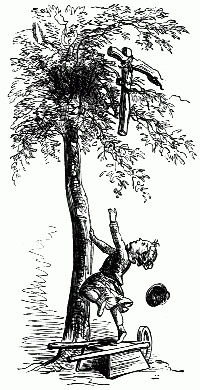
|
REDDIE saw some fine ripe cherries
Hanging on a cherry-tree,
And he said, "You pretty cherries,
Will you not come down to me?"
"Thank you kindly," said a cherry,
"We would rather stay up here;
If we ventured down this morning,
You would eat us up, I fear."
One, the finest of the cherries,
Dangled from a slender twig;
"You are beautiful," said Freddie,
"Red and ripe, and oh, how big!"
"Catch me," said the cherry, "catch me,
Little master, if you can."
"I would catch you soon," said Freddie,
"If I were a grown-up man."
Freddie jumped, and tried to reach it,
Standing high upon his toes;
But the cherry bobbed about,
And laughed, and tickled Freddie's nose.
|
[112]
[Transcriber's Note: You can play this music (MIDI file) by clicking here.]
Simple Simon met a pieman,
Going to the fair;
Says Simple Simon to the pieman,
"Let me taste your ware."
Says the pieman to Simple Simon,
"Show me first your penny."
Says Simple Simon to the pieman,
"Indeed I have not any."
He went to catch a dickey-bird,
And thought he could not fail,
Because he'd got a little salt
To put upon his tail.
[113]
He went to take a bird's nest,
Was built upon a bough:
A branch gave way, and Simon fell
Into a dirty slough.
[114]
He went to shoot a wild duck,
But wild duck flew away;
Says Simon, "I can't hit him,
Because he will not stay."
Simple Simon went a-hunting,
[115]For to catch a hare,
He rode an ass about the streets,
But couldn't find one there.
Simple Simon went a-fishing
For to catch a whale;
All the water he had got
Was in his mother's pail.
He went for to eat honey
Out of the mustard-pot,
He bit his tongue until he cried,
That was all the good he got.
He went to ride a spotted cow,
That had a little calf,
She threw him down upon the ground,
Which made the people laugh.
Once Simon made a great snowball,
And brought it in to roast;
He laid it down before the fire,
And soon the ball was lost.
He went to slide upon the ice,
Before the ice would bear;
Then he plunged in above his knees,
Which made poor Simon stare.
[116]
He washed himself with blacking-ball,
Because he had no soap;
Then said unto his mother,
"I'm a beauty now, I hope."
Simple Simon went to look
If plums grew on a thistle;
He pricked his fingers very much,
Which made poor Simon whistle.
[117]
He went for water in a sieve,
But soon it all ran through;
And now poor Simple Simon
Bids you all adieu.
[118]
Willy boy, Willy boy, where are you going?
I will go with you, if I may.
I am going to the meadows, to see them mowing,
I am going to see them make the hay.
Away, Birds, away!
Take a little, and leave a little,
And do not come again;
For if you do,
I will shoot you through,
And then there will be an end of you.
[119]
I had a little dog, they called him Buff,
I sent him to the shop for a hap'orth of snuff;
But he lost the bag, and spilt the snuff,
So take that cuff, and that's enough.
The Cock doth crow
To let you know,
If you be wise,
'T is time to rise.
Jack Sprat
Had a cat,
It had but one ear,
It went to buy butter,
When butter was dear.
The King of France went up the hill,
With twenty thousand men,
The King of France came down the hill,
And ne'er went up again.
[120]
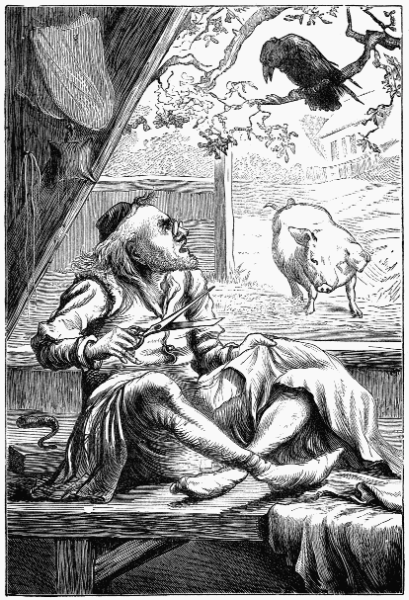 "A CARRION CROW."
"A CARRION CROW."
[121]
A carrion crow sat on an oak,
Fol de riddle, lol de riddle, hi ding do,
Watching a tailor shape his coat;
Sing he, sing ho, the old carrion crow,
[122]Fol de riddle, lol de riddle, hi ding do!
Wife, bring me my old bent bow,
Fol de riddle, lol de riddle, hi ding do,
That I may shoot yon carrion crow;
Sing he, sing ho, the old carrion crow,
Fol de riddle, lol de riddle, hi ding do!
The tailor shot, and he missed his mark,
Fol de riddle, lol de riddle, hi ding do,
And shot the miller's sow right through the heart;
Sing he, sing ho, the old carrion crow,
Fol de riddle, lol de riddle, hi ding do!
Wife! oh wife! bring brandy in a spoon,
Fol de riddle, lol de riddle, hi ding do,
For the old miller's sow is in a swoon;
Sing he, sing ho, the old carrion crow,
Fol de riddle, lol de riddle, hi ding do!
Mary had a pretty bird,
Feathers bright and yellow,
Slender legs—upon my word,
He was a pretty fellow.
The sweetest notes he always sung,
Which much delighted Mary,
And near the cage she'd ever sit,
To hear her own canary.
[123]
Little Blue Betty lived in a lane,
She sold good ale to gentlemen:
Gentlemen came every day,
And Little Blue Betty hopped away;
She hopped upstairs to make her bed,
And she tumbled down, and broke her head.
[A CANDLE.]
Little Nancy Etticote,
In a white petticoat,
With a red nose;
The longer she stands,
The shorter she grows.
[124]
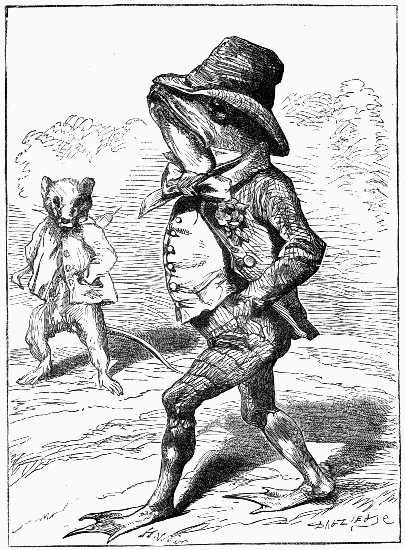 "A FROG HE WOULD A-WOOING GO."
"A FROG HE WOULD A-WOOING GO."
[125]
A FROG HE WOULD A-WOOING GO.
A Frog he would a-wooing go,
Heigho, says Rowley,
Whether his mother would let him or no.
With a rowley powley, gammon and spinach,
Heigho, says Anthony Rowley!
So off he set with his opera hat,
Heigho, says Rowley,
And on the road he met with a rat.
With a rowley powley, &c.
"Pray, Mr. Rat, will you go with me,
Heigho, says Rowley,
Kind Mrs. Mousey for to see?"
With a rowley powley, &c.
When they came to the door of Mousey's hall,
Heigho, says Rowley,
They gave a loud knock, and they gave a loud call.
With a rowley powley, &c.
"Pray, Mrs. Mouse, are you within?"
Heigho, says Rowley,
"Oh, yes, kind sirs, I'm sitting to spin."
With a rowley powley, &c.
[126]
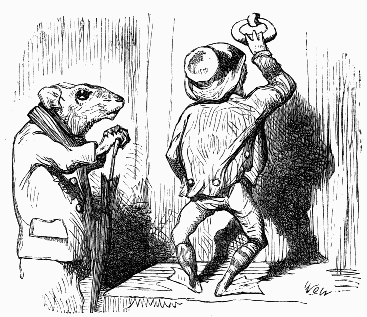
"Pray, Mrs. Mouse, will you give us some beer?
Heigho, says Rowley,
For Froggy and I are fond of good cheer."
With a rowley powley, &c.
"Pray, Mr. Frog, will you give us a song?
Heigho, says Rowley,
But let it be something that's not very long."
With a rowley powley, &c.
"Indeed, Mrs. Mouse," replied the Frog,
[127]Heigho, says Rowley,
"A cold has made me as hoarse as a hog."
With a rowley powley, &c.
"Since you have caught cold, Mr. Frog," Mousey said,
Heigho, says Rowley,
"I'll sing you a song that I have just made."
With a rowley powley, &c.
But while they were all a merry-making,
Heigho, says Rowley,
A cat and her kittens came tumbling in.
With a rowley powley, &c.
The cat she seized the rat by the crown;
Heigho, says Rowley,
The kittens they pulled the little mouse down.
With a rowley powley, &c.
This put Mr. Frog in a terrible fright;
Heigho, says Rowley.
He took up his hat, and he wished them good night.
With a rowley powley, &c.
But as Froggy was crossing over a brook,
Heigho, says Rowley,
A lily-white duck came and gobbled him up.
With a rowley powley, &c.
[128]
So there was an end of one, two, and three,
Heigho, says Rowley,
The Rat, the Mouse, and the little Frog-gee!
With a rowley powley, gammon and spinach,
Heigho, says Anthony Rowley!
[129]
I SAW A SHIP A-SAILING.
I saw a ship a-sailing,
A-sailing on the sea;
And, oh! it was all laden
With pretty things for thee!
There were comfits in the cabin,
And apples in the hold;
The sails were made of silk,
And the masts were made of gold.
The four and twenty sailors
That stood between the decks,
Were four and twenty white mice,
With chains about their necks.
The captain was a duck,
With a packet on his back;
And when the ship began to move,
The captain said, "Quack! quack!"
[130]
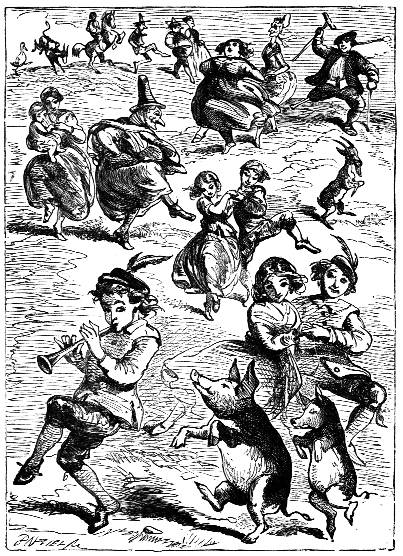 "AS SOON AS HE PLAY'D THEY BEGAN FOR TO DANCE."
"AS SOON AS HE PLAY'D THEY BEGAN FOR TO DANCE."
[131]
[Transcriber's Note: You can play the music on the next three pages (MIDI file) by clicking here.]
Tom, Tom, was a pi per's son,
He learn'd to play when he was young;
But the only tune that he could play,
Was "Over the hills and far away."
Tom with his pipe made such a noise,
That he pleased both the girls and boys;
They'd dance and skip while he did play,
"Over the hills and far away."
[132]
Tom with his pipe did play with such skill,
That those who heard him could never keep still;
As soon as he play'd they began for to dance,
Even pigs on their hind-legs would after him prance.
He met Old Dame Trot with a basket of Eggs—
He used his pipe and she used her legs;
She danc'd about till her eggs were all broke,
She began for to fret, but he laugh'd at the joke.
And as Dolly was milking her cow one day,
[133]
Tom took out his pipe and began for to play;
So Doll and the cow they danc'd a lilt,
Till the pail fell down and the milk was all spilt.
Tom saw a cross fellow was beating an ass,
Heavy laden with pots, pans, dishes, and glass;
He took out his pipe and he play'd them a tune,
And the poor donkey's load was lighten'd full soon.
[134]
There was an old woman, as I've heard tell,
She went to market her eggs for to sell;
She went to market all on a market day,
And she fell asleep on the King's highway.
There came by a pedlar, whose name was Stout,
He cut her petticoats all round about;
He cut her petticoats up to the knees,
Which made the old woman to shiver and freeze.
When the little old woman first did wake,
She began to shiver and she began to shake;
She began to wonder, and she began to cry,
[135]"Lauk a mercy on me, this can't be I!
But if it be I, as I hope it be,
I've a little dog at home, and he'll know me;
If it be I, he'll wag his little tail,
And if it be not I, he'll loudly bark and wail."
Home went the little woman all in the dark,
Up got the little dog, and he began to bark;
He began to bark, so she began to cry,
"Lauk a mercy on me, this is none of I!"
High diddle ding,
Did you hear the bells ring?
The Parliament soldiers are gone to the King!
Some they did laugh, some they did cry,
To see the Parliament soldiers pass by.
Three wise men of Gotham
Went to sea in a bowl;
If the bowl had been stronger
My story had been longer.
[136]
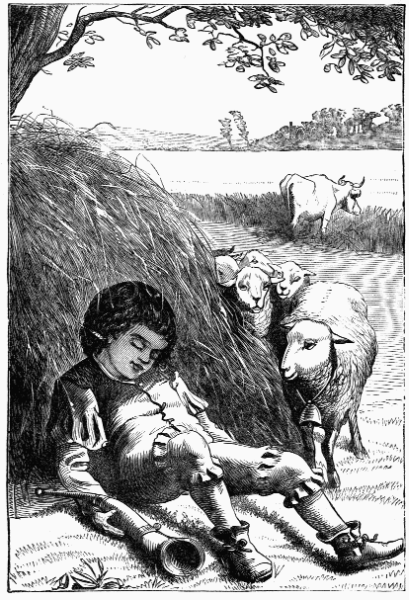 LITTLE BOY BLUE.
LITTLE BOY BLUE.
[137]
Little Boy Blue, come, blow me your horn;
The sheep's in the meadow, the cow's in the corn.
Where's the little boy that looks after the sheep?
He's under the haycock, fast asleep.
[138]
THE ROBIN REDBREASTS.
Two Robin Redbreasts built their nests
Within a hollow tree;
The hen sat quietly at home,
The cock sang merrily;
And all the little young ones said,
"Wee, wee, wee, wee, wee, wee."
One day (the sun was warm and bright,
[139]And shining in the sky),
Cock Robin said, "My little dears,
'T is time you learn to fly;"
And all the little young ones said,
"I'll try, I'll try, I'll try."
I know a child, and
who she is
I'll tell you by-and-by,
When Mamma says, "Do this," or "that,"
She says, "What for?" and "Why?"
She'd be a better child by far
If she would say "I'll try."
There was an old woman
Lived under a hill,
And if she's not gone,
She lives there still.
We are all in the dumps,
For diamonds are trumps,
The kittens are gone to St. Paul's,
The babies are bit,
The moon's in a fit,
And the houses are built without walls.
[140]
As I was going along, long, long,
A-singing a comical song, song, song,
The lane that I went was so long, long, long,
And the song that I sung was so long, long, long,
And so I went singing along.
A-milking, a-milking, my maid,
"Cow, take care of your heels," she said;
"And you shall have some nice new hay,
If you'll quietly let me milk away."
Old father Grey Beard,
Without tooth or tongue,
If you'll give me your finger,
I'll give you my thumb.
[141]
Dance a baby diddit,
What can his mother do with it,
But sit in a lap,
And give him some pap?
Dance a baby diddit.
Snail, snail, come out of your hole,
Or else I'll beat you as black as a coal.
At the siege of Belleisle I was there all the while,
All the while, all the while, at the siege of Belleisle.
Bye, baby bunting,
Father's gone a-hunting,
Mother's gone a-milking,
Sister's gone a-silking,
Brother's gone to buy a skin
To wrap the baby bunting in.
[142]
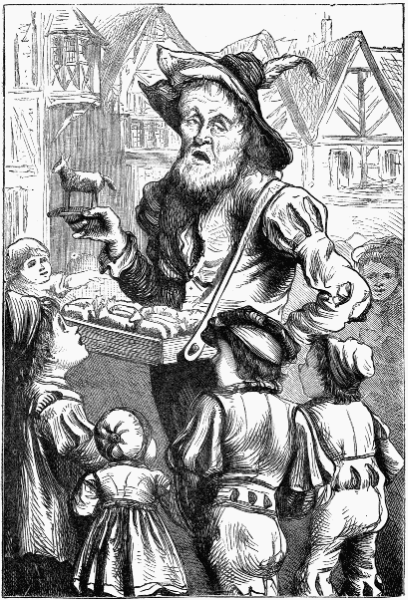 YOUNG LAMBS TO SELL.
YOUNG LAMBS TO SELL.
[143]
Young lambs to sell, young lambs to sell;
If I had as much money as I could tell
I never would cry young lambs to sell,
Young lambs to sell, young lambs to sell,
I never would cry, young lambs to sell.
[144]
Come, let's to bed, says Sleepy-head;
Tarry a while, says Slow;
Put on the pan, says Greedy Nan,
Let's sup before we go.
To make your candles last for aye,
You wives and maids give ear-o!
To put them out's the only way,
Says honest John Boldero.
[145]
THE GREAT BROWN OWL
The Brown Owl sits in the ivy-bush,
And she looketh wondrous wise,
With a horny beak beneath her cowl,
And a pair of large round eyes.
She sat all day on the selfsame spray,
From sunrise till sunset;
And the dim grey light, it was all too bright
For the Owl to see in yet.
"Jenny Owlet, Jenny Owlet," said a merry little bird,
"They say you're wondrous wise;
But I don't think you see, though you're looking at ME
With your large, round, shining eyes."
But night came soon, and the pale white moon
Rolled high up in the skies;
And the great Brown Owl flew away in her cowl,
With her large, round, shining eyes.
[146]
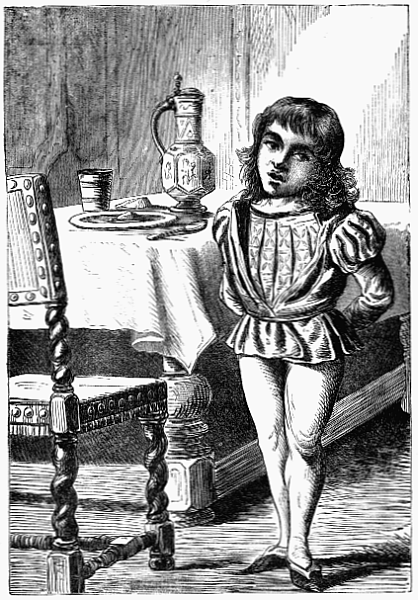 LITTLE TOM TUCKER.
LITTLE TOM TUCKER.
[147]
[Transcriber's Note: You can play this music (MIDI file) by clicking here.]
Little Tom Tucker
Sings for his supper:
What shall he eat?
White bread and butter.
How shall he cut it
Without e'er a knife?
How can he marry
Without e'er a wife?
[148]
Four and twenty tailors went to kill a snail,
The best man amongst them durst not touch her tail.
She put out her horns, like a little Kyloe cow,
Run, tailors, run, or she'll kill you all just now.
Doctor Foster went to Glo'ster,
In a shower of rain;
He stepped in a puddle, up to the middle,
And never went there again.
Mary, Mary, quite contrary,
How does your garden grow?
Silver bells and cockle-shells,
And pretty maids all in a row.
[149]
The man in the moon
Came tumbling down,
And asked the way to Norwich;
He went by the south,
And burnt his mouth
With eating cold pease porridge.
Little Robin Redbreast sat upon a rail,
Niddle, naddle, went his head, wiggle, waddle, went his tail;
Little Robin Redbreast sat upon a bridle,
With a pair of speckle legs, and a green girdle.
Pit, pat, well-a-day!
Little Robin flew away;
Where can little Robin be,
But up in yon cherry-tree?
Ding, dong, darrow,
The cat and the sparrow;
The little dog has burnt his tail,
And he shall be whipped to-morrow.
[150]
DAME DUCK'S LESSONS TO HER
DUCKLINGS.
Old Mother Duck has hatched a brood
Of ducklings, small and callow:
Their little wings are short, their down
Is mottled grey and yellow.
There is a quiet little stream,
That runs into the moat,
Where tall green sedges spread their leaves,
And water-lilies float.
Close by the margin of the brook
[151]The old Duck made her nest,
Of straw, and leaves, and withered grass,
And down from her own breast.
And there she sat for four long weeks,
In rainy days and fine,
Until the Ducklings all came out—
Four, five, six, seven, eight, nine.
One peeped out from beneath her wing,
One scrambled on her back:
"That's very rude," said old Dame Duck,
"Get off! quack, quack, quack, quack!"
"'T is close," said Dame Duck, shoving out
The egg-shells with her bill,
"Besides, it never suits young ducks
To keep them sitting still."
So, rising from her nest, she said,
"Now, children, look at me:
A well-bred duck should waddle so,
From side to side—d'ye see?"
"Yes," said the little ones, and then
She went on to explain:
"A well-bred duck turns in its toes
As I do—try again."
"Yes," said the Ducklings, waddling on.
"That's better," said their mother;
"But well-bred ducks walk in a row,
[152]Straight—one behind another."
"Yes," said the little Ducks again,
All waddling in a row:
"Now to the pond," said old Dame Duck—
Splash, splash! and in they go.
"Let me swim first," said old Dame Duck,
"To this side, now to that;
There, snap at those great brown-winged flies,
They make young ducklings fat.
"Now when you reach the poultry-yard,
The hen-wife, Molly Head,
Will feed you, with the other fowls,
On bran and mashed-up bread;
"The hens will peck and fight, but mind,
I hope that all of you
Will gobble up the food as fast
As well-bred ducks should do.
"You'd better get into the dish,
Unless it is too small;
In that case, I should use my foot,
And overturn it all."
The Ducklings did as they were bid,
And found the plan so good,
That, from that day, the other fowls
Got hardly any food.
[153]
Is John Smith within?
Yes, that he is.
Can he set a shoe?
Ay, marry, two.
Here a nail, there a nail,
Tick, tack, too.
John Cook he had a little grey mare,
hee, haw, hum;
Her legs were long and her back was bare,
hee, haw, hum.
John Cook was riding up Shooter's Bank,
hee, haw, hum;
The mare she began to kick and to prank,
hee, haw, hum.
John Cook was riding up Shooter's Hill,
hee, haw, hum;
His mare fell down and made her will,
hee, haw, hum.
The bridle and saddle were laid on the shelf,
hee, haw, hum;
If you want any more, you may sing it yourself,
hee, haw, hum.
[154]
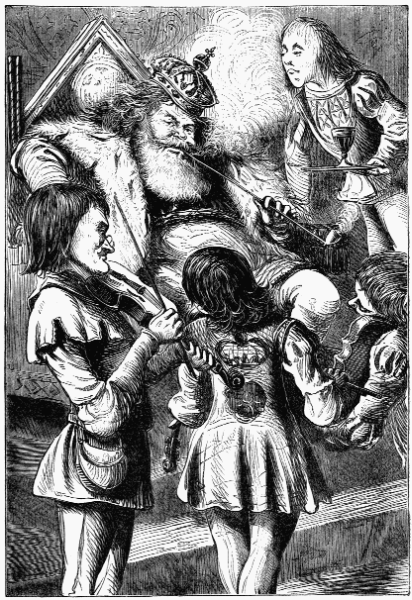 OLD KING COLE.
OLD KING COLE.
[155]
Old King Cole
Was a merry old soul,
And a merry old soul was he;
And he called for his pipe
And he called for his glass,
And he called for his fiddlers three!
[156]
[157]
[158]
[159]
[160]
[161]
[162]
[163]
[164]
[165]
[166]
X Y Z &
Amperse-and,
All wished for
A piece in hand.
[167]
[168]
Pussy sits beside the fire. How can she be fair?
In walks a little doggy,—Pussy, are you there?
Oh, the rusty, dusty, rusty miller,
I'll not change my wife for gold or siller.
[169]
There was a crooked man, and he went a crooked mile,
And he found a crooked sixpence against a crooked stile;
He bought a crooked cat, which caught a crooked mouse,
And they all lived together in a little crooked house.
High diddle doubt, my candle's out,
My little maid is not at home;
Saddle my hog and bridle my dog,
And fetch my little maid home.
[170]
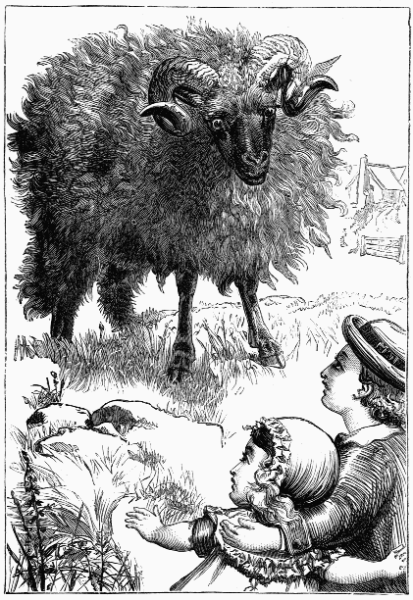 BAA, BAA, BLACK SHEEP
BAA, BAA, BLACK SHEEP
[171]
[Transcriber's Note: You can play this music (MIDI file) by clicking here.]
Baa, baa, black sheep, have you any wool?
Yes, sir, yes, sir, three bags full:
One for my master, one for my dame,
And one for the little boy that lives in our lane.
Baa, baa, black sheep, have you any wool?
Yes, sir, yes, sir, three bags full.
[172]
Barber, barber, shave a pig.
How many hairs will make a wig?
Four and twenty; that's enough.
Give the poor barber a pinch of snuff.
The Lion and the Unicorn were fighting for the crown,
The Lion beat the Unicorn all round about the town.
Some gave them white bread, some gave them brown,
Some gave them plum-cake, and sent them out of town.
Thomas a Tattamus took two T's
To tie two tups to two tall trees,
To frighten the terrible Thomas a Tattamus.
Tell me how many T's there are in all THAT.
[173]
Bessy Bell and Mary Gray,
They were two bonny lasses,
They built a house upon the lea,
And covered it o'er with rashes.
Bessy kept the garden gate,
And Mary kept the pantry;
Bessy always had to wait,
While Mary lived in plenty.
Little boy, pretty boy, where were you born?
In Lincolnshire, master; come, blow the cow's horn.
[174]
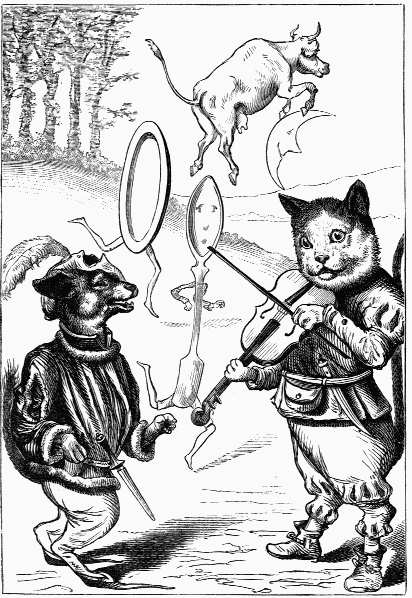 HEY, DIDDLE, DIDDLE.
HEY, DIDDLE, DIDDLE.
[175]
Hey, diddle, diddle, the cat and the fiddle
The cow jumped over the moon;
The little dog laughed to see such sport,
And the dish ran after the spoon.
[176]
THE YOUNG LINNETS.
Did you ever see the nest
Of Chaffinch or of Linnet,
When the little downy birds
Are lying snugly in it,
Gaping wide their yellow mouths
For something nice to eat?
Caterpillar, worm, and grub,
They reckon dainty meat.
When the mother-bird returns,
[177]And finds them still and good,
She will give them each, by turns,
A proper share of food.
She has hopped from spray to spray,
And peeped with knowing eye
Into all the folded leaves
Where caterpillars lie.
She has searched among the grass,
And flown from tree to tree,
Catching gnats and flies, to feed
Her little family.
I have seen the Linnets chirp,
And shake their downy wings:
They are pleased to see her come,
And pleased with what she brings.
But I never saw them look
Impatient for their food:
Somebody, at dinner-time,
Is seldom quite so good.
[178]
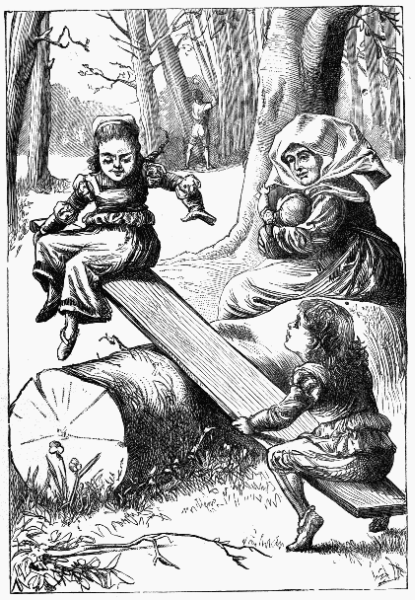 SEE-SAW, MARGERY DAW.
SEE-SAW, MARGERY DAW.
[179]
See-saw, Margery Daw,
Jenny shall have a new master;
She shall have but a penny a day,
Because she can't work any faster.
[180]
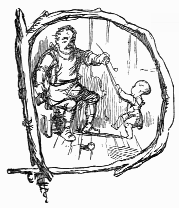
| ANCE to your daddy,
My little babby;
Dance to your daddy,
My little lamb.
You shall have a fishy,
In a little dishy;
You shall have a fishy,
When the boat comes in.
|
Queen Anne, Queen Anne, she sits in the sun,
As fair as the lily, as white as the swan:
I send you three letters, so pray you read one.
I cannot read one unless I read all;
So pray, Master Teddy, deliver the ball.
Little girl, little girl, where have you been?
Gathering roses to give to the Queen.
Little girl, little girl, what gave she you?
She gave me a diamond as big as my shoe.
[181]
There was an old woman tossed up in a basket,
Ninety times as high as the moon;
And where she was going, I couldn't but ask it,
For in her hand she carried a broom.
Old woman, old woman, old woman, quoth I,
O whither, O whither, O whither so high?
To sweep the cobwebs off the sky!
Shall I go with you? Ay, by-and-by.
[182]
When I was a bachelor, I lived by myself,
And all the meat I got I put upon a shelf;
The rats and the mice did lead me such a life,
That I went to London, to get myself a wife.
The streets were so broad, and the lanes were so narrow,
I could not get my wife home without a wheelbarrow,
The wheelbarrow broke, my wife got a fall,
Down tumbled wheelbarrow, little wife, and all.
[183]
Robin and Richard were two pretty men,
They lay in bed till the clock struck ten;
Then up starts Robin and looks in the sky,
"Oh, brother Richard, the sun's very high!
You go on with bottle and bag,
And I'll come after with jolly Jack Nag."
Blow, wind, blow, and go, mill, go,
That the miller may grind his corn;
That the baker may take it,
And into rolls make it,
And bring us some hot in the morn.
Jack be nimble,
Jack be quick,
And Jack jump over the candlestick.
[184]
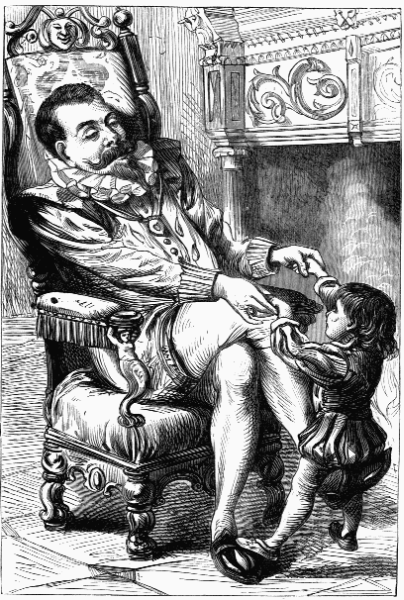 RIDE A COCK-HORSE.
RIDE A COCK-HORSE.
[185]
Ride a cock-horse
To Banbury Cross,
To see a fine lady
Upon a white horse.
Rings on her fingers,
Bells on her toes,
She shall have music
Wherever she goes.
[186]
THE FOX AND THE FARMER.
A Fox jumped up on a moonlight night,
The stars were shining, and all things bright;
"Oh, ho!" said the Fox, "it's a very fine night
For me to go through the town, heigho!"
The Fox when he came to yonder stile,
He lifted his ears, and he listened awhile;
"Oh, ho!" said the Fox, "it's but a short mile
From this unto yonder town, heigho!"
The Fox when he came to the farmer's gate,
Whom should he see but the farmer's Drake;
"I love you well for your master's sake,
[187]And long to be picking your bones, heigho!"
The grey Goose ran right round the haystack.
"Oh, ho!" said the Fox, "you are very fat;
You'll do very well to ride on my back,
From this into yonder town, heigho!"
The farmer's wife she jumped out of bed,
And out of the window she popped her head;
"Oh, husband! oh, husband! the Geese are all dead,
For the Fox has been through the town, heigho!"
The farmer he loaded his pistol with lead,
And shot the old rogue of a Fox through the head;
"Ah, ha!" said the farmer, "I think you're quite dead,
And no more you'll trouble the town, heigho!"
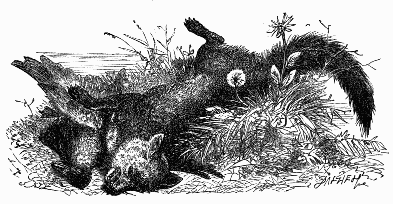
[188]
Pease pudding hot,
Pease pudding cold,
Pease pudding in the pot,
Nine days old.
Some like it hot,
Some like it cold,
Some like it in the pot,
Nine days old.
Curly-locks, Curly-locks, wilt thou be mine?
Thou shalt not wash the dishes, nor yet feed the swine;
But sit on a cushion, and sew a fine seam,
And feed upon strawberries, sugar, and cream.
Margery Mutton-pie, and Johnny Bo-peep,
They met together in Gracechurch Street;
In and out, in and out, over the way,
Oh! says Johnny, 'tis Chop-nose Day.
There was a Rat, for want of stairs,
Went down a rope to say his prayers.
[189]
Snail, snail, come put out your horn,
To-morrow is the day to shear the corn.
If wishes were horses, beggars would ride,
If turnips were watches, I would wear one by my side.
[190]
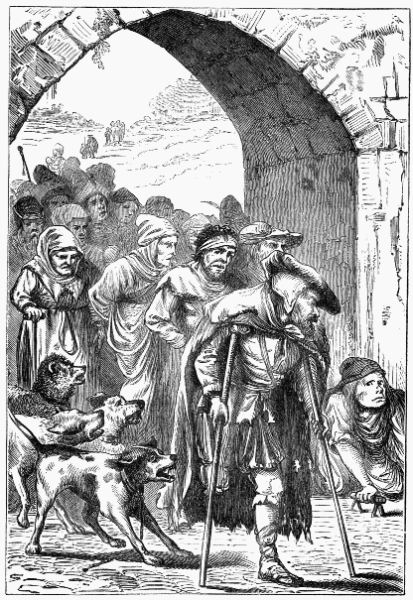 HARK, HARK, THE DOGS DO BARK.
HARK, HARK, THE DOGS DO BARK.
[191]
Hark, hark,
The dogs do bark,
The beggars are coming to town;
Some in jags,
Some in rags,
And some in velvet gown.
One, two, buckle my shoe;
Three, four, shut the door;
Five, six, pick up sticks;
Seven, eight, lay them straight;
Nine, ten, a good fat hen;
Eleven, twelve, dig and delve;
Thirteen, fourteen, maids a-courting;
Fifteen, sixteen, maids in the kitchen;
Seventeen, eighteen, maids in waiting;
Nineteen, twenty, my plate is empty.
[192]
I had a little husband, no bigger than my thumb;
I put him in a pint pot, and there I bid him drum.
I bought a little horse that galloped up and down;
I saddled him, and bridled him, and sent him out of town.
I gave him some garters, to garter up his hose,
And a little pocket-handkerchief to wipe his pretty nose.
I have a little sister; they call her Peep, Peep,
She wades the water, deep, deep, deep;
She climbs the mountains, high, high, high.
Poor little thing! she has but one eye.
[193]
[Transcriber's Note: You can play this music (MIDI file) by clicking here.]
Goosey, goosey, gander, whither shall I wander,
Up stairs, and down stairs, and in my lady's chamber.
There I met an old man, who would not say his prayers,
I took him by his left leg, and threw him down the stairs.
[194]
Handy Spandy, Jack-a-dandy,
Loves plum-cake and sugarcandy;
He brought some at a grocer's shop,
And out he came, hop-hop-hop.
If all the world were water,
And all the water were ink,
What should we do for bread and cheese?
What should we do for drink?
Hey, my kitten, my kitten,
Hey, my kitten, my deary;
Such a sweet pet as this
Was neither far nor neary.
Here we go up, up, up,
Here we go down, down, down;
Here we go backwards and forwards,
And here we go round, round, round.
[195]
I had a little pony;
They called him Dapple-grey.
I lent him to a lady,
To ride a mile away.
She whipped him, she slashed
him,
She rode him through the
mire;
I would not lend my pony now,
For all the lady's hire.
See, see. What shall I see?
A horse's head where his tail should be.
Pussy cat, Pussy cat, where have you been?
I've been to London to look at the Queen.
Pussy cat, Pussy cat, what did you do there?
I frightened a little mouse under the chair.
Little Tommy Tittlemouse
Lived in a little house;
He caught fishes
In other men's ditches.
[196]
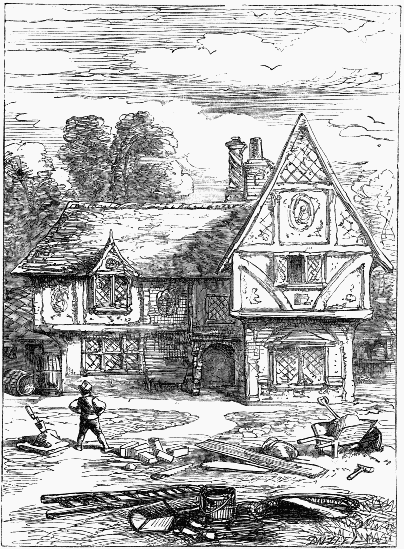 "THIS IS THE HOUSE THAT JACK BUILT."
"THIS IS THE HOUSE THAT JACK BUILT."
[197]
THE HOUSE THAT JACK BUILT.
This is the Malt
That lay in the house that Jack built.
This is the Rat
That ate the malt,
That lay in the house that Jack built.
[198]
This is the Cat,
That killed the rat,
That ate the malt,
That lay in the house that Jack built.
[199]
This is the Dog,
That worried the cat,
That killed the rat,
That ate the malt,
That lay in the house that Jack built.
[200]
This is the Cow with the crumpled horn,
That tossed the dog,
That worried the cat,
That killed the rat,
That ate the malt,
That lay in the house that Jack built.
[201]
This is the Maiden all forlorn,
That milked the cow with the crumpled horn,
That tossed the dog,
That worried the cat,
That killed the rat,
That ate the malt,
That lay in the house that Jack built.
[202]
This is the Man all tattered and torn,
That kissed the maiden all forlorn,
That milked the cow with the crumpled horn,
That tossed the dog, that worried the cat,
That killed the rat, that ate the malt,
That lay in the house that Jack built.
[203]
This is the Priest all shaven and shorn,
That married the man all tattered and torn,
That kissed the maiden all forlorn,
That milked the cow with the crumpled horn,
That tossed the dog, that worried the cat,
That killed the rat, that ate the malt,
That lay in the house that Jack built.
[204]
This is the Cock that crowed in the morn,
That waked the priest all shaven and shorn,
That married the man all tattered and torn,
That kissed the maiden all forlorn,
That milked the cow with the crumpled horn,
That tossed the dog, that worried the cat,
That killed the rat, that ate the malt,
That lay in the house that Jack built.
[205]
This is the
Farmer who sowed the corn,
That kept the cock that crowed in the morn,
That waked the priest all shaven and shorn,
[206]That married the man all tattered and torn,
That kissed the maiden all forlorn,
That milked the cow with the crumpled horn,
That tossed the dog, that worried the cat,
That killed the rat, that ate the malt,
That lay in the house that Jack built.
Old mother Widdle Waddle jumped out of bed,
And out of the casement she popped her head,
Crying, "The house is on fire, the grey goose is dead,
And the fox has come to the town, oh!"
| 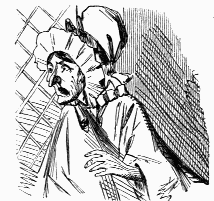
|
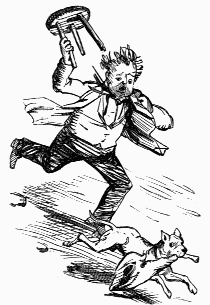
|
Two legs sat upon three legs,
With one leg in his lap;
In comes four legs,
And runs away with one leg;
Up jumps two legs,
Catches up three legs,
Throws it after four legs,
And makes him bring one leg back.
|
[207]
A little boy went into a barn,
And lay down on some hay;
An owl came out and flew about,
And the little boy ran away.
As I was going up Primrose Hill,
Primrose Hill was dirty;
There I met a pretty Miss,
And she dropped me a curtsey.
Little Miss, pretty Miss,
Blessings light upon you;
If I had half-a-crown a day,
I'd spend it all upon you.
[208]
I had a little Hen, the prettiest ever seen,
She washed me the dishes and kept the house clean;
She went to the mill to fetch me some flour,
She brought it home in less than an hour;
She baked me my bread, she brewed me my ale,
She sat by the fire and told many a fine tale.
[209]
There was a little man, and he had a little gun,
And his bullets were made of lead, lead, lead;
He shot Johnny King through the middle of his wig,
And knocked it right off his head, head, head.
Three straws on a staff,
Would make a baby cry and laugh.
Multiplication is vexation,
Division is as bad;
The Rule of Three perplexes me,
And Practice drives me mad.
Daffy-down-Dilly has come up to town,
In a yellow petticoat and a green gown.
[210]
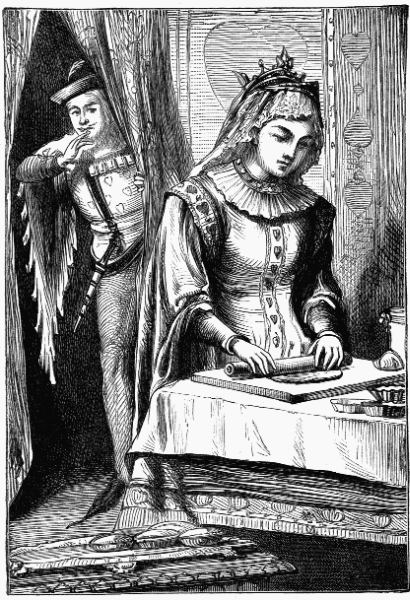 THE QUEEN OF HEARTS.
THE QUEEN OF HEARTS.
[211]
The Queen of Hearts
She made some tarts
All on a summer's day;
The Knave of Hearts
He stole those tarts,
And took them clean away.
The King of Hearts
Called for the tarts,
And beat the Knave full sore;
The Knave of Hearts
Brought back the tarts,
And vowed he'd steal no more.
There were three crows sat on a stone,
Fal la, la la lal de,
Two flew away, and then there was one,
Fal la, la la lal de,
The other crow finding himself alone,
Fal la, la la lal de,
He flew away, and then there was none,
Fal la, la la lal de.
[212]
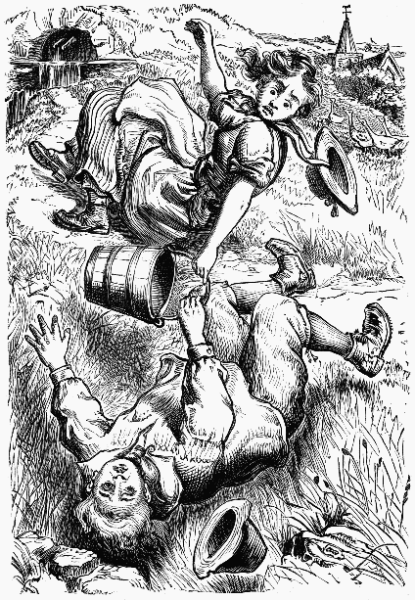 "JACK AND JILL WENT UP THE HILL."
"JACK AND JILL WENT UP THE HILL."
[213]
[Transcriber's Note: You can play this music (MIDI file) by clicking here.]
1. Jack and Jill went up the hill
To fetch a pail of water;
Jack fell down and broke his crown,
And Jill came tumbling after.
2. Up Jack got, and home did trot,
As fast as he could caper;
Dame Jill had the job to plaister his knob,
With vinegar and brown paper.
3. Jill came in and she did grin
To see his paper plaister,
Mother vex'd did whip her next,
For causing Jack's disaster.
[214]
When the wind is in the East,
'Tis neither good for man nor beast;
When the wind is in the North,
The skilful fisher goes not forth;
When the wind is in the South,
It blows the bait in the fishes' mouth;
When the wind is in the West,
Then 'tis at the very best.
Cry, baby, cry,
Put your finger in your eye,
And tell your mother it wasn't I.
[215]
THE TURTLE-DOVE'S NEST.
Very high in the pine-tree,
The little Turtle-dove
Made a pretty little nursery,
To please her little love.
She was gentle, she was soft,
And her large dark eye
Often turned to her mate,
Who was sitting close by.
"Coo," said the Turtle-dove,
"Coo," said she;
"Oh, I love thee," said the Turtle-dove.
[216]"And I love THEE."
In the long shady branches
Of the dark pine-tree,
How happy were the Doves
In their little nursery!
The young Turtle-doves
Never quarrelled in the nest;
For they dearly loved each other,
Though they loved their mother best.
"Coo," said the little Doves.
"Coo," said she.
And they played together kindly
In the dark pine-tree.
In this nursery of yours,
Little sister, little brother,
Like the Turtle-dove's nest—
Do you love one another?
Are you kind, are you gentle,
As children ought to be?
Then the happiest of nests
Is your own nursery.
[217]
Peter White
Will ne'er go right,
Would you know the reason why?
He follows his nose
Wherever he goes,
And that stands all awry.
He that would thrive,
Must rise at five;
He that hath thriven,
May lie till seven;
And he that by the plough would thrive,
Himself must either hold or drive.
Hush-a-bye, baby,
Daddy is near;
Mamma is a lady,
And that's very clear.
[218]
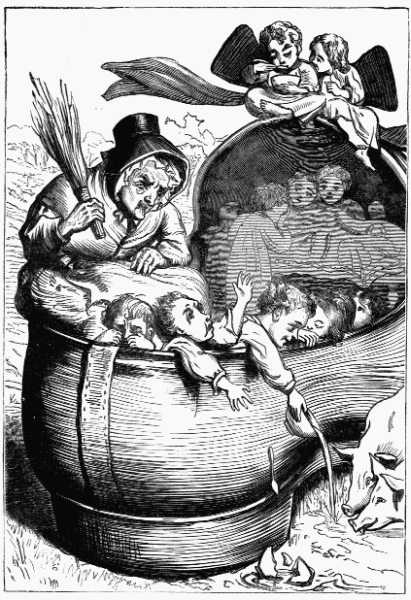 "THERE WAS AN OLD WOMAN WHO LIVED IN A SHOE."
"THERE WAS AN OLD WOMAN WHO LIVED IN A SHOE."
[219]
There was an old woman who lived in a shoe,
She had so many children she didn't know what to do
She gave them some broth, without any bread,
She whipped them all round, and sent them to bed.
One, two, three,
I love coffee,
And Billy loves tea,
How good you be.
One, two, three,
I love coffee,
And Billy loves tea.
[220]
There was an old woman called Nothing-at-all,
Who lived in a dwelling exceedingly small;
A man stretched his mouth to its utmost extent,
And down at one gulp house and old woman went.
[221]
I had a little hobby horse,
And it was dapple grey,
Its head was made of pea-straw,
Its tail was made of hay.
I sold it to an old woman
For a copper groat;
And I'll not sing my song again
Without a new coat.
Eggs, butter, cheese, bread,
Stick, stock, stone, dead,
Stick him up, stick him down,
Stick him in the old man's crown.
[222]
THE FROG'S CHORUS.
"Yaup, yaup, yaup!"
Said the croaking voice of a Frog:
"A rainy day
In the month of May,
And plenty of room in the bog."
"Yaup, yaup, yaup!"
Said the Frog as it hopped away:
"The insects feed
On the floating weed,
And I'm hungry for dinner to-day."
"Yaup, yaup, yaup!"
Said the Frog, as it splashed about:
"Good neighbours all,
When you hear me call,
It is odd that you do not come out."
"Yaup, yaup, yaup!"
Said the Frogs; "it is charming weather;
We'll come and sup,
When the moon is up,
And we'll all of us croak together."
[223]
What's the news of the day,
Good neighbour, I pray?
They say the balloon
Is gone up to the moon.
Cross-Patch,
Draw the latch,
Sit by the fire and spin;
Take a cup,
And drink it up,
And call your neighbours in.
There was an old Crow
Sat upon a clod.
There's an end of my song,
That's very odd.
[224]
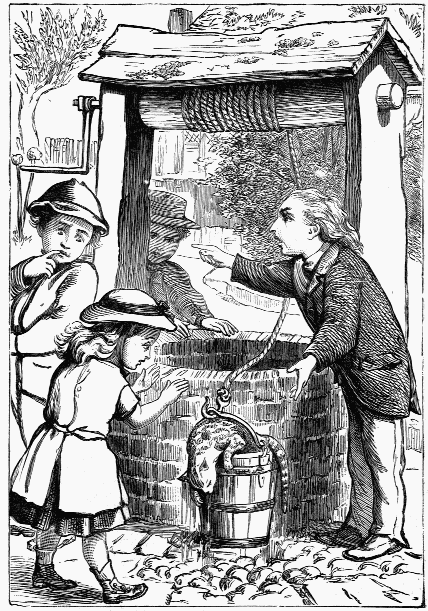 "DING, DONG, BELL."
"DING, DONG, BELL."
[225]
Ding, dong, bell, Pussy's in the well.
Who put her in? Little Tommy Green.
Who pulled her out? Little Tommy Trout.
What a naughty boy was that,
Thus to drown poor Pussy Cat.
[226]
NURSERY RHYME ALPHABET.
A was the Archer who shot at a frog.
B was Bo-peep, with her crook and her dog.
C was the Cow that jumped over the moon.
D was the Dish that ran off with the spoon.
E was Elizabeth, Betsey, and Bess.
F was the Forest where stood the bird's-nest.
G Gaffer Longlegs; downstairs he'd a fall.
H Humpty Dumpty that sat on the wall.
I was that "
I" who was going to St. Ives.
J Jacky Horner, on plum-pie he thrives.
K was King Cole with his fiddlers three.
L Little Gold-Hair, peeping, you see.
M Mother Hubbard who thought her dog dead.
[227]N Little Netticoat, with a red head.
O the old Woman "upon market day;"
P was the "Pedlar" who passed by that way.
Q was the Queen of Hearts, tartlets she makes.
R was Red Riding Hood carrying the cakes.
S Simple Simon, the pieman beside.
T Tommy Tucker, for supper who cried.
U was the Unicorn, "beat round the town;"
V was Victoria—
she fought for her crown.
W Whittington, who turned again,
Over great London as Lord Mayor to reign.
X is a letter that here we can spare.
Y "Yankee Doodle," that went to the fair;
Z is the Zany who laughed at him there.

[228]
Swan, swan, over the sea;
Swim, swan, swim.
Swan, swan, back again;
Well, swan, swam.
One misty moisty morning,
When cloudy was the weather,
I met a little old man,
Clothed all in leather,
Clothed all in leather,
With a strap below his chin.
How do you do? and how do you do?
And how do you do again?
Deedle, deedle, dumpling, my son John,
He went to bed with his stockings on;
One shoe off, and one shoe on,
Deedle, deedle, dumpling, my son John.
[229]
The old woman must stand at the tub, tub, tub,
The dirty clothes to rub, rub, rub;
But when they are clean, and fit to be seen,
I'll dress like a lady, and dance on the green.
[230]
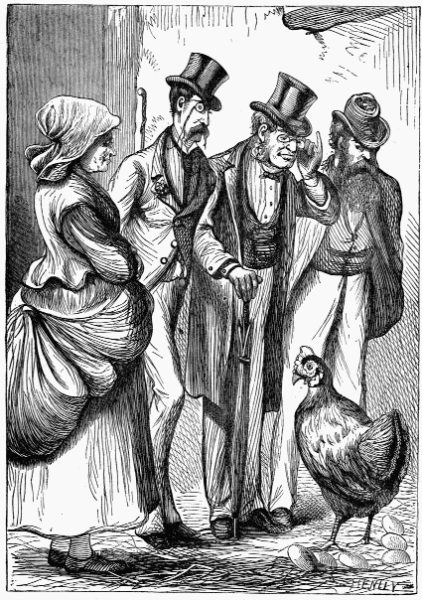 "HICKETY, PICKETY, MY BLACK HEN."
"HICKETY, PICKETY, MY BLACK HEN."
[231]
Hickety, pickety, my black hen,
She lays eggs for gentlemen;
Gentlemen come every day
To see what my black hen doth lay.
I'll tell you a story,
About John-a-Nory:
And now my story's begun.
I'll tell you another,
About Jack and his brother:
And now my story's done.
[232]
I LOVE SIXPENCE.
I love sixpence, pretty little sixpence,
I love sixpence better than my life;
I spent a penny of it, I spent another,
And took fourpence home to my wife.
Oh, my little fourpence, pretty little fourpence,
I love fourpence better than my life;
I spent a penny of it, I spent another,
And I took twopence home to my wife.
Oh, my little twopence, my pretty little twopence,
I love twopence better than my life;
I spent a penny of it, I spent another,
And I took nothing home to my wife.
Oh, my little nothing, my pretty little nothing,
What will nothing buy for my wife?
I have nothing, I spend nothing,
I love nothing better than my wife.
[233]
There was a fat man of Bombay,
Who was smoking one sunshiny day,
When a bird called a Snipe flew away with his pipe,
Which vexed the fat man of Bombay.
[234]
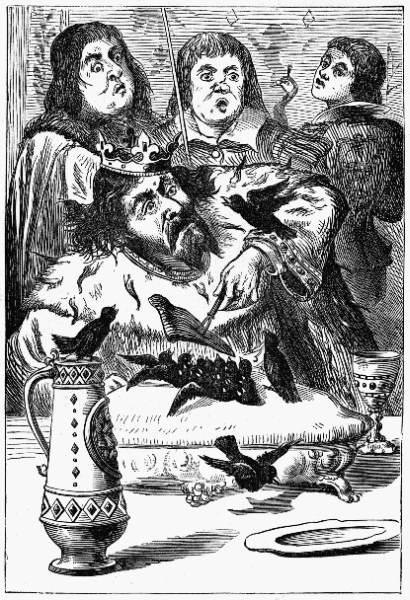 "WHEN THE PIE WAS OPENED, THE BIRDS BEGAN TO SING."
"WHEN THE PIE WAS OPENED, THE BIRDS BEGAN TO SING."
[235]
[Transcriber's Note: You can play this music (MIDI file) by clicking here.]
Sing a song of sixpence,
A bag full of rye;
Four and twenty blackbirds;
Baked in a pie;
When the pie was open'd,
The birds began to sing,
Was not that a dainty dish
To set before the king?
[236]
The King was in his counting-house,
Counting out his money;
[237]
The Queen was in the parlour,
Eating bread and honey;
[238]
The maid was in the garden,
Hanging out the clothes;
By came a little bird,
And snapt off her nose.
[239]
Little Polly Flinders
Sate among the cinders
Warming her pretty little toes!
Her mother came and caught her,
And whipped her little daughter,
For spoiling her nice new clothes.
Great A, little a,
Bouncing B,
The cat's in the cupboard,
And she can't see.
[240]
Poor old Robinson Crusoe! poor old Robinson Crusoe!
They made him a coat of an old Nanny goat,
I wonder how they could do so!
With a ring-a-ting-tang, and a ring-a-ting-tang,
Poor old Robinson Crusoe!
[241]
Bat, bat, come under my hat,
And I'll give you a slice of bacon,
And when I bake I'll give you a cake,
If I am not mistaken.
The North Wind doth blow,
And we shall have snow,
And what will poor Robin do then?
Poor thing!
He will hop to a barn,
And to keep himself warm,
Will hide his head under his wing,
Poor thing!
[242]
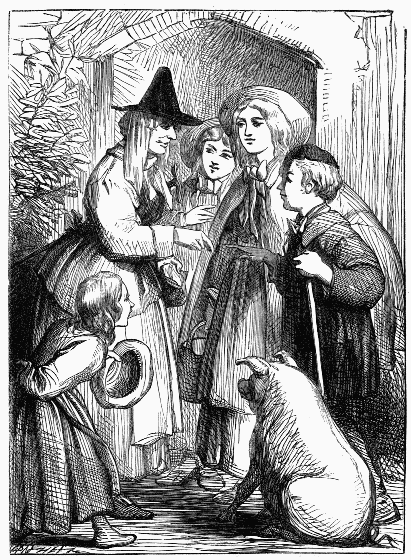 THE OLD WOMAN BUYING HER PIG AT MARKET.
THE OLD WOMAN BUYING HER PIG AT MARKET.
[243]
THE OLD WOMAN AND HER PIG.
An old woman was sweeping her house, and she found a
little crooked sixpence. "What," said she, "shall I do with
this little sixpence? I will go to market, and buy a little
pig." As she was coming home, she came to a stile: the
piggy would not go over the stile.
She went a little farther, and she met a dog. So she said
to the dog[244]—
"Dog, dog, bite pig;
Piggy won't get over the stile;
And I shan't get home to-night."
But the dog would not.
She went a little farther, and she met a stick. So she
said—
"Stick, stick, beat dog;
Dog won't bite pig;
Piggy won't get over the stile,
And I shan't get home to-night."
But the stick would not.
She went a little farther, and she met a fire. So she
said—
"Fire, fire, burn stick;
Stick won't beat dog;
Dog won't bite pig;
Piggy won't get over the stile;
And I shan't get home to-night."
But the fire would not.
She went a little farther, and she met some water. So
she said[245]—
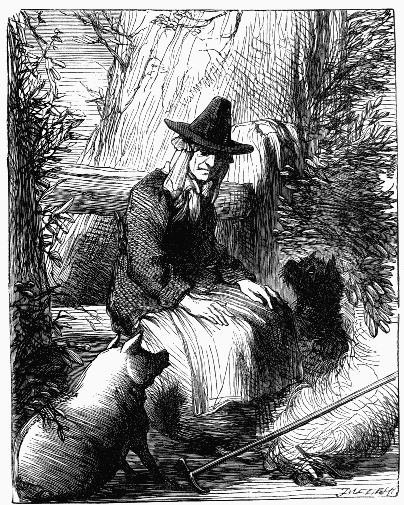 "FIRE, FIRE, BURN STICK."
"FIRE, FIRE, BURN STICK."
"Water, water, quench fire;
[246]Fire won't burn stick;
Stick won't beat dog;
Dog won't bite pig;
Piggy won't get over the stile;
And I shan't get home to-night."
But the water would not.
She went a little farther, and she met an ox. So she
said—
"Ox, ox, drink water;
Water won't quench fire;
Fire won't burn stick;
Stick won't beat dog;
Dog won't bite pig;
Piggy won't get over the stile;
And I shan't get home to-night."
But the ox would not.
She went a little farther, and she met a butcher. So she
said—
"Butcher, butcher, kill ox;
Ox won't drink water;
Water won't quench fire;
Fire won't burn stick;
[247]
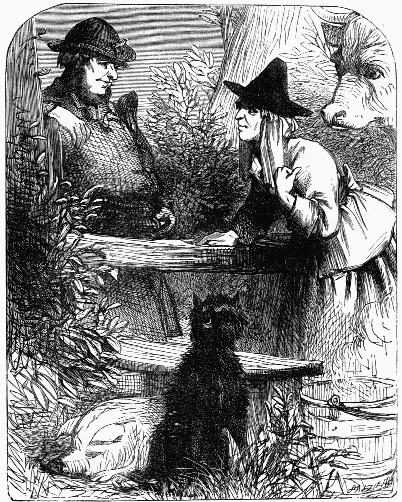 "BUTCHER, BUTCHER, KILL OX."
"BUTCHER, BUTCHER, KILL OX."
Stick won't beat dog;
[248]Dog won't bite pig;
Piggy won't get over the stile;
And I shan't get home to-night."
But the butcher would not.
She went a little farther, and she met a rope. So she
said—
"Rope, rope, hang butcher;
Butcher won't kill ox;
Ox won't drink water;
Water won't quench fire;
Fire won't burn stick;
Stick won't beat dog;
Dog won't bite pig;
Piggy won't get over the stile;
And I shan't get home to-night."
But the rope would not.
She went a little farther, and she met a rat. So she
said—
"Rat, rat, gnaw rope;
Rope won't hang butcher;
Butcher won't kill ox;
Ox won't drink water;
[249]
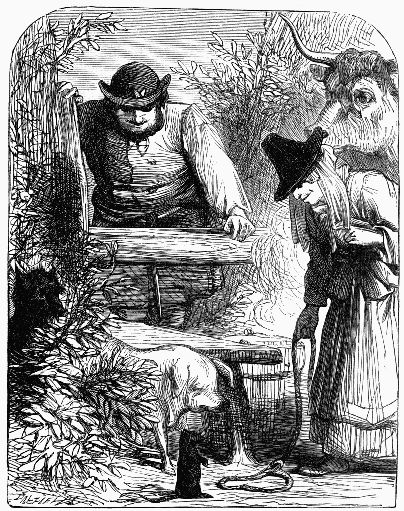 "RAT, RAT, GNAW ROPE."
"RAT, RAT, GNAW ROPE."
Water won't quench fire;
[250]Fire won't burn stick;
Stick won't beat dog;
Dog won't bite pig;
Piggy won't get over the stile;
And I shan't get home to-night."
But the rat would not.
She went a little farther, and she met a cat. So shep
said—
"Cat, cat, kill rat;
Rat won't gnaw rope;
Rope won't hang butcher;
Butcher won't kill ox;
Ox won't drink water;
Water won't quench fire;
Fire won't burn stick;
Stick won't beat dog;
Dog won't bite pig;
Piggy won't get over the stile;
And I shan't get home to-night."
But the cat said to her, "If you will go to yonder cow,
and fetch me a saucer of milk, I will kill the rat." So away
went the old woman to the cow, and said[251]—
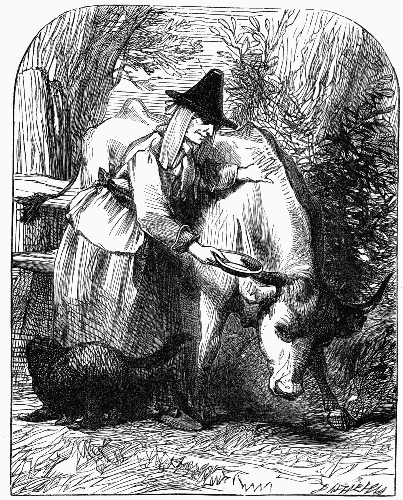 "COW, COW, GIVE ME A SAUCER OF MILK."
"COW, COW, GIVE ME A SAUCER OF MILK."
"Cow, cow, give me a saucer of milk;
[252]Cat won't kill rat;
Rat won't gnaw rope;
Rope won't hang butcher;
Butcher won't kill ox;
Ox won't drink water;
Water won't quench fire;
Fire won't burn stick;
Stick won't beat dog;
Dog won't bite pig;
Piggy won't get over the stile;
And I shan't get home to-night."
But the cow said to her, "If you will go to yonder haymakers,
and fetch me a wisp of hay, I'll give you the milk."
So away the old woman went to the haymakers, and said—
"Haymakers, give me a wisp of hay;
Cow won't give me milk;
Cat won't kill rat;
Rat won't gnaw rope;
Rope won't hang butcher;
Butcher won't kill ox;
Ox won't drink water;
Water won't quench fire;
[253]
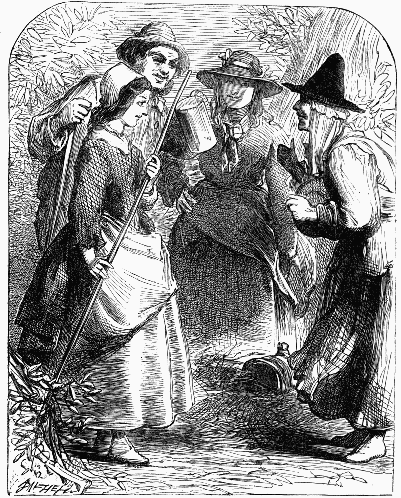 "HAYMAKERS, GIVE ME A WISP OF HAY."
"HAYMAKERS, GIVE ME A WISP OF HAY."
Fire won't burn stick;
Stick won't beat dog;
[254]Dog won't bite pig;
Piggy won't get over the stile;
And I shan't get home to-night."
But the haymakers said to her,—"If you will go to yonder
stream, and fetch us a bucket of water, we'll give you
the hay." So away the old woman went; but when she got
to the stream, she found the bucket was full of holes. So
she covered the bottom with pebbles, and then filled the
bucket with water, and away she went back with it to the
haymakers; and they gave her a wisp of hay.
As soon as the cow had eaten the hay, she gave the old
woman the milk; and away she went with it in a saucer to
the cat. As soon as the cat had lapped up the milk—
The cat began to kill the rat;
The rat began to gnaw the rope;
The rope began to hang the butcher;
The butcher began to kill the ox;
The ox began to drink the water;
The water began to quench the fire;
The fire began to burn the stick;
The stick began to beat the dog;
The dog began to bite the pig;
[255]
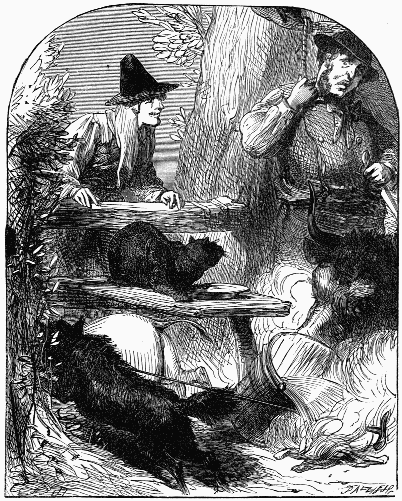 "THE CAT BEGAN TO KILL THE RAT."
"THE CAT BEGAN TO KILL THE RAT."
The little pig in a fright jumped over the stile;
And so the old woman got home that night.
[256]
[Transcriber's Note: You can play this music (MIDI file) by clicking here.]
Dickery, dickery, dock!
The mouse ran up the clock;
The clock struck one, and down the mouse ran,
Dickery, dickery, dock!
[257]
A diller, a dollar, a ten o'clock scholar,
What makes you come so soon?
You used to come at ten o'clock,
But now you come at noon.
Jacky, come give me thy fiddle,
If ever thou mean to thrive.
Nay, I'll not give my fiddle
To any man alive.
If I should give my fiddle,
They'll think that I'm gone mad;
For many a joyful day
My fiddle and I have had.
[258]
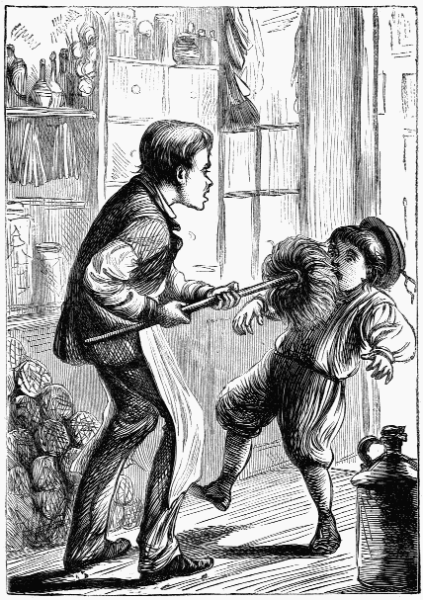 "TOMMY KEPT A CHANDLER'S SHOP."
"TOMMY KEPT A CHANDLER'S SHOP."
[259]
Tommy kept a chandler's shop,
Richard went to buy a mop,
Tommy gave him such a whop,
That sent him out of his chandler's shop.
See a pin and pick it up,
All the day you'll have good luck.
See a pin and let it lay,
Bad luck you'll have all the day.
[260]
Please to remember the fifth of November,
The Gunpowder treason plot;
I see no reason why Gunpowder treason,
Should ever be forgot.
A stick and a stake for Victoria's sake,
Hollo, boys! hollo, boys! God save the Queen.
[261]
Leg over leg,
As the dog went to Dover,
When he came to a stile,
Jump he went over.
Ladybird, Ladybird,
Fly away home,
Your house is on fire,
Your children will burn.
1, 2, 3, 4, 5,
I caught a hare alive;
6, 7, 8, 9, 10,
I let her go again.
This is the way the ladies go—
Nim, nim, nim.
This is the way the gentlemen go—
Trot, trot, trot.
This is the way the hunters go—
Gallop, gallop, gallop.
[262]
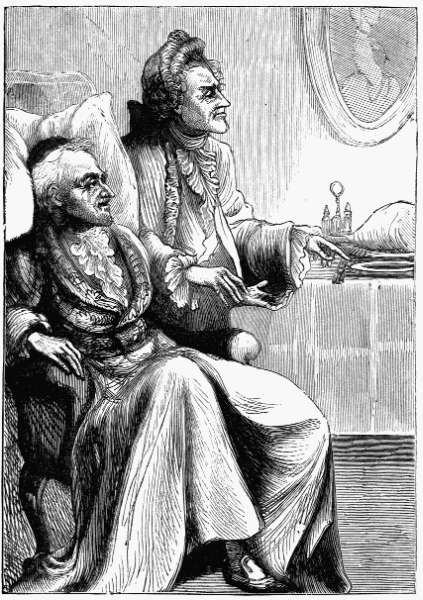 "THERE WAS AN OLD MAN OF TOBAGO."
"THERE WAS AN OLD MAN OF TOBAGO."
[263]
There was an old man of Tobago,
Who lived on rice, gruel, and sago;
Till, much to his bliss,
His physician said this—
"To a leg, sir, of mutton you may go."
Little Miss Muffett
She sat on a tuffett,
Eating of curds and whey;
There came a little spider,
Who sat down beside her,
And frightened Miss Muffett away.
[264]
As Tommy Snooks and Bessy Brooks,
Were walking out one Sunday,
Says Tommy Snooks to Bessy Brooks,
Wilt marry me on Monday?
The cat sat asleep by the side of the fire,
The mistress snored loud as a pig,
Jack took up his fiddle by Jenny's desire,
And struck up a bit of a jig.
Here am I,
Little jumping Joan,
When nobody's with me,
I'm always alone.
[265]
GOOD DOBBIN.
Oh! thank you, good Dobbin, you've been a long track,
And have carried papa all the way on your back;
You shall have some nice oats, faithful Dobbin, indeed,
For you've brought papa home to his darling with speed.
The howling wind blew, and the pelting rain beat,
And the thick mud has covered his legs and his feet,
But yet on he galloped in spite of the rain,
And has brought papa home to his darling again.
The sun it was setting a long while ago,
And papa could not see the road where he should go,
But Dobbin kept on through the desolate wild,
And has brought papa home again safe to his child.
Now go to the stable, the night is so raw,
Go, Dobbin, and rest your old bones on the straw;
Don't stand any longer out here in the rain,
For you've brought papa home to his darling again.
[266]
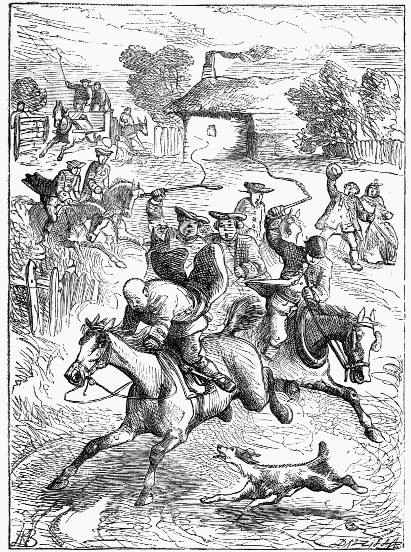 "AWAY WENT GILPIN, AND AWAY WENT POSTBOY AT HIS HEELS."
"AWAY WENT GILPIN, AND AWAY WENT POSTBOY AT HIS HEELS."
[267]
THE DIVERTING
HISTORY OF JOHN GILPIN.
SHOWING HOW HE WENT FARTHER THAN HE INTENDED,
AND CAME SAFE HOME AGAIN.
John Gilpin was a citizen
Of credit and renown,
A train-band captain eke was he,
Of famous London town.
John Gilpin's spouse said to her dear,
"Though wedded we have been
These twice ten tedious years, yet we
No holiday have seen.
"To-morrow is our wedding-day,
And we will then repair
Unto the "Bell" at Edmonton,
[268]All in a chaise and pair.
"My sister, and my sister's child,
Myself, and children three,
Will fill the chaise; so you must ride
On horseback after we."
He soon replied, "I do admire
Of womankind but one,
And you are she, my dearest dear,
Therefore it shall be done.
"I am a linendraper bold,
As all the world doth know,
And my good friend the calender
Will lend his horse to go."
Quoth Mrs. Gilpin, "That's well said;
And for that wine is dear,
We will be furnished with our own,
Which is both bright and clear."
John Gilpin kissed his loving wife;
O'erjoyed was he to find,
That though on pleasure she was bent,
She had a frugal mind.
[269]
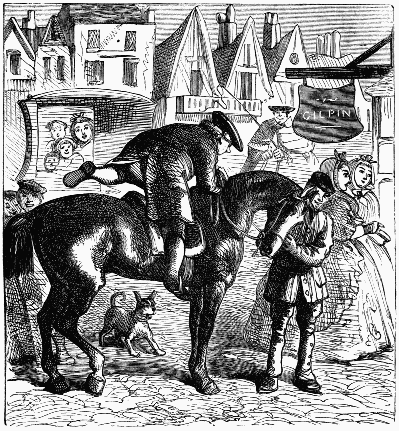
The morning came, the chaise was brought,
But yet was not allowed
To drive up to the door, lest all
Should say that she was proud.
So three doors off the chaise was stayed,
[270]Where they did all get in;
Six precious souls, and all agog
To dash through thick and thin.
Smack went the whip, round went the wheels,
Were never folks so glad!
The stones did rattle underneath,
As if Cheapside were mad.
John Gilpin at his horse's side
Seized fast the flowing mane,
And up he got, in haste to ride,
But soon came down again.
For saddletree scarce reached had he,
His journey to begin,
When, turning round his head, he saw
Three customers come in.
So down he came; for loss of time,
Although it grieved him sore,
Yet loss of pence, full well he knew,
Would trouble him much more.
'Twas long before the customers
[271]Were suited to their mind,
When Betty screaming came downstairs,
"The wine is left behind!"
"Good lack!" quoth he, "yet bring it me,
My leathern belt likewise,
In which I bear my trusty sword
When I do exercise."
Now Mistress Gilpin (careful soul!)
Had two stone bottles found,
To hold the liquor that she loved,
And keep it safe and sound.
Each bottle had a curling ear,
Through which the belt he drew,
And hung a bottle on each side,
To make his balance true.
Then over all, that he might be
Equipped from top to toe,
His long red cloak, well brushed and neat,
He manfully did throw.
Now see him mounted once again
[272]Upon his nimble steed,
Full slowly pacing o'er the stones,
With caution and good heed.
But finding soon a smoother road
Beneath his well-shod feet,
The snorting beast began to trot,
Which galled him in his seat.
"So, fair and softly!" John he cried,
But John he cried in vain;
That trot became a gallop soon,
In spite of curb and rein.
So stooping down, as needs he must
Who cannot sit upright,
He grasped the mane with both his hands,
And eke with all his might.
His horse, who never in that sort
Had handled been before,
What thing upon his back had got,
Did wonder more and more.
Away went Gilpin, neck or nought;
Away went hat and wig;
[273]
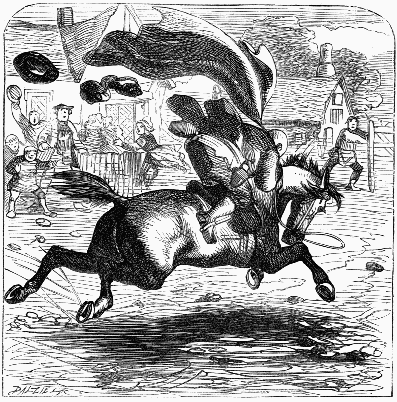
He little dreamt, when he set out,
Of running such a rig.
The wind did blow, the cloak did fly
Like streamer long and gay,
Till, loop and button failing both,
[274]At last it flew away.
Then might all people well discern
The bottles he had slung;
A bottle swinging at each side,
As hath been said or sung.
The dogs did bark, the children screamed,
Up flew the windows all;
And every soul cried out, "Well done!"
As loud as he could bawl.
Away went Gilpin—who but he?
His fame soon spread around:
"He carries weight! he rides a race!
'Tis for a thousand pound!"
And still as fast as he drew near,
'Twas wonderful to view
How in a trice the turnpike-men
Their gates wide open threw.
And now, as he went bowing down
His reeking head full low,
The bottles twain behind his back
[275]Were shattered at a blow.
Down ran the wine into the road,
Most piteous to be seen,
Which made the horses flanks to smoke
As they had basted been.
But still he seemed to carry weight,
With leathern girdle braced;
For all might see the bottle-necks
Still dangling at his waist.
Thus all through merry Islington
These gambols he did play,
Until he came unto the Wash
Of Edmonton so gay;
And there he threw the wash about
On both sides of the way,
Just like unto a trundling mop,
Or a wild goose at play.
At Edmonton his loving wife
From the balcony spied
Her tender husband, wondering much
[276]To see how he did ride.
"Stop, stop, John Gilpin!—Here's the house!"
They all at once did cry;
"The dinner waits, and we are tired;"
Said Gilpin—"So am I!"
But yet his horse was not a whit
Inclined to tarry there;
For why?—his owner had a house
Full ten miles off, at Ware.
So like an arrow swift he flew,
Shot by an archer strong;
So did he fly—which brings me to
The middle of my song.
Away went Gilpin out of breath
And sore against his will,
Till at his friend the calender's,
His horse at last stood still.
The calender, amazed to see
His neighbour in such trim,
Laid down his pipe, flew to the gate,
And thus accosted him:
[277]
"What news? what news? your tidings tell;
Tell me you must and shall—
Say why bareheaded you are come,
Or why you come at all?"
Now Gilpin had a pleasant wit,
[278]And loved a timely joke;
And thus unto the calender
In merry guise he spoke:
"I came because your horse would come:
And, if I well forebode,
My hat and wig will soon be here,
They are upon the road."
The calender, right glad to find
His friend in merry pin,
Returned him not a single word,
But to the house went in;
Whence straight he came with hat and wig,
A wig that flowed behind,
A hat not much the worse for wear,
Each comely in its kind.
He held them up, and in his turn
Thus showed his ready wit,
"My head is twice as big as yours,
They therefore needs must fit.
"But let me scrape the dirt away,
That hangs upon your face;
[279]
And stop and eat, for well you may
Be in a hungry case."
Said John, "It is my wedding-day,
And all the world would stare
If wife should dine at Edmonton,
[280]And I should dine at Ware."
So turning to his horse, he said,
"I am in haste to dine;
'Twas for your pleasure you came here,
You shall go back for mine."
Ah! luckless speech, and bootless boast!
For which he paid full dear;
For while he spake, a braying ass
Did sing most loud and clear;
Whereat his horse did snort, as he
Had heard a lion roar,
And galloped off with all his might,
As he had done before.
Away went Gilpin, and away
Went Gilpin's hat and wig:
He lost them sooner than at first,
For why—they were too big.
Now Mistress Gilpin, when she saw
Her husband posting down
Into the country far away,
She pulled out half-a-crown;
[281]
And thus unto the youth she said
That drove them to the "Bell,"
"This shall be yours when you bring back
My husband safe and well."
The youth did ride, and soon did meet
[282]John coming back amain;
Whom in a trice he tried to stop,
By catching at his rein;
But not performing what he meant,
And gladly would have done,
The frighted steed he frighted more,
And made him faster run.
Away went Gilpin, and away
Went postboy at his heels,
The postboy's horse right glad to miss
The lumbering of the wheels.
Six gentlemen upon the road,
Thus seeing Gilpin fly,
With postboy scampering in the rear,
They raised the hue and cry.
"Stop thief! stop thief! a highwayman!"
Not one of them was mute;
And all and each that passed that way
Did join in the pursuit.
And now the turnpike-gates again
Flew open in short space;
[283]
The toll-men thinking, as before,
That Gilpin rode a race.
And so he did, and won it too,
For he got first to town;
Nor stopped till where he had got up,
He did again get down.
Now let us sing, Long live the King,
And Gilpin, long live he;
And when he next doth ride abroad,
May I be there to see.
[284]
Twinkle, twinkle, little star,
How I wonder what you are!
Up above the world so high.
[285]Like a diamond in the sky.
When the blazing sun is gone,
When he nothing shines upon,
Then you show your little light,
Twinkle, twinkle, all the night.
Then the traveller in the dark
Thanks you for your tiny spark:
How could he see where to go,
If you did not twinkle so?
In the dark blue sky you keep,
Often through my curtains peep,
For you never shut your eye,
Till the sun is in the sky.
As your bright and tiny spark
Lights the traveller in the dark,
Though I know not what you are,
Twinkle, twinkle, little star.
Charley, Charley, stole the barley
Out of the baker's shop;
The baker came out, and gave him a clout,
And made poor Charley hop.
[286]
A, B, C, tumble down D,
The cat's in the cupboard and can't see me.
Elizabeth, Elspeth, Betsy, and Bess,
They all went together to seek a bird's nest,
They found a bird's nest with five eggs in;
They all took one, and left four in.
[287]
Up hill and down dale,
Butter is made in every vale;
And if Nancy Cook
Is a good girl,
She shall have a spouse,
And make butter anon,
Before her old grandmother
Grows a young man.
[288]
To market, to market, a gallop, a trot,
To buy some meat to put in the pot;
Threepence a quarter, fourpence a side,
If it hadn't been killed it must have died.
Apple-pie, pudding, and pancake,
All begins with A.
My little old man and I fell out;
I'll tell you what 'twas all about,—
I had money and he had none,
And that's the way the noise begun.
[289]
[Transcriber's Note: You can play this music (MIDI file) by clicking here.]
Georgie Porgie, pudding and pie,
Kiss'd the girls and made them cry.
When the girls came out to play,
Georgie Porgie ran away.
[290]
I love little Pussy, her coat is so warm,
And if I don't hurt her, she'll do me no harm.
I'll sit by the fire, and give her some food,
And Pussy will love me, because I am good.
[291]
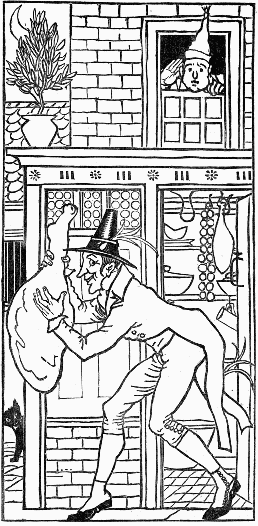
| Taffy was a Welshman,
Taffy was a thief,
Taffy came to my house,
And stole a leg of beef.
I went to Taffy's house,
Taffy was not at home;
Taffy came to my house
And stole a marrow-bone.
I went to Taffy's house,
Taffy was in bed;
I took the marrow-bone,
And broke Taffy's head.
|
[292]
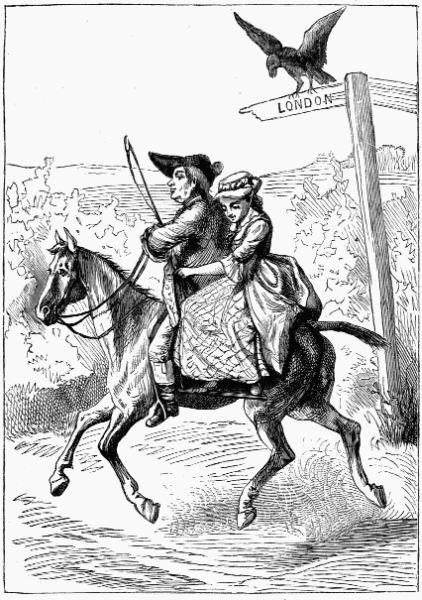 "A FARMER WENT TROTTING UPON HIS GREY MARE."
"A FARMER WENT TROTTING UPON HIS GREY MARE."
[293]
A farmer went trotting upon his grey mare,
Bumpety, bumpety, bump!
With his daughter behind him so rosy and fair,
Lumpety, lumpety, lump!
A raven cried croak! and they all tumbled down,
Bumpety, bumpety, bump!
The mare broke her knees, and the farmer his crown,
Lumpety, lumpety, lump!
[294]
The mischievous raven flew laughing away,
Bumpety, bumpety, bump!
And vowed he would serve them the same the next day,
Lumpety, lumpety, lump!
Little Betty Blue
Lost her holiday shoe,
What can little Betty do?
Give her another
To match the other,
And then she may walk in two.
Hush-a-bye, baby, lie still with thy daddy,
Thy mammy is gone to the mill,
To get some meal to bake a cake,
So pray, my dear baby, lie still.
You shall have an apple,
You shall have a plum,
You shall have a rattle-basket,
When papa comes home.
[295]
A MAN OF WORDS AND NOT OF
DEEDS.
A man of words and not of deeds
Is like a garden full of weeds;
And when the weeds begin to grow,
It's like a garden full of snow;
And when the snow begins to fall,
It's like a bird upon the wall;
And when the bird away does fly,
It's like an eagle in the sky;
And when the sky begins to roar,
It's like a lion at the door;
And when the door begins to crack,
It's like a stick across your back;
And when your back begins to smart,
It's like a penknife in your heart;
And when your heart begins to bleed,
You're dead, and dead, and dead indeed.
[296]
Poor Dog Bright,
Ran off with all his might,
Because the cat was after him,
Poor Dog Bright.
Poor Cat Fright,
Ran off with all her might,
Because the dog was after her,
Poor Cat Fright.
[297]
As I was going up Pippin Hill,
Pippin Hill was dirty,
There I met a pretty miss,
And she dropped me a curtsey.
Early to bed, and early to rise,
Is the way to be healthy, wealthy, and wise.
[298]
Old woman, old woman, shall we go a-shearing?
Speak a little louder, sir, I am very thick o' hearing.
Old woman, old woman, shall I kiss you dearly?
Thank you, kind sir, I hear very clearly.
The Cuckoo's a bonny bird,
She sings as she flies,
She brings us good tidings,
And tells us no lies.
She sucks little birds' eggs,
To make her voice clear,
And never cries "Cuckoo!"
Till spring-time of the year.
[299]
Pat-a-cake, pat-a-cake, baker's man,
Bake me a cake as fast as you can;
Prick it and pat it, and mark it with G;
And put it in the oven for Teddy and me.
Pussy-cat ate the dumplings, the dumplings;
Pussy-cat ate the dumplings.
Mamma stood by, and cried, "Oh, fie!
Why did you eat the dumplings?"
[300]
Needles and pins, needles and pins,
When a man marries his trouble begins.
For every evil under the sun,
There is a remedy, or there is none.
If there be one, try and find it;
If there be none, never mind it.
[301]
Three children sliding on the ice,
All on a summer's day,
As it fell out they all fell in,
The rest they ran away.
Now had these children been at home,
Or sliding on dry ground,
Ten thousand pounds to one penny
They had not all been drowned.
You parents all that children have,
And you, too, that have none,
If you would have them safe abroad,
Pray keep them safe at home.
[302]
THE WONDERFUL DERBY RAM.
As I was going to Derby all on a market day,
I met the finest ram, sir, that ever was fed upon hay;
Upon hay, upon hay, upon hay;
I met the finest ram, sir, that ever was fed upon hay.
This ram was fat behind, sir, this ram was fat before;
This ram was ten yards round, sir; indeed he was no more;
No more, no more, no more;
This ram was ten yards round, sir; indeed he was no more.
The horns that grew on his head, sir, they were so wondrous high,
As I've been plainly told, sir, they reached up to the sky;
The sky, the sky, the sky;
As I've been plainly told, sir, they reached up to the sky.
The tail that grew from his back, sir, was six yards and an ell;
And it was sent to Derby to toll the market bell;
The bell, the bell, the bell;
And it was sent to Derby to toll the market bell.
[303]
My Lady Wind, my Lady Wind,
Went round about the house, to find
A chink to get her foot in;
She tried the keyhole in the door,
She tried the crevice in the floor,
And drove the chimney soot in.
And then one night when it was dark,
She blew up such a tiny spark,
That all the house was pothered;
From it she raised up such a flame
As flamed away to Belting Lane,
[304]And White Cross folks were smothered.
And thus when once, my little dears,
A whisper reaches itching ears,
The same will come, you'll find;
Take my advice, restrain your tongue,
Remember what old Nurse has sung
Of busy Lady Wind.
Bow-wow-wow!
Whose dog art thou?
Little Tom Tucker's dog.
Bow-wow-wow!
Let us go to the woods, says this pig.
What to do there? says this pig.
To seek mamma, says this pig.
What to do with her? says this pig.
To kiss her, to kiss her, says this pig.
[305]
JENNY SHALL HAVE A NEW BONNET.
Jenny shall have a new bonnet,
And Jenny shall go to the fair,
And Jenny shall have a blue ribbon
To tie up her bonny brown hair.
And why may not I love Jenny?
And why may not Jenny love me?
And why may not I love Jenny,
As well as another body?
And here's a leg for a stocking,
And here is a leg for a shoe,
And she has a kiss for her daddy,
And two for her mammy, I trow.
And why may not I love Jenny?
And why may not Jenny love me?
And why may not I love Jenny,
As well as another body?
[306]
Nievie, nievie, nicknack,
Which hand will ye tak'?
Tak' the right, or tak' the wrang,
I'll beguile ye, if I can.
Oh, mother, I'm to be married to Mr. Punchinello;
To Mr. Pun, to Mr. Chin, to Mr. Nel, to Mr. Lo,
Mr. Pun, Mr. Chin, Mr. Nel, Mr. Lo, to Mr. Punchinello.
[307]
Rain, rain, go to Spain,
And never come back again.
Up hill spare me,
Down hill 'ware me,
On level ground spare me not,
And in the stable forget me not.
[308]
When little Fred went to bed,
He always said his prayers;
He kissed mamma, and then papa,
And straightway went upstairs.
Bless you, bless you, bonny bee:
Say, when will your wedding be?
If it be to-morrow day,
Take your wings and fly away.
Jack Sprat's pig,
He was not very little,
Nor yet very big;
He was not very lean,
He was not very fat,
He'll do well for a grunt,
Says little Jack Sprat.
[309]
Rain, rain,
Go away,
Come again
April day;
Little Johnny
Wants to play.
A little cock sparrow sat on a tree,
Looking as happy as happy could be,
Till a boy came by with his bow and arrow,
Says he, I will shoot the little cock sparrow.
His body will make me a nice little stew,
And his giblets will make me a little pie, too.
Says the little cock sparrow, I'll be shot if I stay,
So he clapped his wings, and flew away.
[310]
The rose is red, the violet's blue;
The pink is sweet, and so are you.
"We'll go a-shooting," says Robin to Bobbin,
"We'll go a-shooting," says Richard to John;
"We'll go a-shooting," says John, all alone;
"We'll go a-shooting," says every one.
[311]
Valentine, oh, Valentine,
Curl your locks as I do mine;
Two before and two behind;
Good morrow to you, Valentine.
Mr. Isbister, and Betsy his sister,
Resolve upon giving a treat;
So letters they write,
Their friends to invite
To their house in Great Camomile Street.
[312]
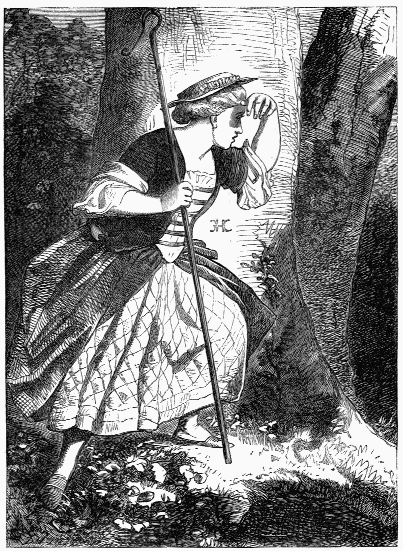 "LITTLE BO-PEEP HAS LOST HER SHEEP, AND CAN'T TELL WHERE
TO FIND THEM."
"LITTLE BO-PEEP HAS LOST HER SHEEP, AND CAN'T TELL WHERE
TO FIND THEM."
[313]
[Transcriber's Note: You can play this music (MIDI file) by clicking here.]
Little Bo-peep has lost her sheep,
And cannot tell where to find them;
Leave them alone, and they'll come home,
And bring their tails behind them.
[314]
Little Bo-peep fell fast asleep,
And dreamt she heard them bleating;
But when she awoke she found it a joke,
For still they all were fleeting.
[315]
Then up she took her little crook,
Determined for to find them;
She found 'em indeed, but it made her heart bleed,
For they'd left their tails behind 'em.
[316]
It happened one day, as Bo-peep did stray
Unto a meadow hard by,
There she espied their tails, side by side,
All hung on a tree to dry.
[317]
Then she heaved a sigh, and wiped her eye,
And ran o'er hill and dale-o,
And tried what she could, as a shepherdess should,
To tack to each sheep its tail-o.
[318]
As I was going to St. Ives,
I met a man with seven wives,
Every wife had seven sacks,
Every sack had seven cats,
Every cat had seven kits.
Kits, cats, sacks, and wives,
How many were there going to St. Ives?
Go to bed first, a golden purse;
Go to bed second, a golden pheasant;
Go to bed third, a golden bird.
[319]
There was an old woman, and what do you think?
She lived upon nothing but victuals and drink;
Victuals and drink were the chief of her diet,
Yet the plaguey old woman would never be quiet.
[320]She went to the baker's to buy some bread;
And when she came home her husband was dead.
She went to the clerk, to toll the great bell;
And when she came back, her husband was well.
Some little mice sat in a barn to spin,
Pussy came by, and she popped her head in.
"Shall I come in and cut your threads off?"
"Oh, no, kind sir, you will snap our heads off."
Transcriber's Notes:
There seemed to be no rhyme nor reason to which poems began with smallcaps
and which did not. Without a clear pattern to follow, this was retained as printed.
The corrections made are listed below and also indicated by dotted lines under the corrections. Scroll the mouse over the word and the original text will appear.
Page 82, word "a" added to text. Original read (There was jockey) now reads (There
was a jockey)
Page 227, "he" changed to "she" (she fought for her)
End of Project Gutenberg's Mother Goose's Nursery Rhymes, by Walter Crane
*** END OF THIS PROJECT GUTENBERG EBOOK MOTHER GOOSE'S NURSERY RHYMES ***
***** This file should be named 39784-h.htm or 39784-h.zip *****
This and all associated files of various formats will be found in:
http://www.gutenberg.org/3/9/7/8/39784/
Produced by Chris Curnow, Emmy and the Online Distributed
Proofreading Team at http://www.pgdp.net Music transcribed
by Anne Celnick. (This file was produced from images
generously made available by The Internet Archive)
Updated editions will replace the previous one--the old editions
will be renamed.
Creating the works from public domain print editions means that no
one owns a United States copyright in these works, so the Foundation
(and you!) can copy and distribute it in the United States without
permission and without paying copyright royalties. Special rules,
set forth in the General Terms of Use part of this license, apply to
copying and distributing Project Gutenberg-tm electronic works to
protect the PROJECT GUTENBERG-tm concept and trademark. Project
Gutenberg is a registered trademark, and may not be used if you
charge for the eBooks, unless you receive specific permission. If you
do not charge anything for copies of this eBook, complying with the
rules is very easy. You may use this eBook for nearly any purpose
such as creation of derivative works, reports, performances and
research. They may be modified and printed and given away--you may do
practically ANYTHING with public domain eBooks. Redistribution is
subject to the trademark license, especially commercial
redistribution.
*** START: FULL LICENSE ***
THE FULL PROJECT GUTENBERG LICENSE
PLEASE READ THIS BEFORE YOU DISTRIBUTE OR USE THIS WORK
To protect the Project Gutenberg-tm mission of promoting the free
distribution of electronic works, by using or distributing this work
(or any other work associated in any way with the phrase "Project
Gutenberg"), you agree to comply with all the terms of the Full Project
Gutenberg-tm License available with this file or online at
www.gutenberg.org/license.
Section 1. General Terms of Use and Redistributing Project Gutenberg-tm
electronic works
1.A. By reading or using any part of this Project Gutenberg-tm
electronic work, you indicate that you have read, understand, agree to
and accept all the terms of this license and intellectual property
(trademark/copyright) agreement. If you do not agree to abide by all
the terms of this agreement, you must cease using and return or destroy
all copies of Project Gutenberg-tm electronic works in your possession.
If you paid a fee for obtaining a copy of or access to a Project
Gutenberg-tm electronic work and you do not agree to be bound by the
terms of this agreement, you may obtain a refund from the person or
entity to whom you paid the fee as set forth in paragraph 1.E.8.
1.B. "Project Gutenberg" is a registered trademark. It may only be
used on or associated in any way with an electronic work by people who
agree to be bound by the terms of this agreement. There are a few
things that you can do with most Project Gutenberg-tm electronic works
even without complying with the full terms of this agreement. See
paragraph 1.C below. There are a lot of things you can do with Project
Gutenberg-tm electronic works if you follow the terms of this agreement
and help preserve free future access to Project Gutenberg-tm electronic
works. See paragraph 1.E below.
1.C. The Project Gutenberg Literary Archive Foundation ("the Foundation"
or PGLAF), owns a compilation copyright in the collection of Project
Gutenberg-tm electronic works. Nearly all the individual works in the
collection are in the public domain in the United States. If an
individual work is in the public domain in the United States and you are
located in the United States, we do not claim a right to prevent you from
copying, distributing, performing, displaying or creating derivative
works based on the work as long as all references to Project Gutenberg
are removed. Of course, we hope that you will support the Project
Gutenberg-tm mission of promoting free access to electronic works by
freely sharing Project Gutenberg-tm works in compliance with the terms of
this agreement for keeping the Project Gutenberg-tm name associated with
the work. You can easily comply with the terms of this agreement by
keeping this work in the same format with its attached full Project
Gutenberg-tm License when you share it without charge with others.
1.D. The copyright laws of the place where you are located also govern
what you can do with this work. Copyright laws in most countries are in
a constant state of change. If you are outside the United States, check
the laws of your country in addition to the terms of this agreement
before downloading, copying, displaying, performing, distributing or
creating derivative works based on this work or any other Project
Gutenberg-tm work. The Foundation makes no representations concerning
the copyright status of any work in any country outside the United
States.
1.E. Unless you have removed all references to Project Gutenberg:
1.E.1. The following sentence, with active links to, or other immediate
access to, the full Project Gutenberg-tm License must appear prominently
whenever any copy of a Project Gutenberg-tm work (any work on which the
phrase "Project Gutenberg" appears, or with which the phrase "Project
Gutenberg" is associated) is accessed, displayed, performed, viewed,
copied or distributed:
This eBook is for the use of anyone anywhere at no cost and with
almost no restrictions whatsoever. You may copy it, give it away or
re-use it under the terms of the Project Gutenberg License included
with this eBook or online at www.gutenberg.org
1.E.2. If an individual Project Gutenberg-tm electronic work is derived
from the public domain (does not contain a notice indicating that it is
posted with permission of the copyright holder), the work can be copied
and distributed to anyone in the United States without paying any fees
or charges. If you are redistributing or providing access to a work
with the phrase "Project Gutenberg" associated with or appearing on the
work, you must comply either with the requirements of paragraphs 1.E.1
through 1.E.7 or obtain permission for the use of the work and the
Project Gutenberg-tm trademark as set forth in paragraphs 1.E.8 or
1.E.9.
1.E.3. If an individual Project Gutenberg-tm electronic work is posted
with the permission of the copyright holder, your use and distribution
must comply with both paragraphs 1.E.1 through 1.E.7 and any additional
terms imposed by the copyright holder. Additional terms will be linked
to the Project Gutenberg-tm License for all works posted with the
permission of the copyright holder found at the beginning of this work.
1.E.4. Do not unlink or detach or remove the full Project Gutenberg-tm
License terms from this work, or any files containing a part of this
work or any other work associated with Project Gutenberg-tm.
1.E.5. Do not copy, display, perform, distribute or redistribute this
electronic work, or any part of this electronic work, without
prominently displaying the sentence set forth in paragraph 1.E.1 with
active links or immediate access to the full terms of the Project
Gutenberg-tm License.
1.E.6. You may convert to and distribute this work in any binary,
compressed, marked up, nonproprietary or proprietary form, including any
word processing or hypertext form. However, if you provide access to or
distribute copies of a Project Gutenberg-tm work in a format other than
"Plain Vanilla ASCII" or other format used in the official version
posted on the official Project Gutenberg-tm web site (www.gutenberg.org),
you must, at no additional cost, fee or expense to the user, provide a
copy, a means of exporting a copy, or a means of obtaining a copy upon
request, of the work in its original "Plain Vanilla ASCII" or other
form. Any alternate format must include the full Project Gutenberg-tm
License as specified in paragraph 1.E.1.
1.E.7. Do not charge a fee for access to, viewing, displaying,
performing, copying or distributing any Project Gutenberg-tm works
unless you comply with paragraph 1.E.8 or 1.E.9.
1.E.8. You may charge a reasonable fee for copies of or providing
access to or distributing Project Gutenberg-tm electronic works provided
that
- You pay a royalty fee of 20% of the gross profits you derive from
the use of Project Gutenberg-tm works calculated using the method
you already use to calculate your applicable taxes. The fee is
owed to the owner of the Project Gutenberg-tm trademark, but he
has agreed to donate royalties under this paragraph to the
Project Gutenberg Literary Archive Foundation. Royalty payments
must be paid within 60 days following each date on which you
prepare (or are legally required to prepare) your periodic tax
returns. Royalty payments should be clearly marked as such and
sent to the Project Gutenberg Literary Archive Foundation at the
address specified in Section 4, "Information about donations to
the Project Gutenberg Literary Archive Foundation."
- You provide a full refund of any money paid by a user who notifies
you in writing (or by e-mail) within 30 days of receipt that s/he
does not agree to the terms of the full Project Gutenberg-tm
License. You must require such a user to return or
destroy all copies of the works possessed in a physical medium
and discontinue all use of and all access to other copies of
Project Gutenberg-tm works.
- You provide, in accordance with paragraph 1.F.3, a full refund of any
money paid for a work or a replacement copy, if a defect in the
electronic work is discovered and reported to you within 90 days
of receipt of the work.
- You comply with all other terms of this agreement for free
distribution of Project Gutenberg-tm works.
1.E.9. If you wish to charge a fee or distribute a Project Gutenberg-tm
electronic work or group of works on different terms than are set
forth in this agreement, you must obtain permission in writing from
both the Project Gutenberg Literary Archive Foundation and Michael
Hart, the owner of the Project Gutenberg-tm trademark. Contact the
Foundation as set forth in Section 3 below.
1.F.
1.F.1. Project Gutenberg volunteers and employees expend considerable
effort to identify, do copyright research on, transcribe and proofread
public domain works in creating the Project Gutenberg-tm
collection. Despite these efforts, Project Gutenberg-tm electronic
works, and the medium on which they may be stored, may contain
"Defects," such as, but not limited to, incomplete, inaccurate or
corrupt data, transcription errors, a copyright or other intellectual
property infringement, a defective or damaged disk or other medium, a
computer virus, or computer codes that damage or cannot be read by
your equipment.
1.F.2. LIMITED WARRANTY, DISCLAIMER OF DAMAGES - Except for the "Right
of Replacement or Refund" described in paragraph 1.F.3, the Project
Gutenberg Literary Archive Foundation, the owner of the Project
Gutenberg-tm trademark, and any other party distributing a Project
Gutenberg-tm electronic work under this agreement, disclaim all
liability to you for damages, costs and expenses, including legal
fees. YOU AGREE THAT YOU HAVE NO REMEDIES FOR NEGLIGENCE, STRICT
LIABILITY, BREACH OF WARRANTY OR BREACH OF CONTRACT EXCEPT THOSE
PROVIDED IN PARAGRAPH 1.F.3. YOU AGREE THAT THE FOUNDATION, THE
TRADEMARK OWNER, AND ANY DISTRIBUTOR UNDER THIS AGREEMENT WILL NOT BE
LIABLE TO YOU FOR ACTUAL, DIRECT, INDIRECT, CONSEQUENTIAL, PUNITIVE OR
INCIDENTAL DAMAGES EVEN IF YOU GIVE NOTICE OF THE POSSIBILITY OF SUCH
DAMAGE.
1.F.3. LIMITED RIGHT OF REPLACEMENT OR REFUND - If you discover a
defect in this electronic work within 90 days of receiving it, you can
receive a refund of the money (if any) you paid for it by sending a
written explanation to the person you received the work from. If you
received the work on a physical medium, you must return the medium with
your written explanation. The person or entity that provided you with
the defective work may elect to provide a replacement copy in lieu of a
refund. If you received the work electronically, the person or entity
providing it to you may choose to give you a second opportunity to
receive the work electronically in lieu of a refund. If the second copy
is also defective, you may demand a refund in writing without further
opportunities to fix the problem.
1.F.4. Except for the limited right of replacement or refund set forth
in paragraph 1.F.3, this work is provided to you 'AS-IS', WITH NO OTHER
WARRANTIES OF ANY KIND, EXPRESS OR IMPLIED, INCLUDING BUT NOT LIMITED TO
WARRANTIES OF MERCHANTABILITY OR FITNESS FOR ANY PURPOSE.
1.F.5. Some states do not allow disclaimers of certain implied
warranties or the exclusion or limitation of certain types of damages.
If any disclaimer or limitation set forth in this agreement violates the
law of the state applicable to this agreement, the agreement shall be
interpreted to make the maximum disclaimer or limitation permitted by
the applicable state law. The invalidity or unenforceability of any
provision of this agreement shall not void the remaining provisions.
1.F.6. INDEMNITY - You agree to indemnify and hold the Foundation, the
trademark owner, any agent or employee of the Foundation, anyone
providing copies of Project Gutenberg-tm electronic works in accordance
with this agreement, and any volunteers associated with the production,
promotion and distribution of Project Gutenberg-tm electronic works,
harmless from all liability, costs and expenses, including legal fees,
that arise directly or indirectly from any of the following which you do
or cause to occur: (a) distribution of this or any Project Gutenberg-tm
work, (b) alteration, modification, or additions or deletions to any
Project Gutenberg-tm work, and (c) any Defect you cause.
Section 2. Information about the Mission of Project Gutenberg-tm
Project Gutenberg-tm is synonymous with the free distribution of
electronic works in formats readable by the widest variety of computers
including obsolete, old, middle-aged and new computers. It exists
because of the efforts of hundreds of volunteers and donations from
people in all walks of life.
Volunteers and financial support to provide volunteers with the
assistance they need are critical to reaching Project Gutenberg-tm's
goals and ensuring that the Project Gutenberg-tm collection will
remain freely available for generations to come. In 2001, the Project
Gutenberg Literary Archive Foundation was created to provide a secure
and permanent future for Project Gutenberg-tm and future generations.
To learn more about the Project Gutenberg Literary Archive Foundation
and how your efforts and donations can help, see Sections 3 and 4
and the Foundation information page at www.gutenberg.org
Section 3. Information about the Project Gutenberg Literary Archive
Foundation
The Project Gutenberg Literary Archive Foundation is a non profit
501(c)(3) educational corporation organized under the laws of the
state of Mississippi and granted tax exempt status by the Internal
Revenue Service. The Foundation's EIN or federal tax identification
number is 64-6221541. Contributions to the Project Gutenberg
Literary Archive Foundation are tax deductible to the full extent
permitted by U.S. federal laws and your state's laws.
The Foundation's principal office is located at 4557 Melan Dr. S.
Fairbanks, AK, 99712., but its volunteers and employees are scattered
throughout numerous locations. Its business office is located at 809
North 1500 West, Salt Lake City, UT 84116, (801) 596-1887. Email
contact links and up to date contact information can be found at the
Foundation's web site and official page at www.gutenberg.org/contact
For additional contact information:
Dr. Gregory B. Newby
Chief Executive and Director
gbnewby@pglaf.org
Section 4. Information about Donations to the Project Gutenberg
Literary Archive Foundation
Project Gutenberg-tm depends upon and cannot survive without wide
spread public support and donations to carry out its mission of
increasing the number of public domain and licensed works that can be
freely distributed in machine readable form accessible by the widest
array of equipment including outdated equipment. Many small donations
($1 to $5,000) are particularly important to maintaining tax exempt
status with the IRS.
The Foundation is committed to complying with the laws regulating
charities and charitable donations in all 50 states of the United
States. Compliance requirements are not uniform and it takes a
considerable effort, much paperwork and many fees to meet and keep up
with these requirements. We do not solicit donations in locations
where we have not received written confirmation of compliance. To
SEND DONATIONS or determine the status of compliance for any
particular state visit www.gutenberg.org/donate
While we cannot and do not solicit contributions from states where we
have not met the solicitation requirements, we know of no prohibition
against accepting unsolicited donations from donors in such states who
approach us with offers to donate.
International donations are gratefully accepted, but we cannot make
any statements concerning tax treatment of donations received from
outside the United States. U.S. laws alone swamp our small staff.
Please check the Project Gutenberg Web pages for current donation
methods and addresses. Donations are accepted in a number of other
ways including checks, online payments and credit card donations.
To donate, please visit: www.gutenberg.org/donate
Section 5. General Information About Project Gutenberg-tm electronic
works.
Professor Michael S. Hart was the originator of the Project Gutenberg-tm
concept of a library of electronic works that could be freely shared
with anyone. For forty years, he produced and distributed Project
Gutenberg-tm eBooks with only a loose network of volunteer support.
Project Gutenberg-tm eBooks are often created from several printed
editions, all of which are confirmed as Public Domain in the U.S.
unless a copyright notice is included. Thus, we do not necessarily
keep eBooks in compliance with any particular paper edition.
Most people start at our Web site which has the main PG search facility:
www.gutenberg.org
This Web site includes information about Project Gutenberg-tm,
including how to make donations to the Project Gutenberg Literary
Archive Foundation, how to help produce our new eBooks, and how to
subscribe to our email newsletter to hear about new eBooks.



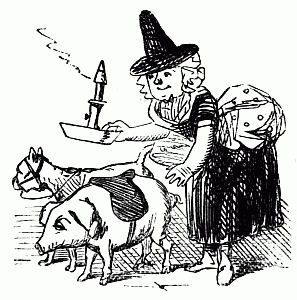
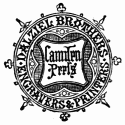
 "SHE SENT HIM TO MARKET, A LIVE GOOSE HE BOUGHT."
"SHE SENT HIM TO MARKET, A LIVE GOOSE HE BOUGHT."
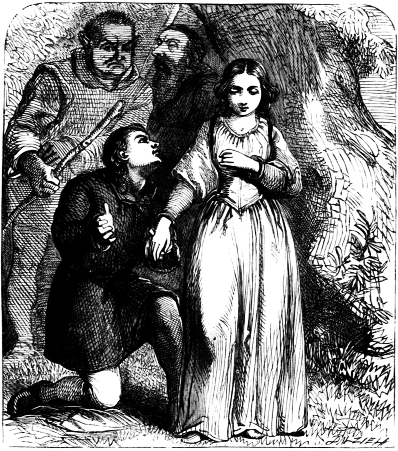
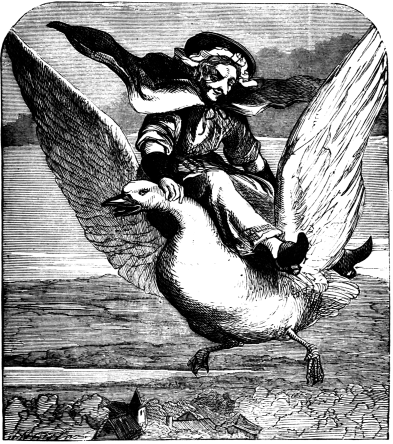
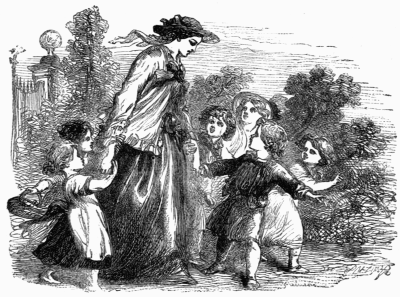
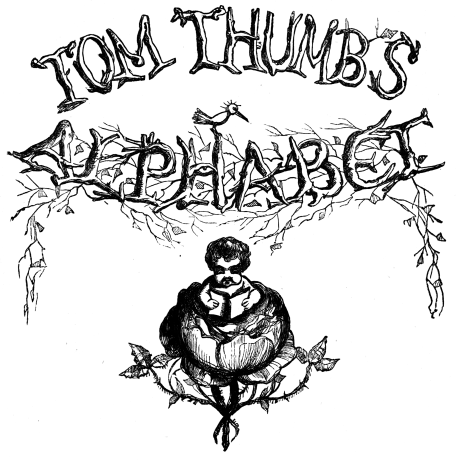
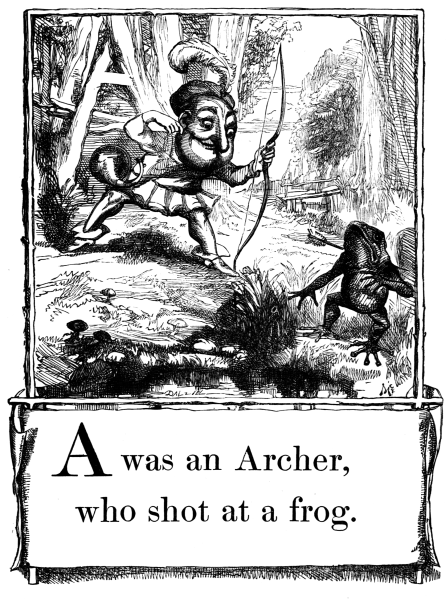
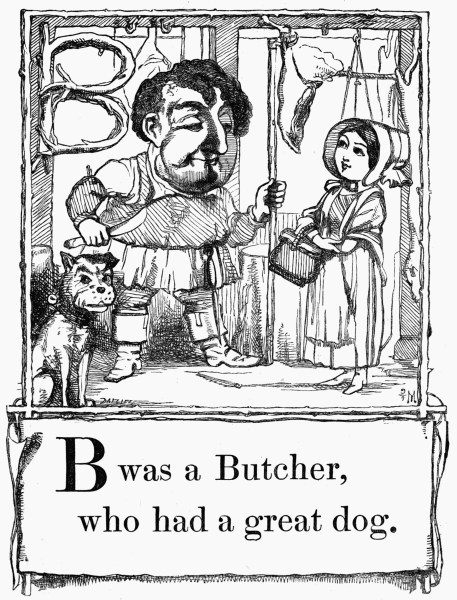
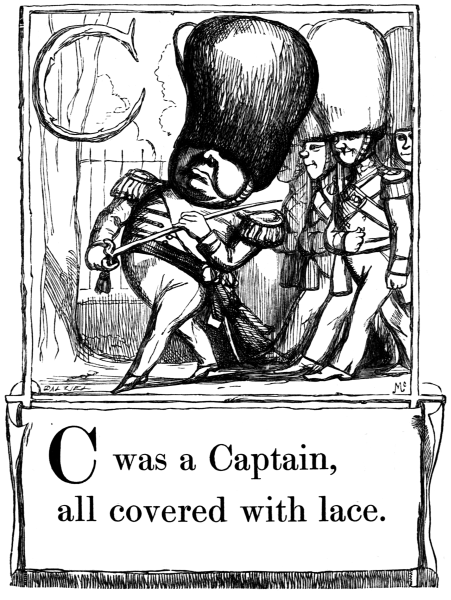
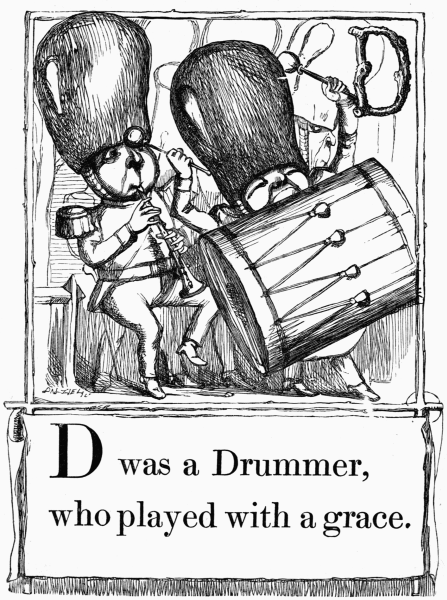
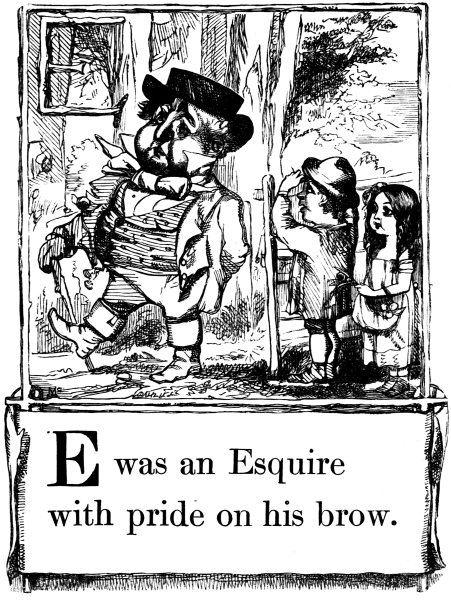
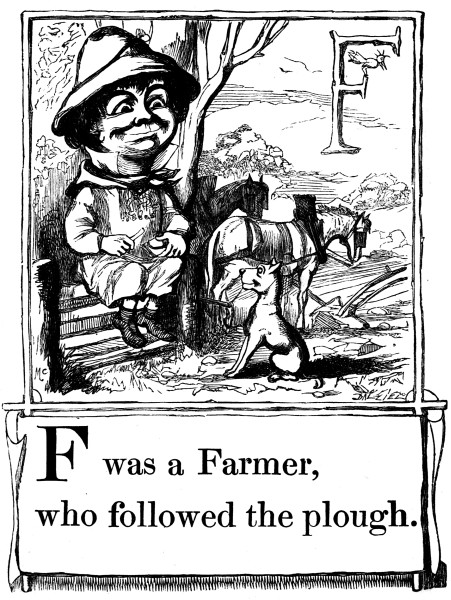
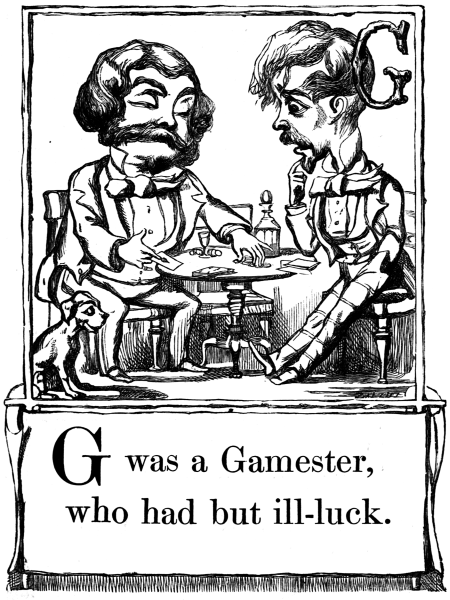
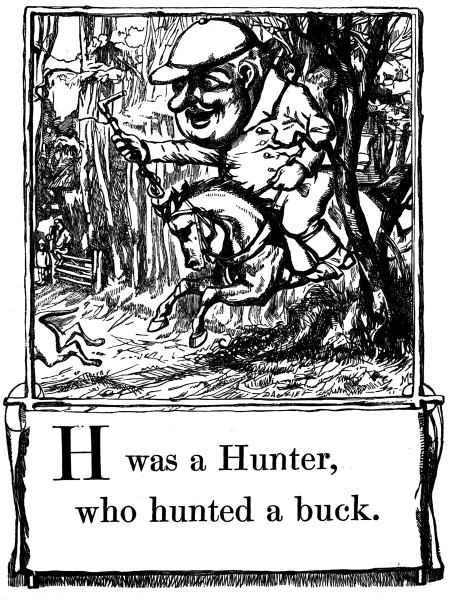
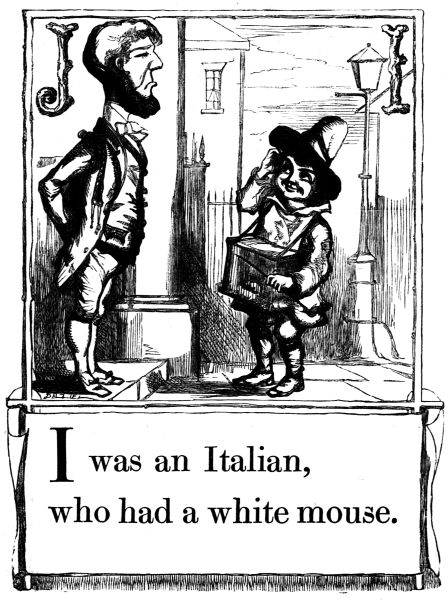
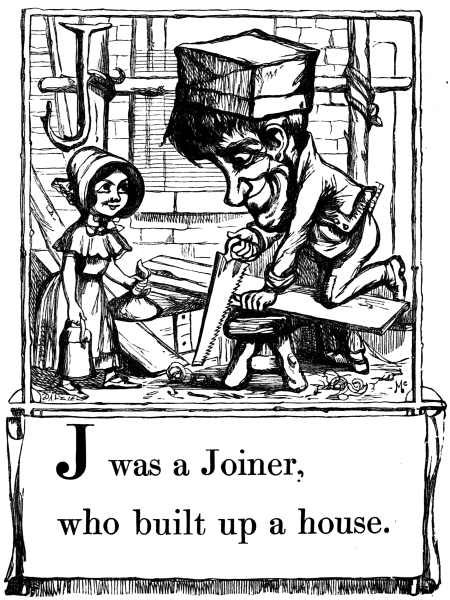
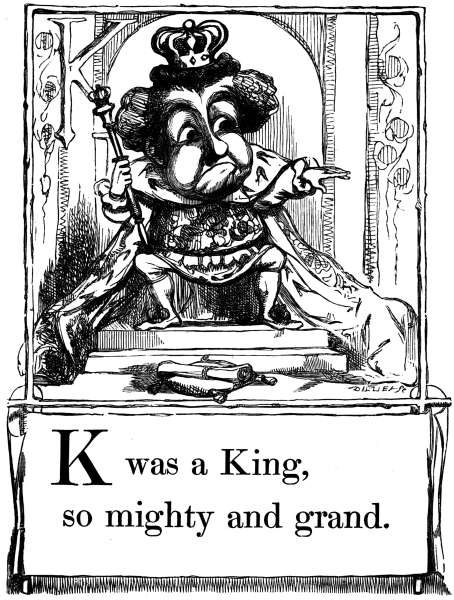
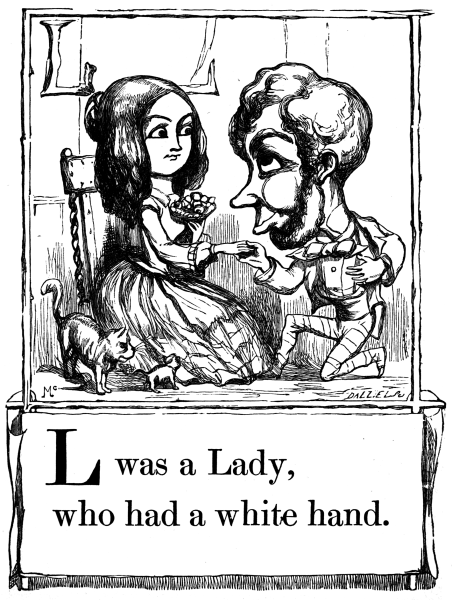
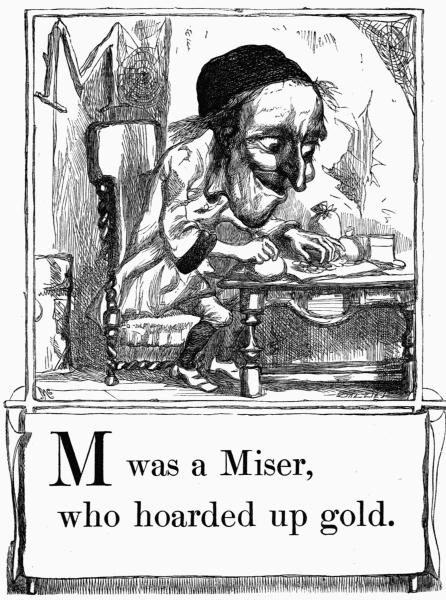
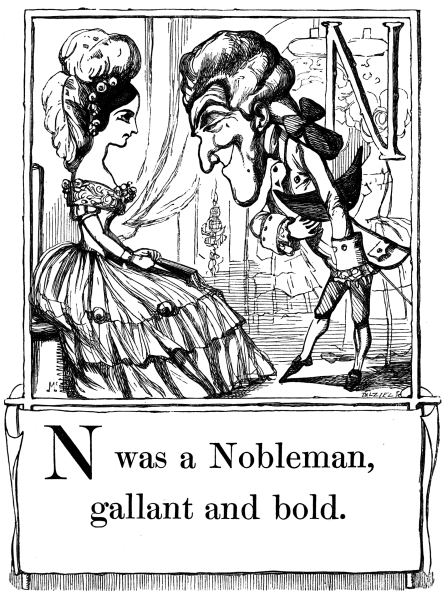
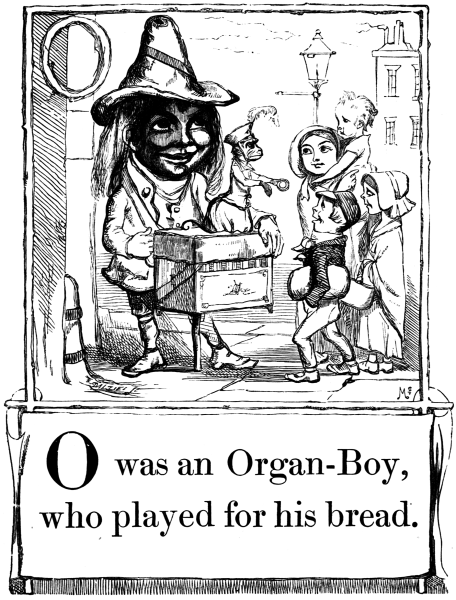
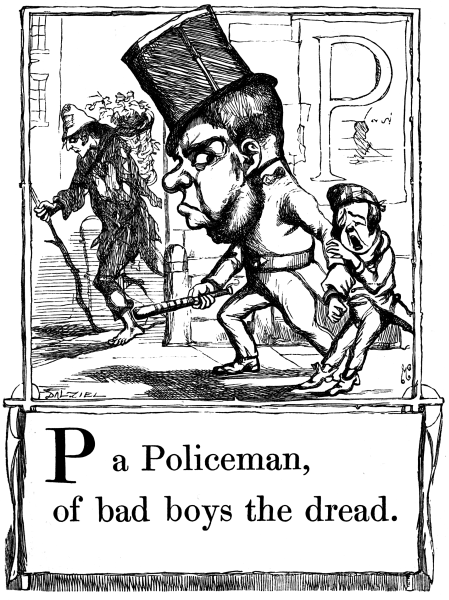
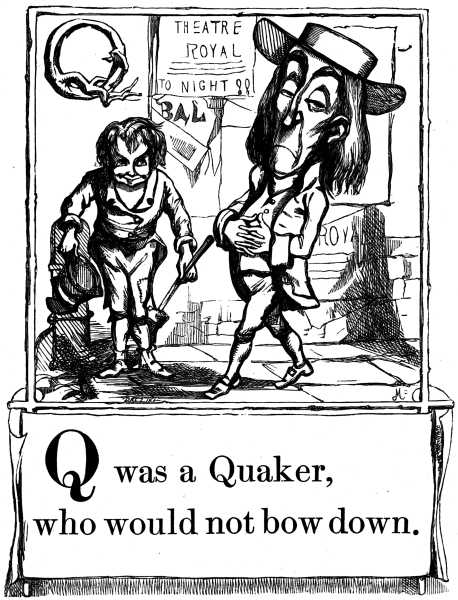
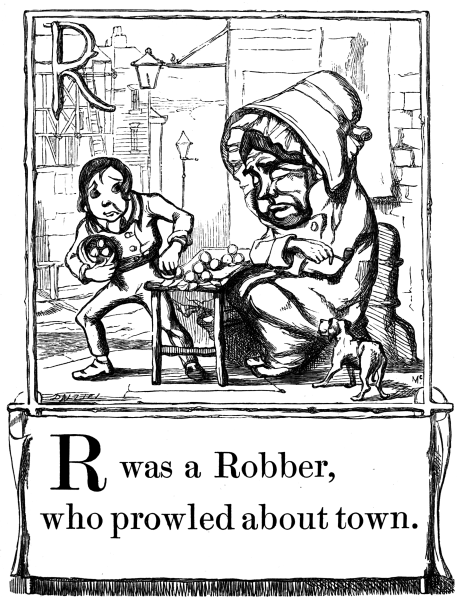
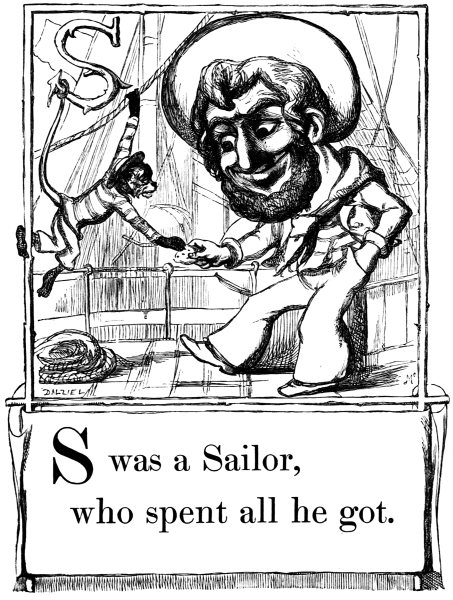
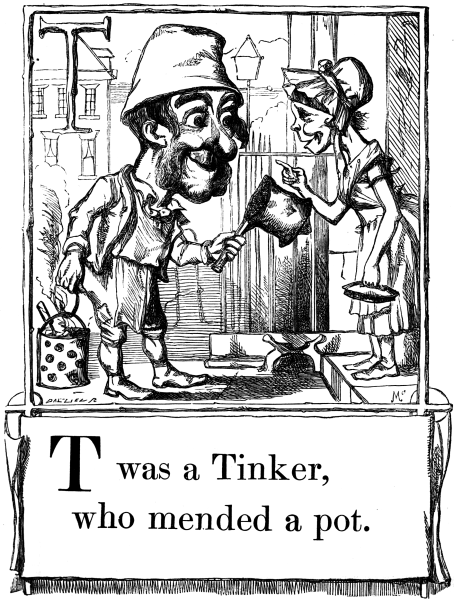
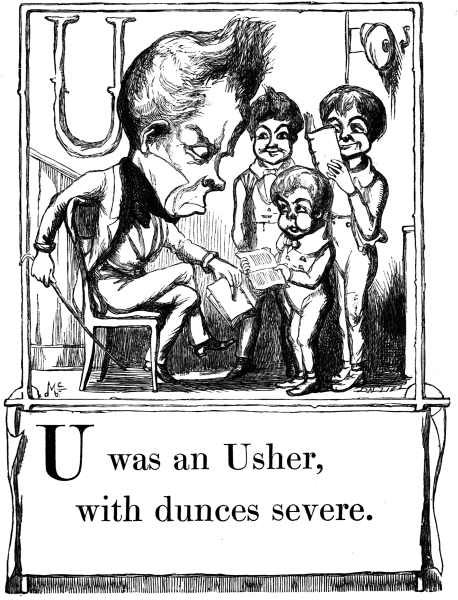
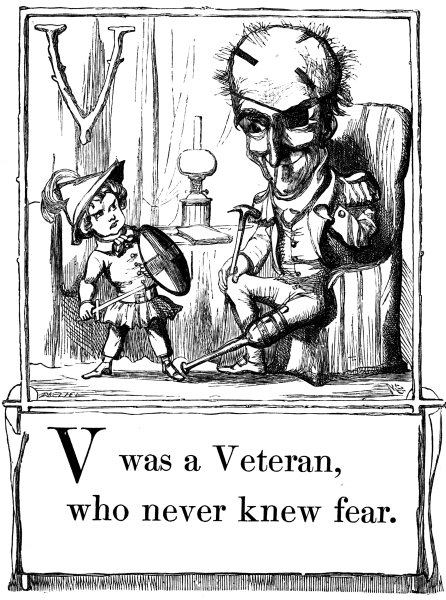
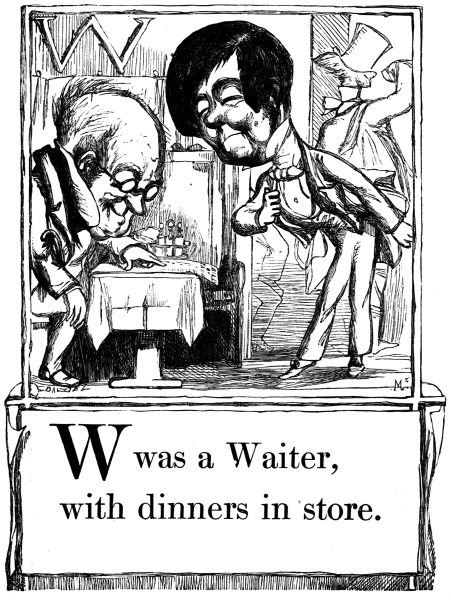
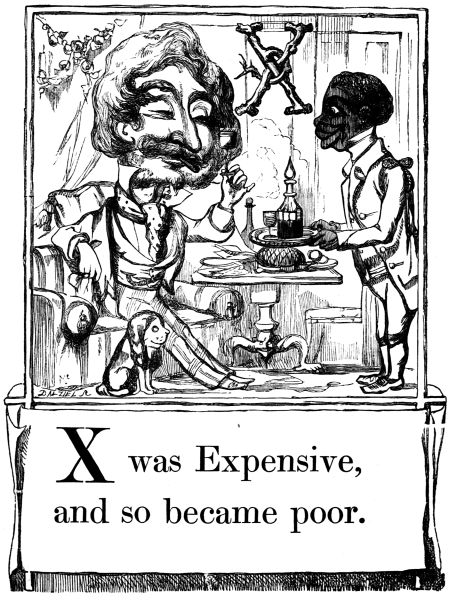
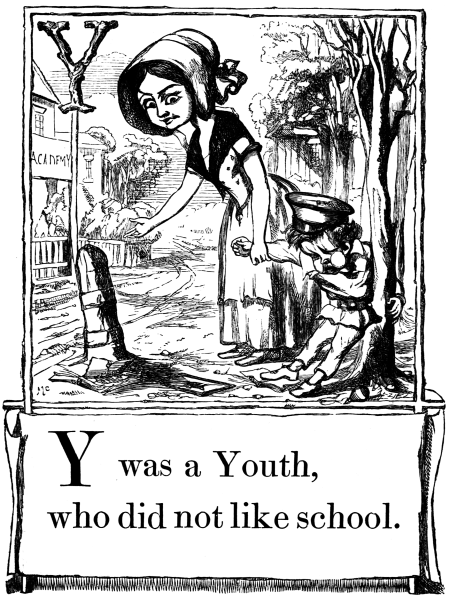


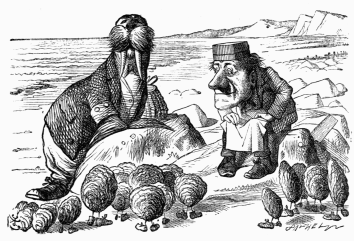

 A MAN WENT HUNTING AT REIGATE.
A MAN WENT HUNTING AT REIGATE.
 HUMPTY-DUMPTY.
HUMPTY-DUMPTY.
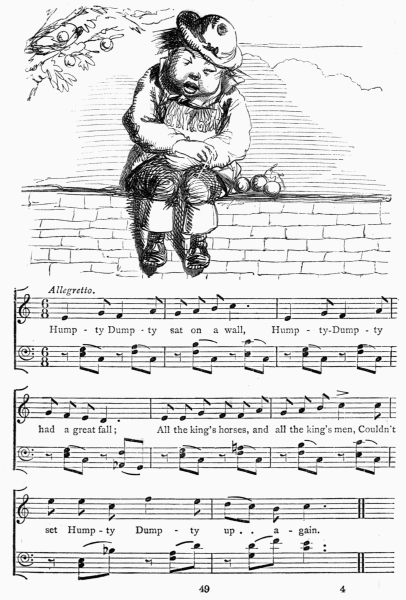
 "THERE WAS AN OWL LIVED IN AN OAK."
"THERE WAS AN OWL LIVED IN AN OAK."
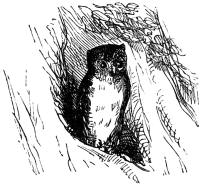
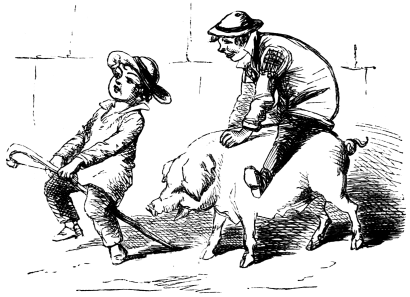
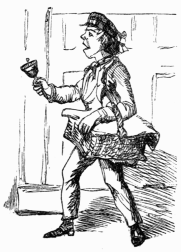
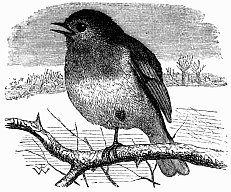
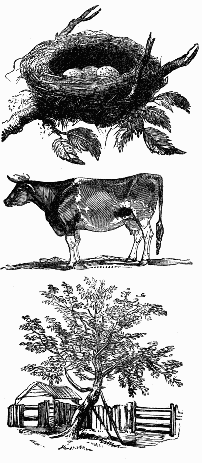

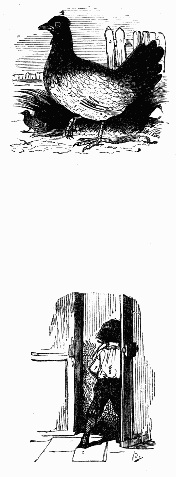
 "THERE WAS A JOLLY MILLER."
"THERE WAS A JOLLY MILLER."
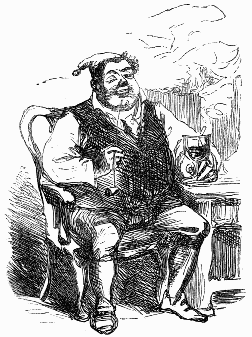
 "DICKERY, DICKERY, DARE."
"DICKERY, DICKERY, DARE."
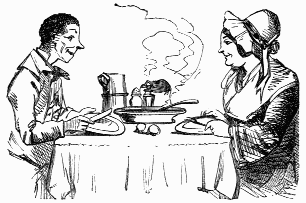
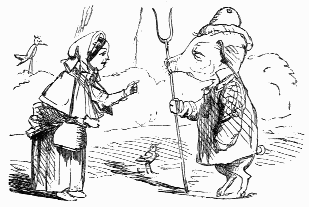
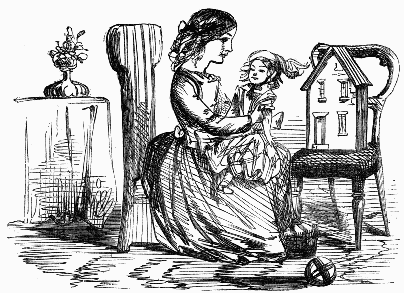
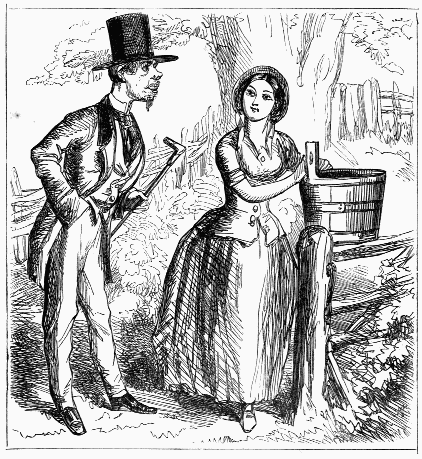
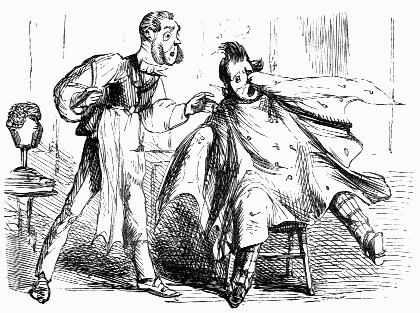
 "OLD MOTHER HUBBARD WENT TO THE CUPBOARD."
"OLD MOTHER HUBBARD WENT TO THE CUPBOARD."
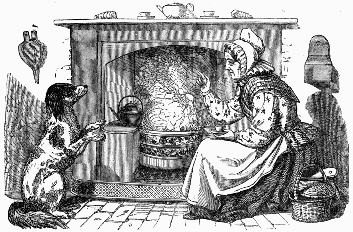
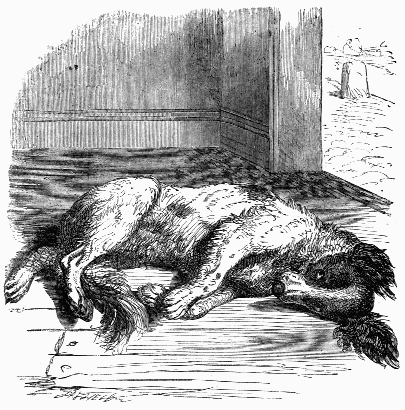
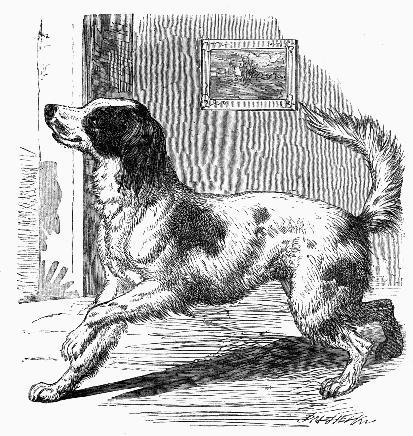
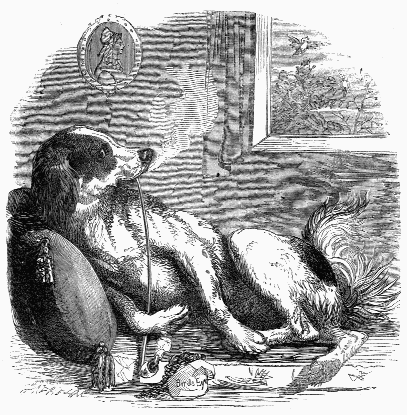
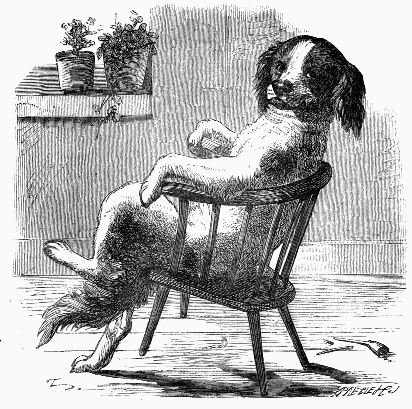
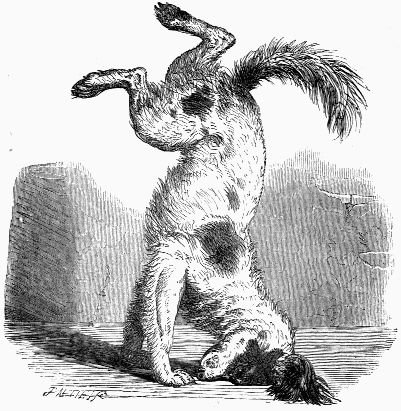
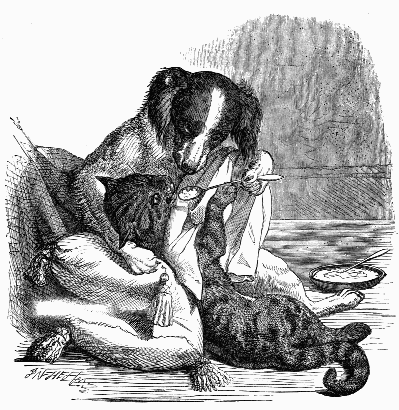
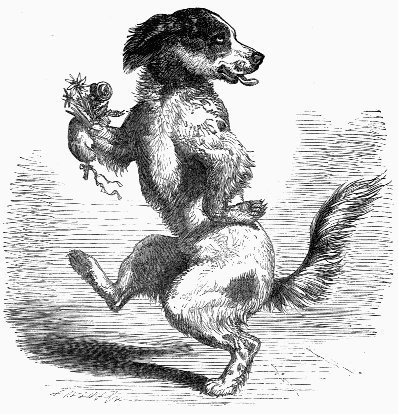
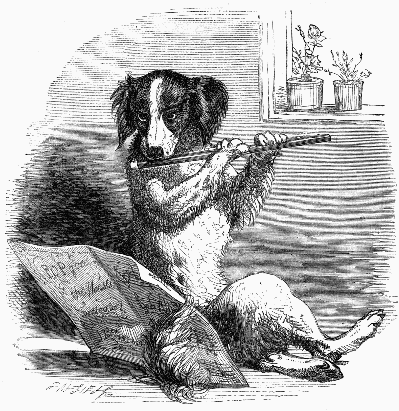
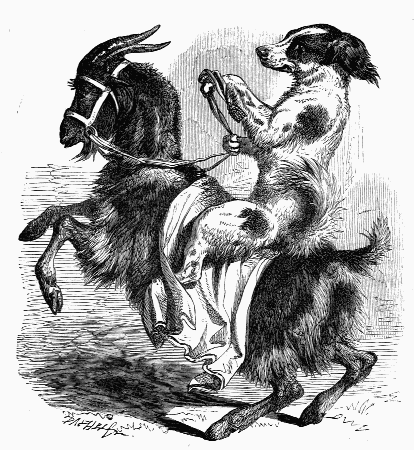
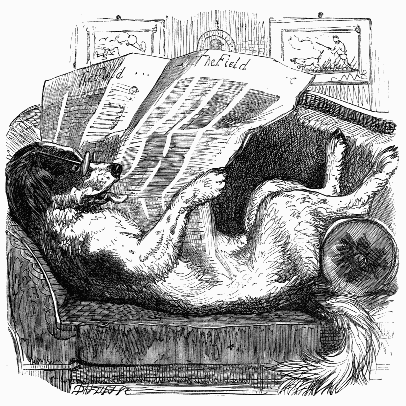
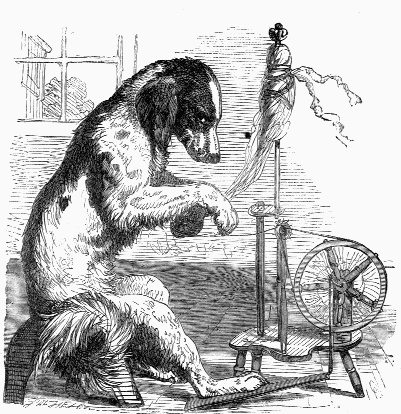
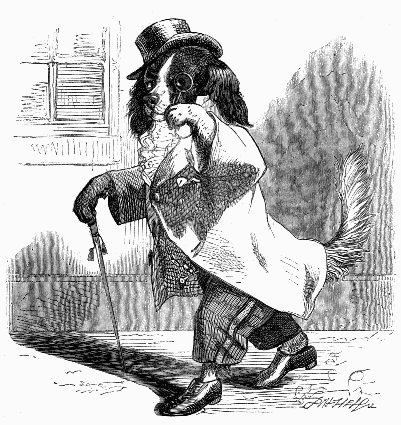
 "THE DAME MADE A CURTSEY, THE DOG MADE A BOW."
"THE DAME MADE A CURTSEY, THE DOG MADE A BOW."
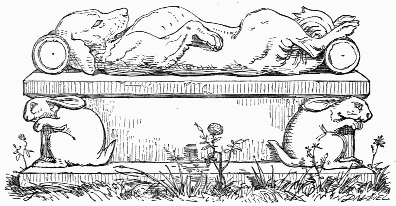
 LITTLE JACK HORNER.
LITTLE JACK HORNER.
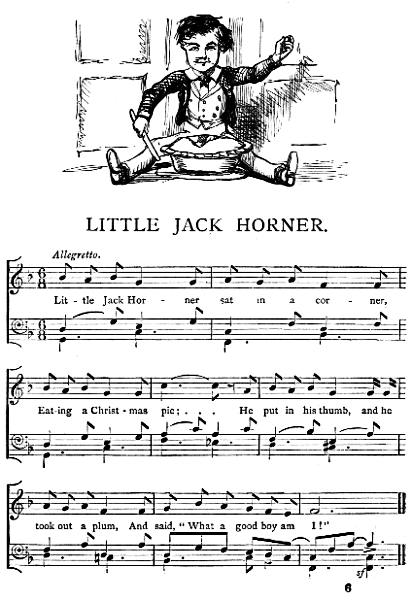

 "JENNY BLUSHED BEHIND HER FAN."
"JENNY BLUSHED BEHIND HER FAN."
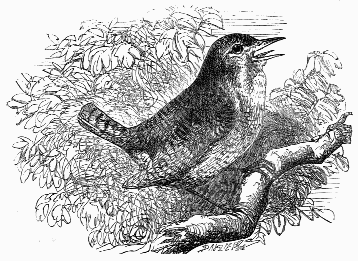
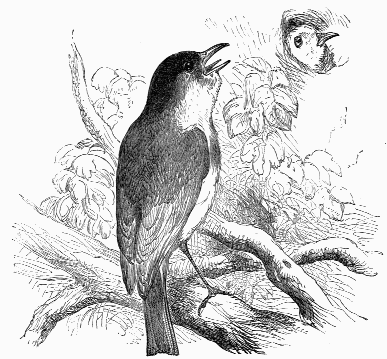
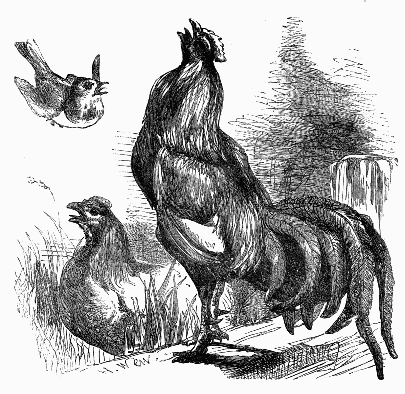
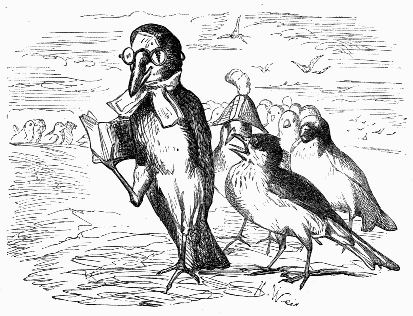
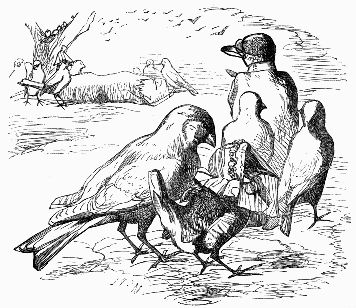
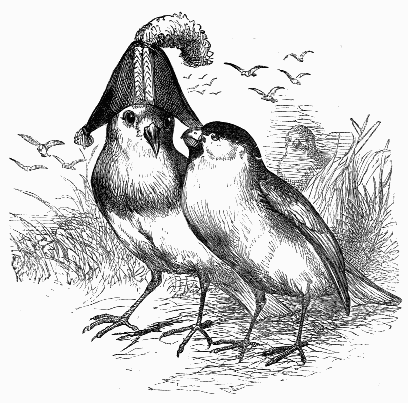
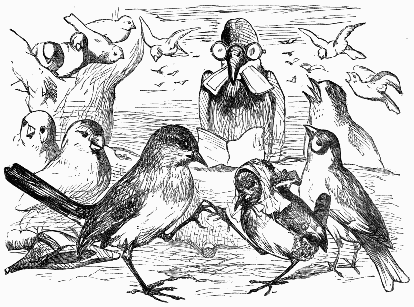
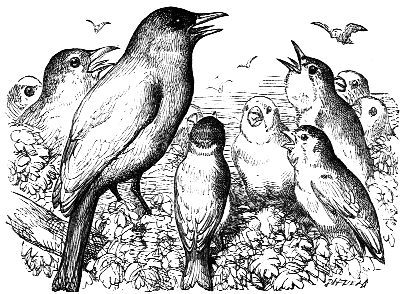
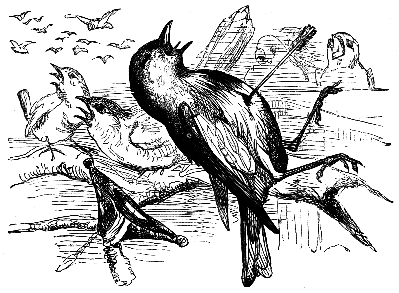
 Alas! Poor Cock Robin!
Alas! Poor Cock Robin!
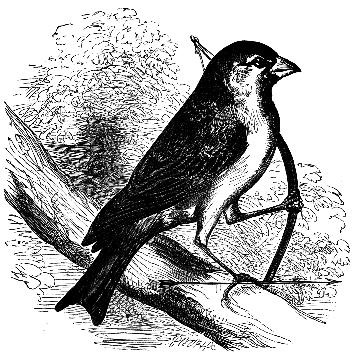
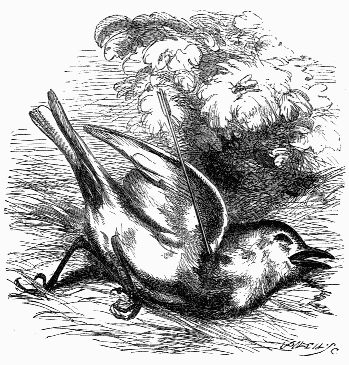
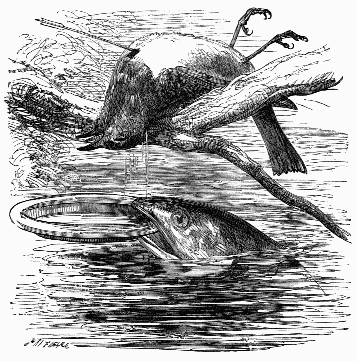
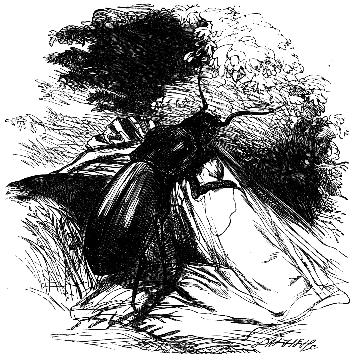
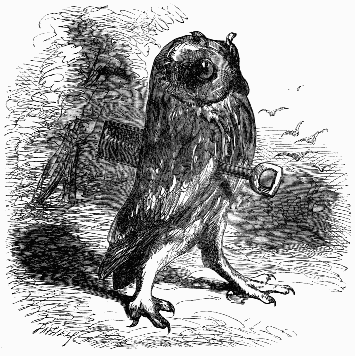
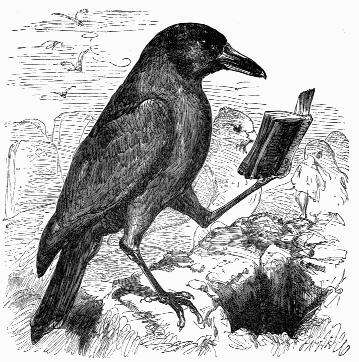
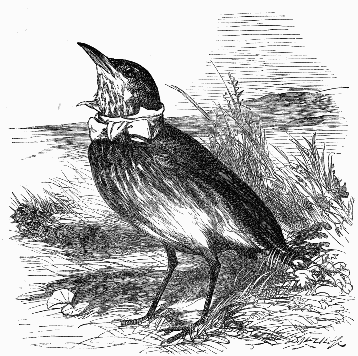
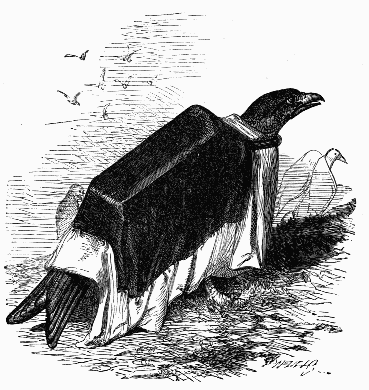
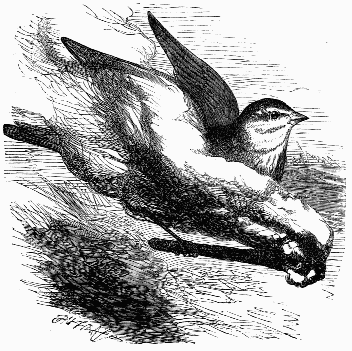
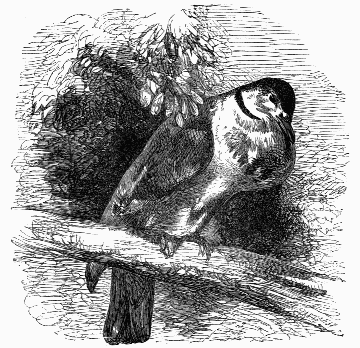
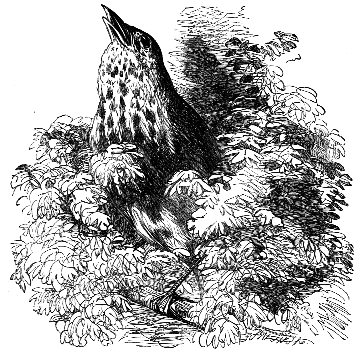
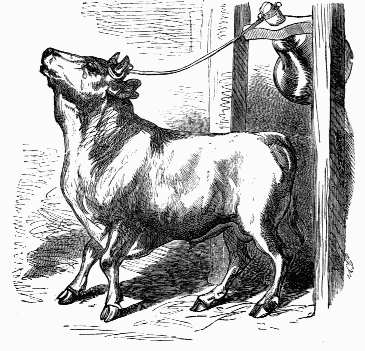
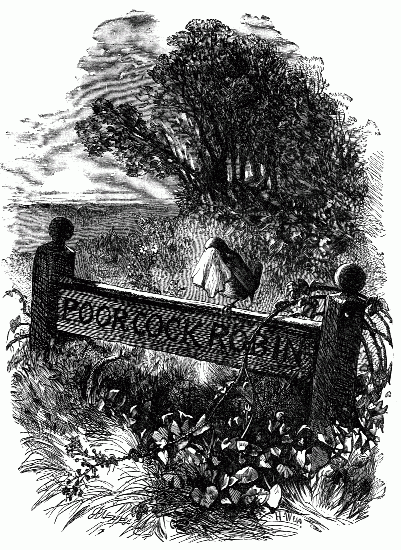
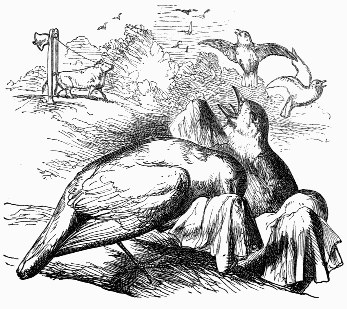

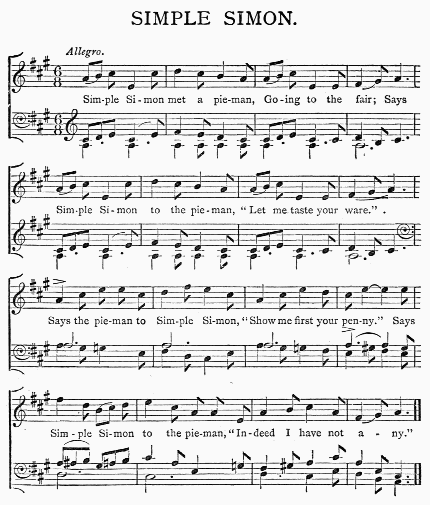
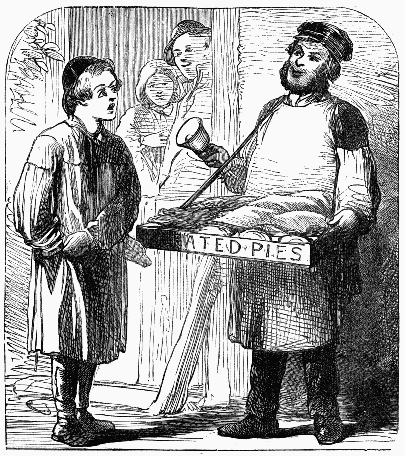
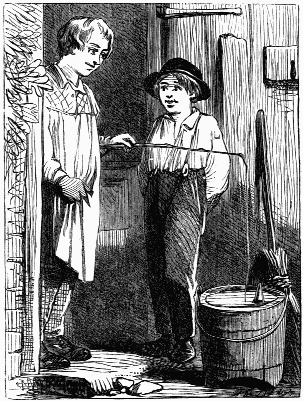
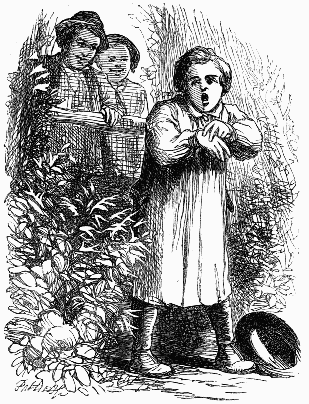
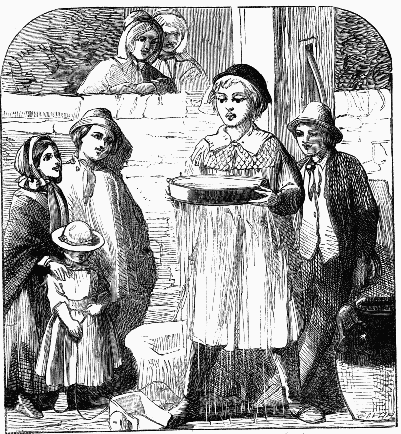
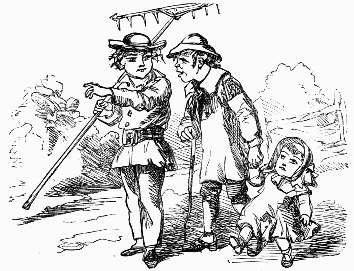
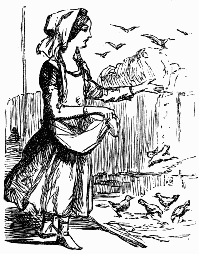
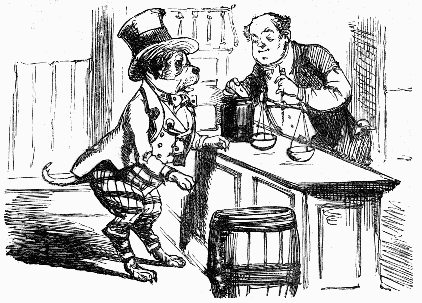
 "A CARRION CROW."
"A CARRION CROW."
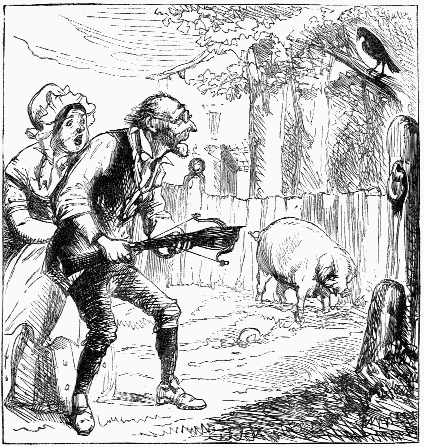
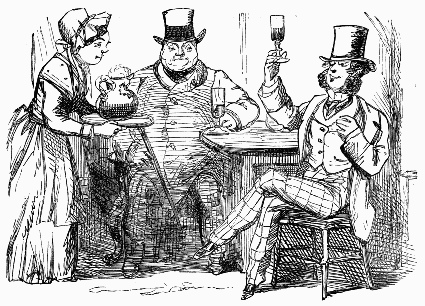
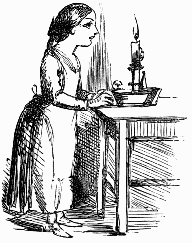
 "A FROG HE WOULD A-WOOING GO."
"A FROG HE WOULD A-WOOING GO."

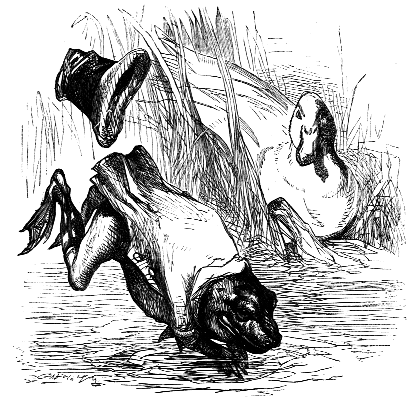
 "AS SOON AS HE PLAY'D THEY BEGAN FOR TO DANCE."
"AS SOON AS HE PLAY'D THEY BEGAN FOR TO DANCE."
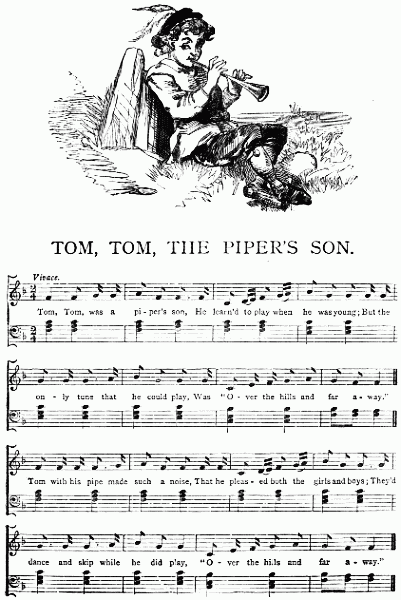
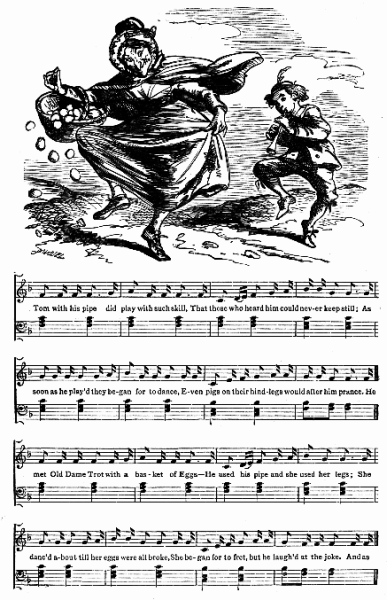
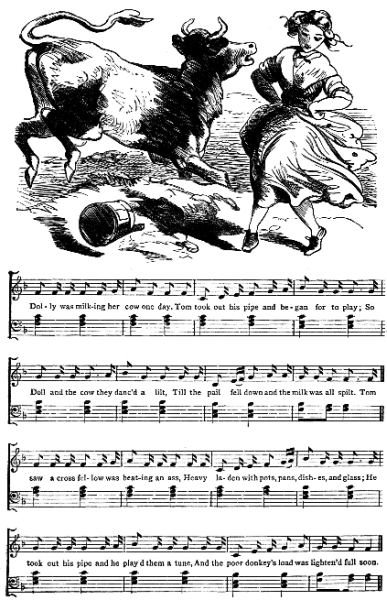
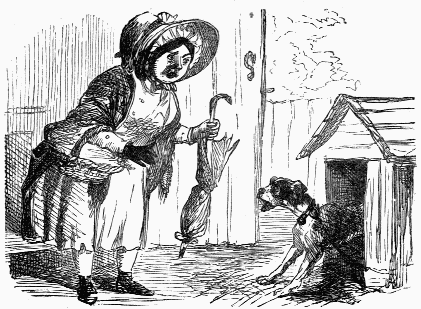
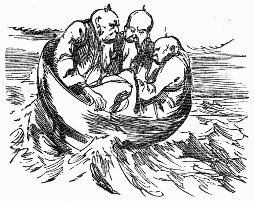
 LITTLE BOY BLUE.
LITTLE BOY BLUE.
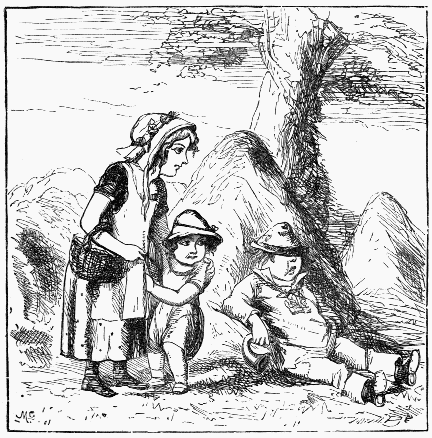
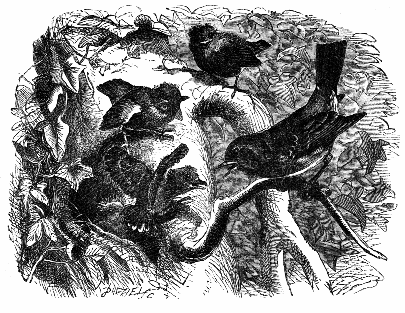
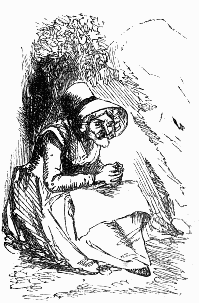
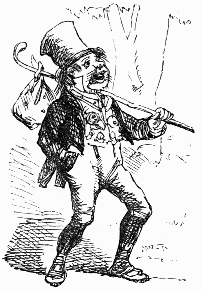
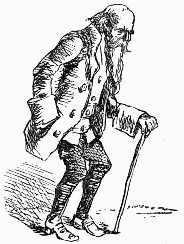
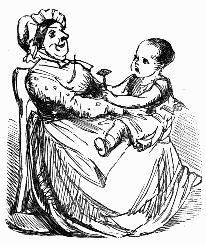
 YOUNG LAMBS TO SELL.
YOUNG LAMBS TO SELL.
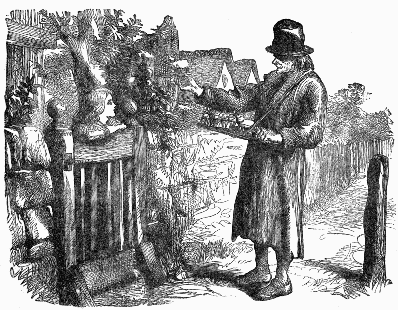
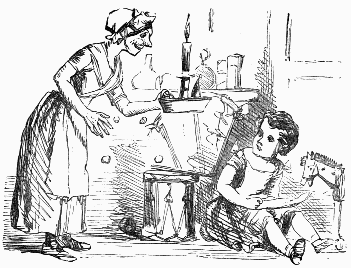
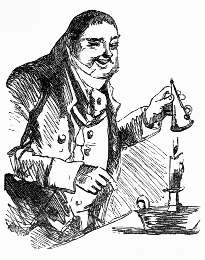
 LITTLE TOM TUCKER.
LITTLE TOM TUCKER.
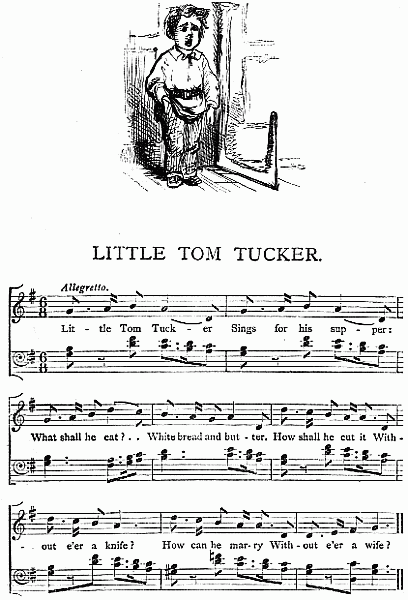
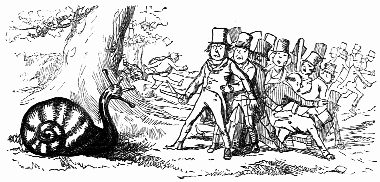
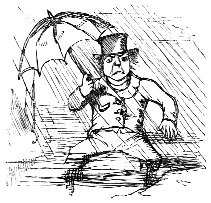
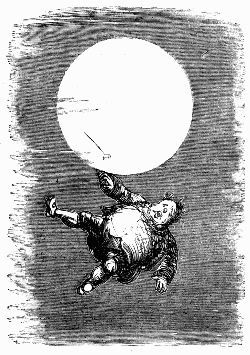
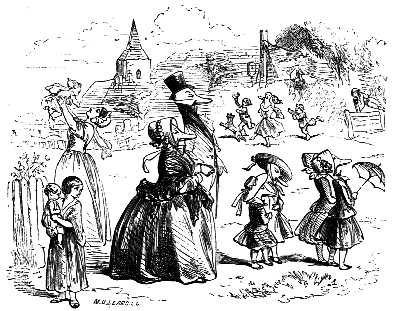
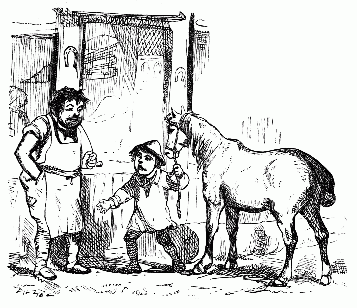
 OLD KING COLE.
OLD KING COLE.
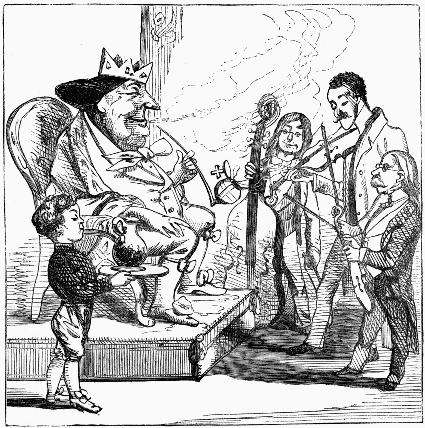
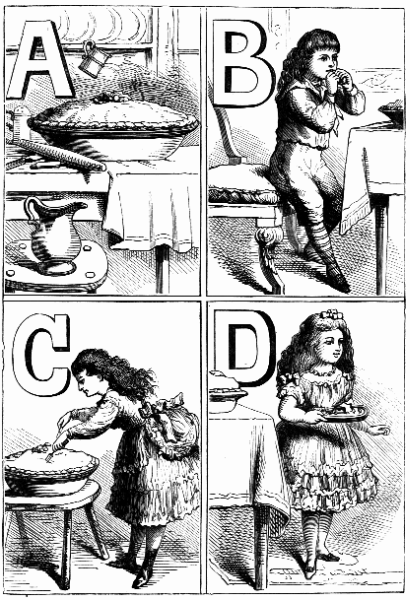
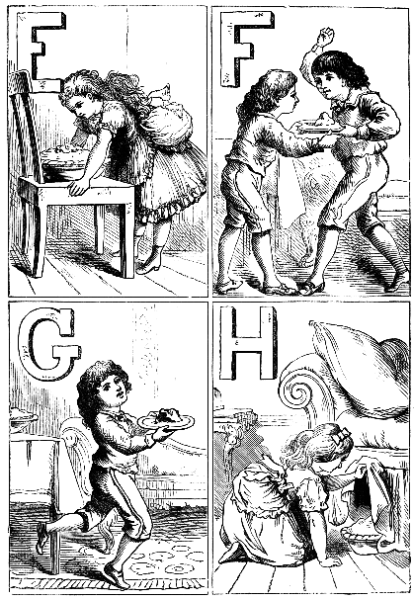
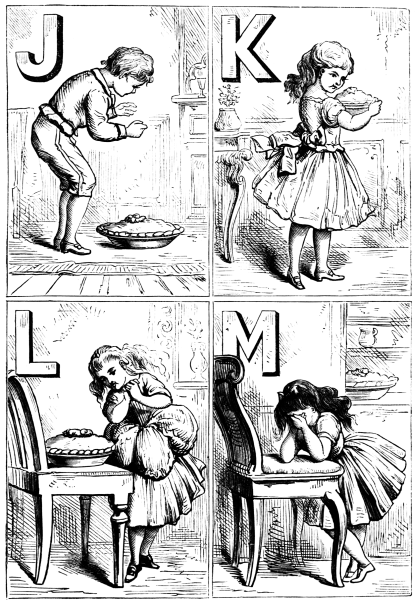
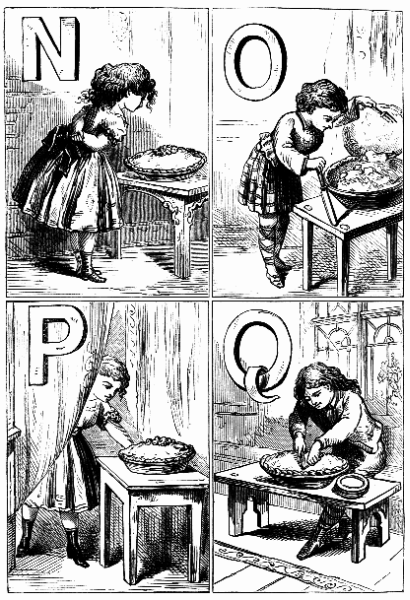
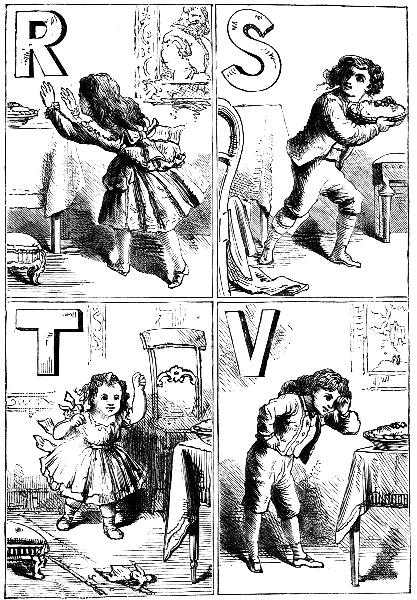
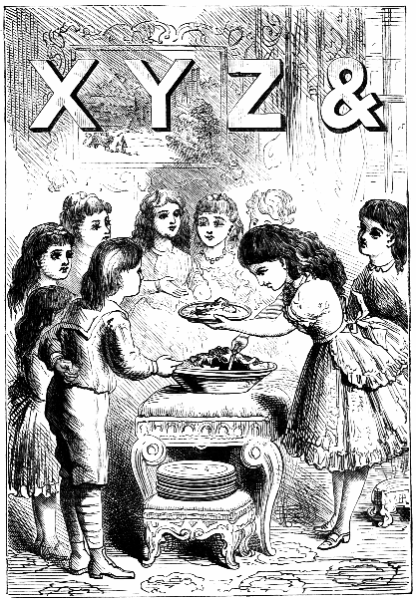
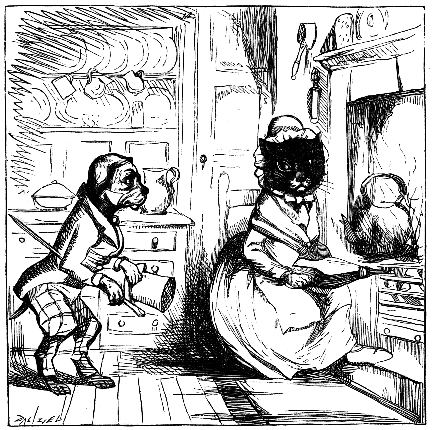
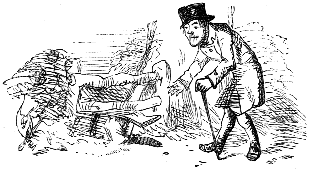
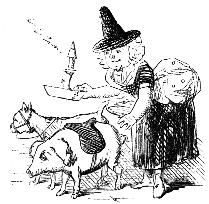
 BAA, BAA, BLACK SHEEP
BAA, BAA, BLACK SHEEP
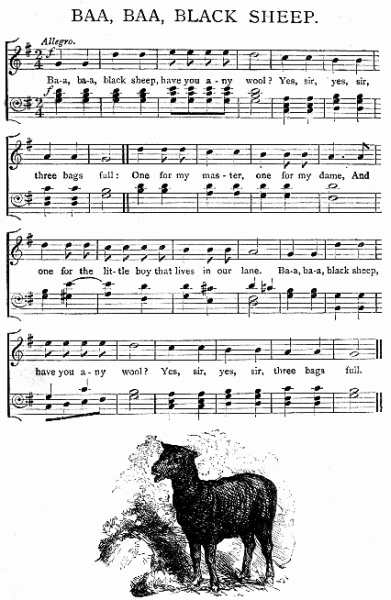
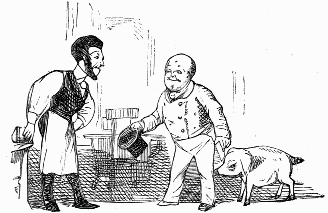
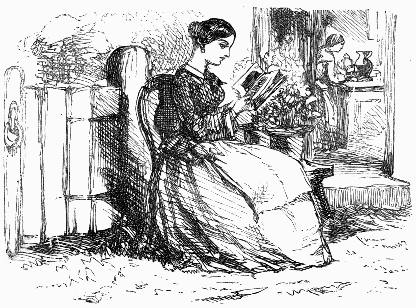
 HEY, DIDDLE, DIDDLE.
HEY, DIDDLE, DIDDLE.
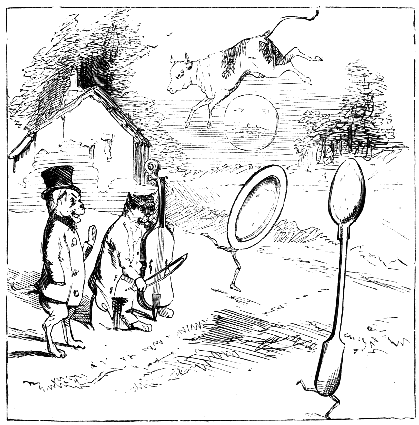
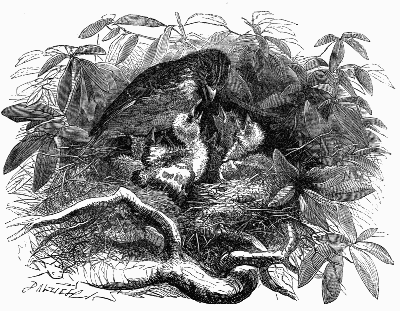
 SEE-SAW, MARGERY DAW.
SEE-SAW, MARGERY DAW.
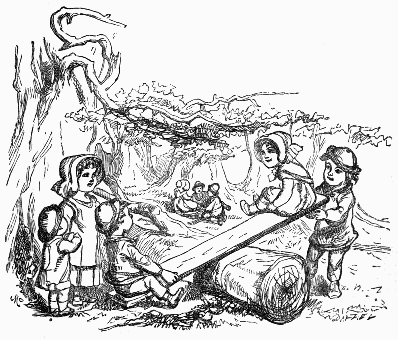

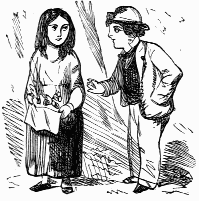
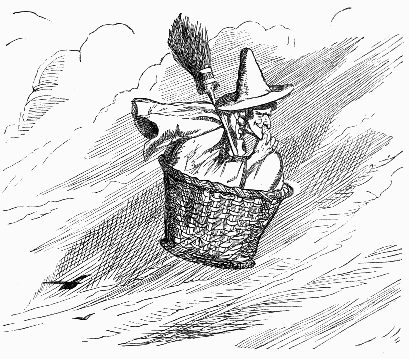
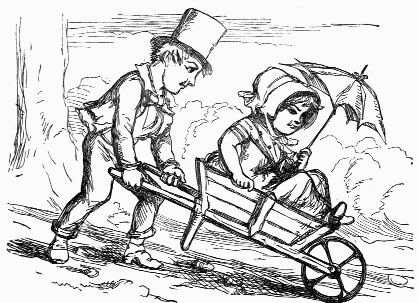
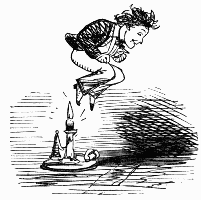
 RIDE A COCK-HORSE.
RIDE A COCK-HORSE.
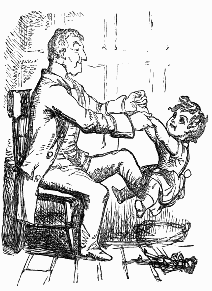
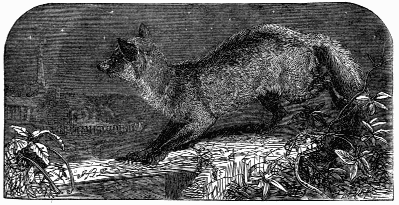

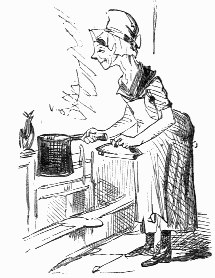
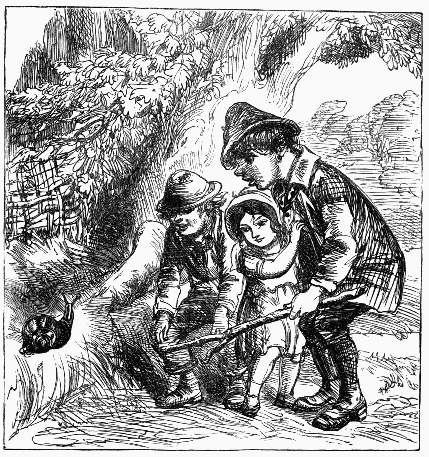
 HARK, HARK, THE DOGS DO BARK.
HARK, HARK, THE DOGS DO BARK.
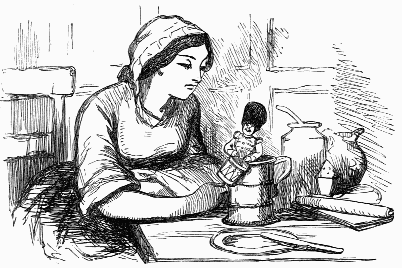
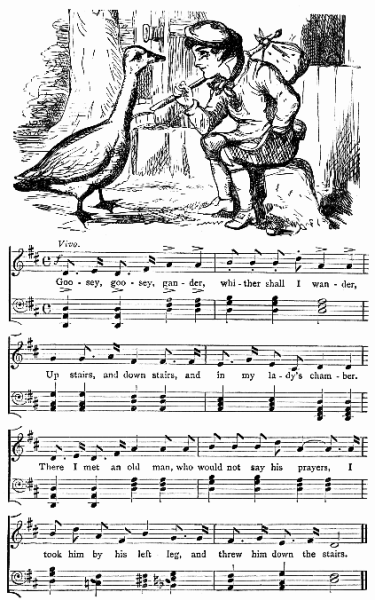
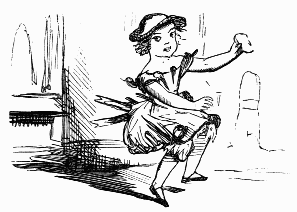
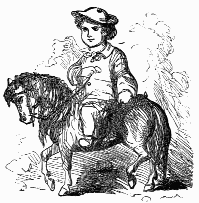
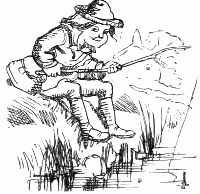
 "THIS IS THE HOUSE THAT JACK BUILT."
"THIS IS THE HOUSE THAT JACK BUILT."
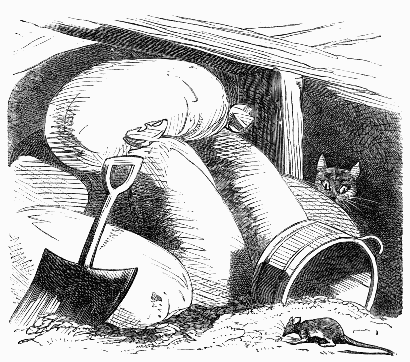
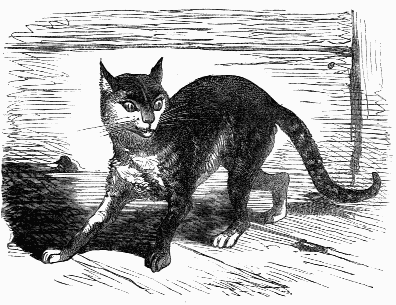
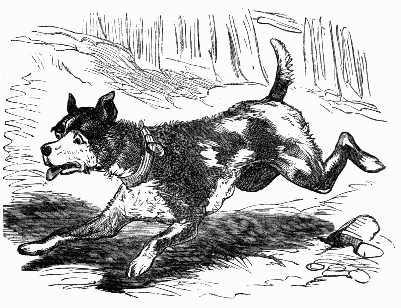
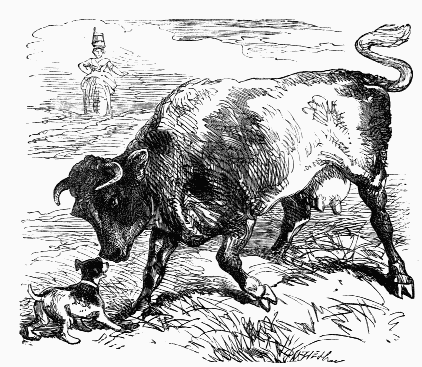
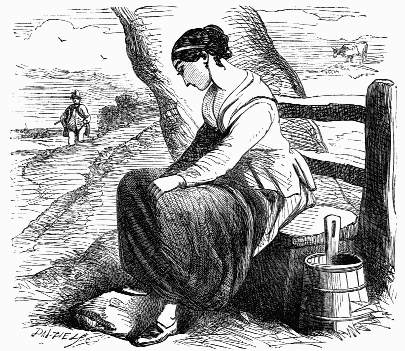
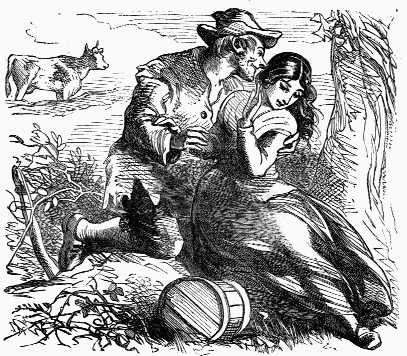
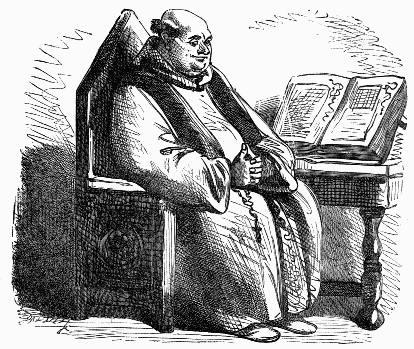
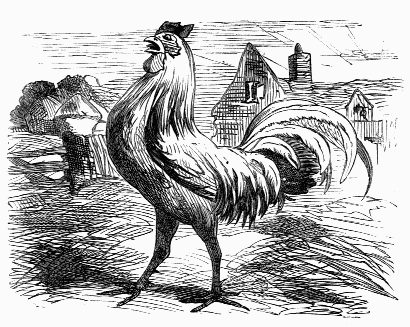
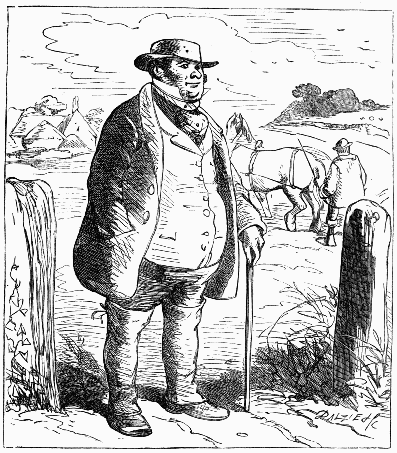


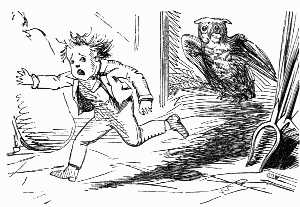
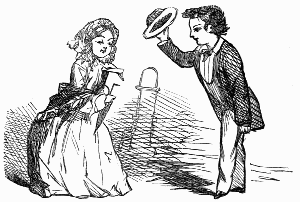
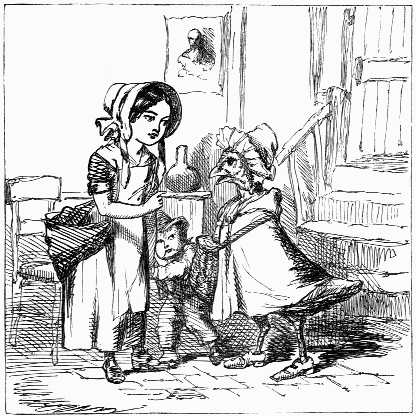
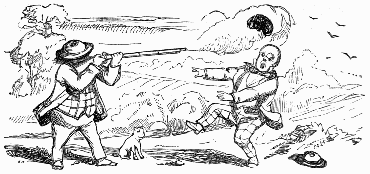
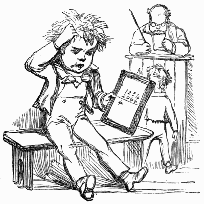
 THE QUEEN OF HEARTS.
THE QUEEN OF HEARTS.
 "JACK AND JILL WENT UP THE HILL."
"JACK AND JILL WENT UP THE HILL."
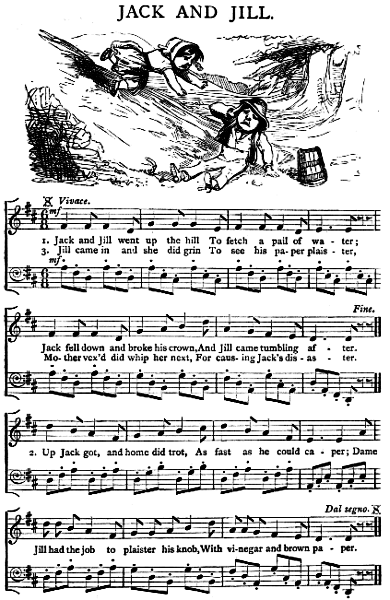
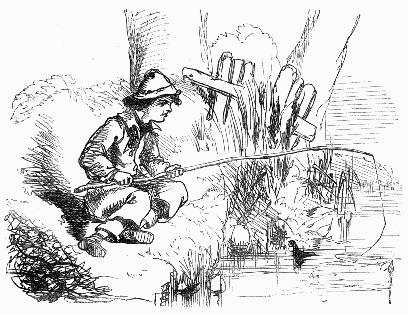
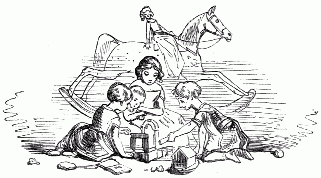
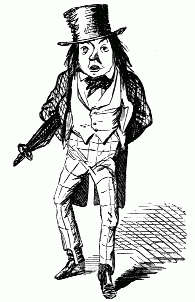
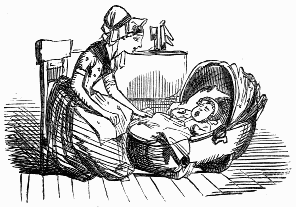
 "THERE WAS AN OLD WOMAN WHO LIVED IN A SHOE."
"THERE WAS AN OLD WOMAN WHO LIVED IN A SHOE."
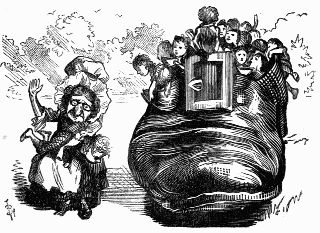
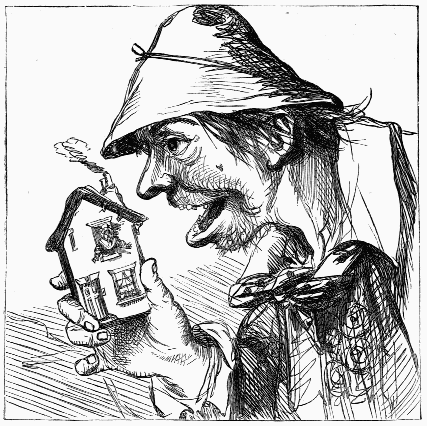
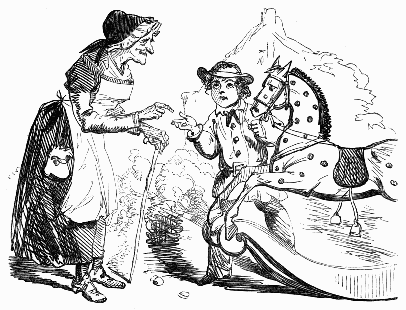
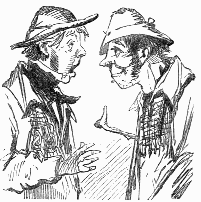
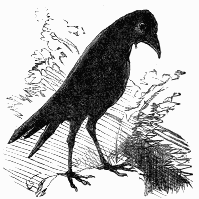
 "DING, DONG, BELL."
"DING, DONG, BELL."
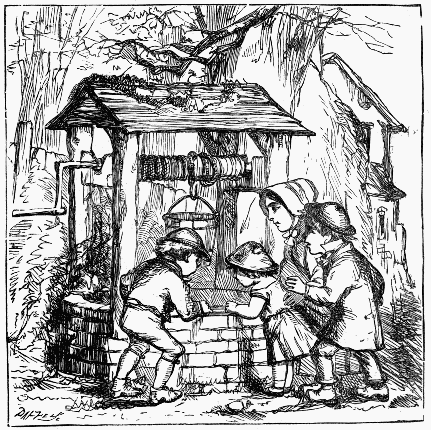

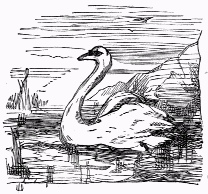
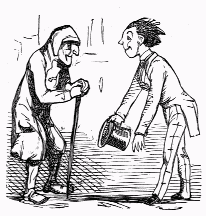
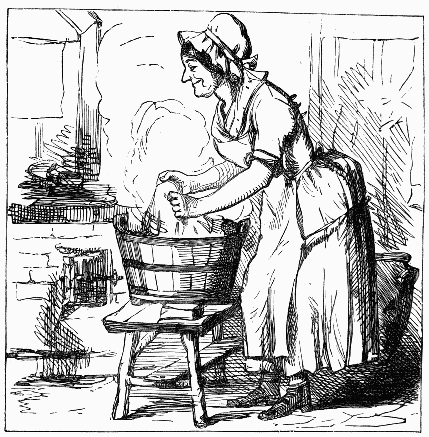
 "HICKETY, PICKETY, MY BLACK HEN."
"HICKETY, PICKETY, MY BLACK HEN."
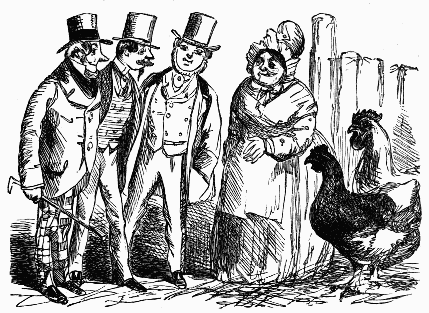
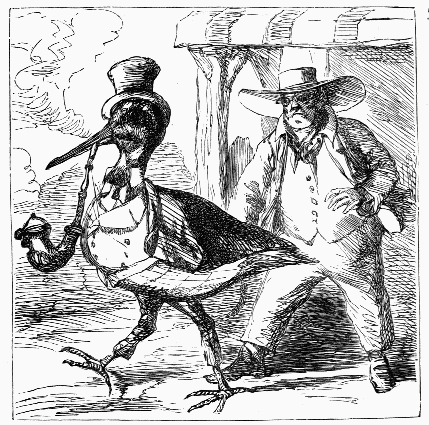
 "WHEN THE PIE WAS OPENED, THE BIRDS BEGAN TO SING."
"WHEN THE PIE WAS OPENED, THE BIRDS BEGAN TO SING."
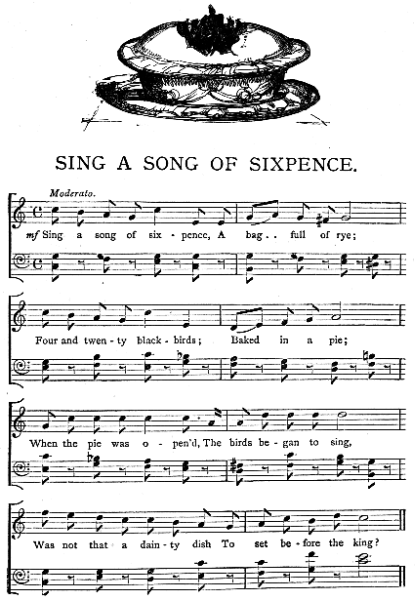
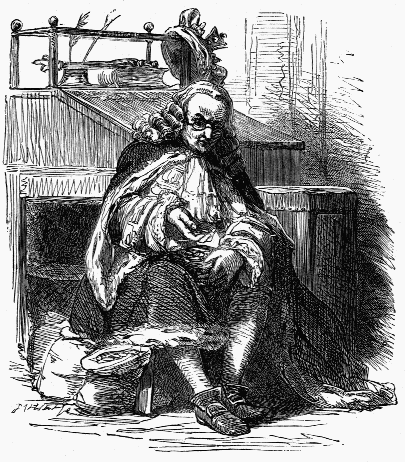
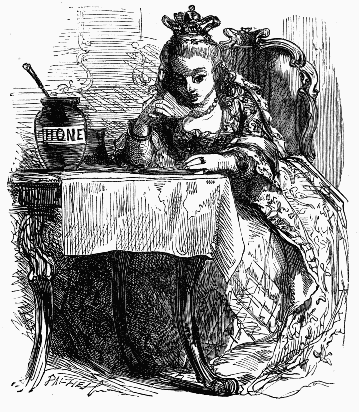
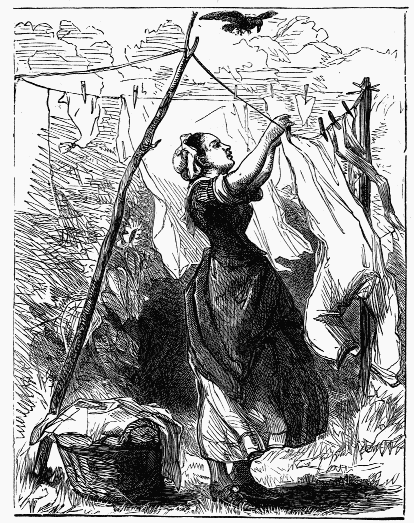
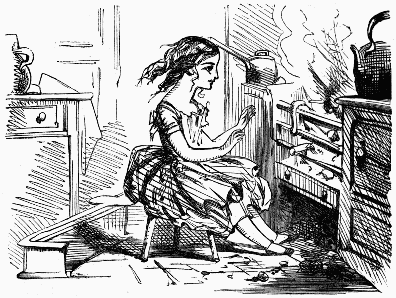
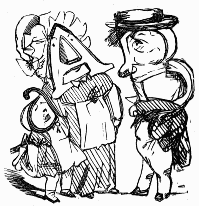
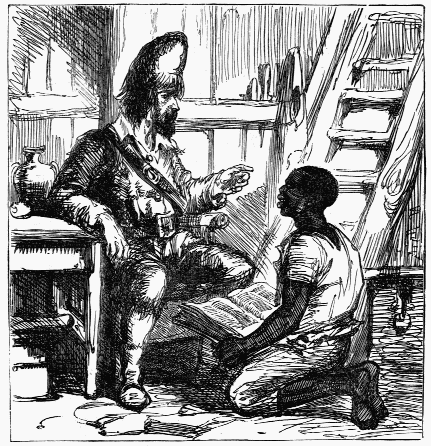
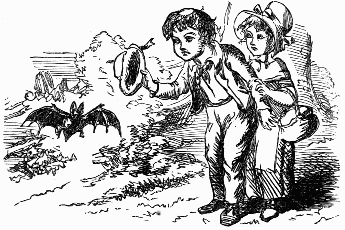
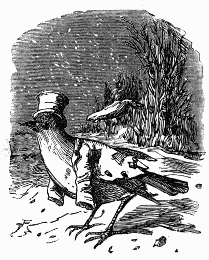
 THE OLD WOMAN BUYING HER PIG AT MARKET.
THE OLD WOMAN BUYING HER PIG AT MARKET.
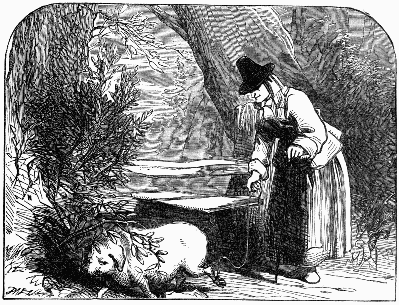
 "FIRE, FIRE, BURN STICK."
"FIRE, FIRE, BURN STICK."
 "BUTCHER, BUTCHER, KILL OX."
"BUTCHER, BUTCHER, KILL OX."
 "RAT, RAT, GNAW ROPE."
"RAT, RAT, GNAW ROPE."
 "COW, COW, GIVE ME A SAUCER OF MILK."
"COW, COW, GIVE ME A SAUCER OF MILK."
 "HAYMAKERS, GIVE ME A WISP OF HAY."
"HAYMAKERS, GIVE ME A WISP OF HAY."
 "THE CAT BEGAN TO KILL THE RAT."
"THE CAT BEGAN TO KILL THE RAT."
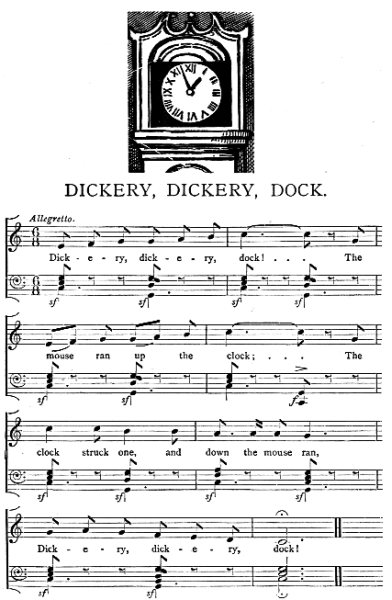
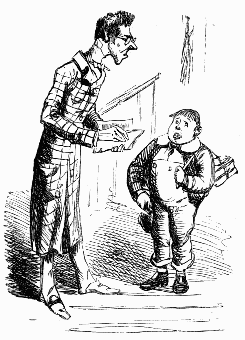
 "TOMMY KEPT A CHANDLER'S SHOP."
"TOMMY KEPT A CHANDLER'S SHOP."
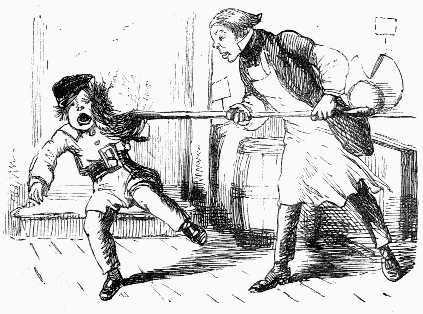
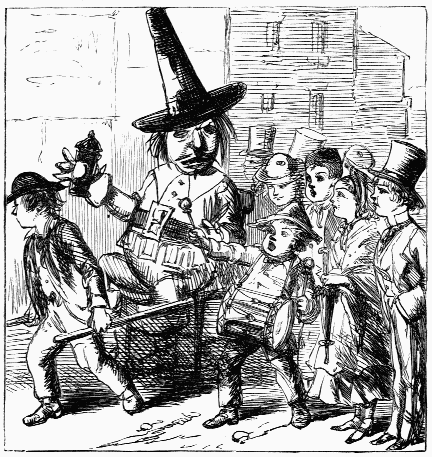
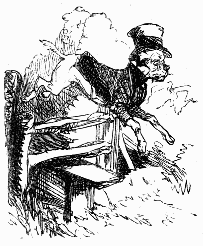
 "THERE WAS AN OLD MAN OF TOBAGO."
"THERE WAS AN OLD MAN OF TOBAGO."
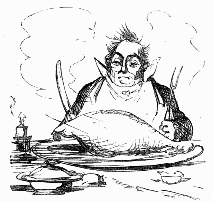
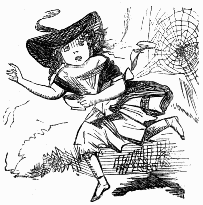
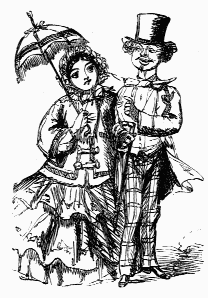
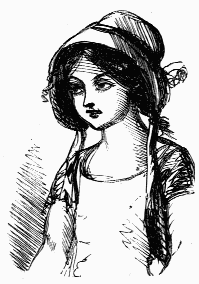
 "AWAY WENT GILPIN, AND AWAY WENT POSTBOY AT HIS HEELS."
"AWAY WENT GILPIN, AND AWAY WENT POSTBOY AT HIS HEELS."


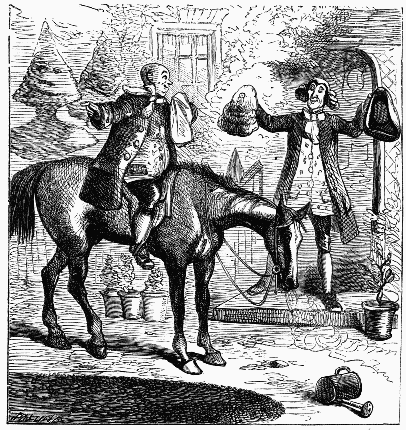
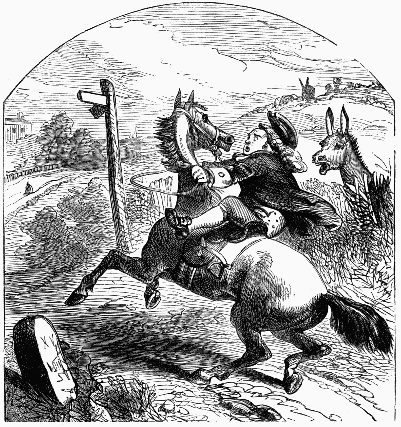
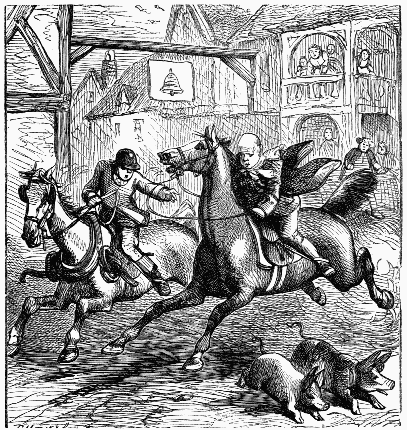
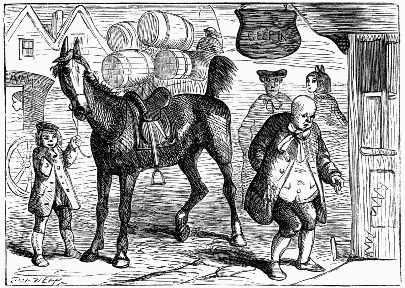
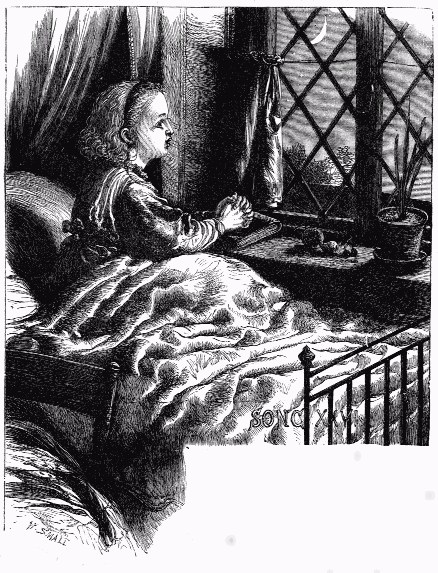
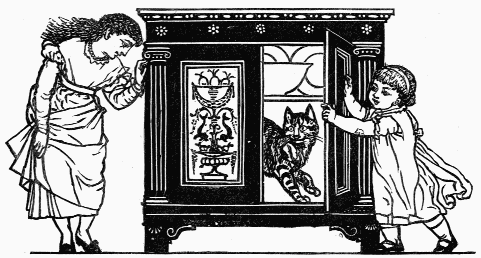
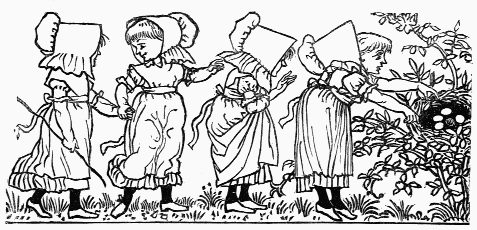
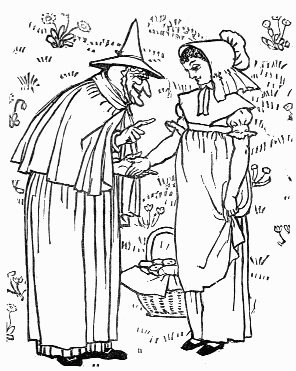
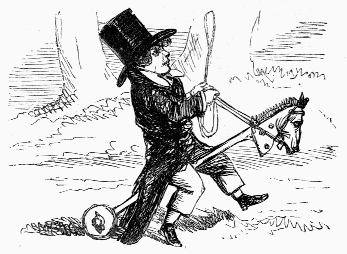
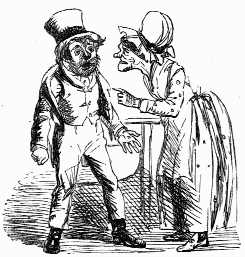
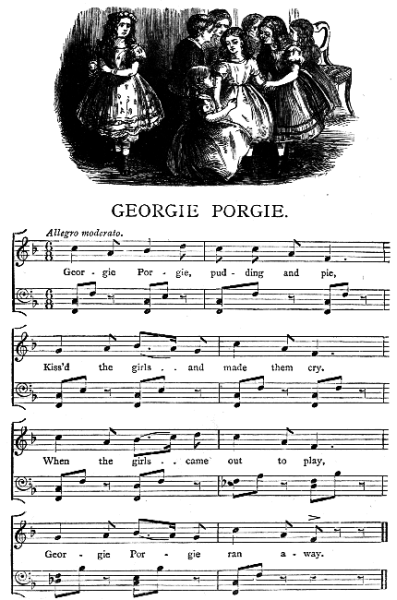
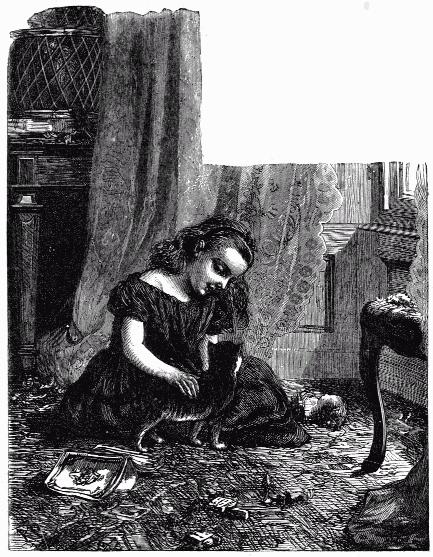

 "A FARMER WENT TROTTING UPON HIS GREY MARE."
"A FARMER WENT TROTTING UPON HIS GREY MARE."
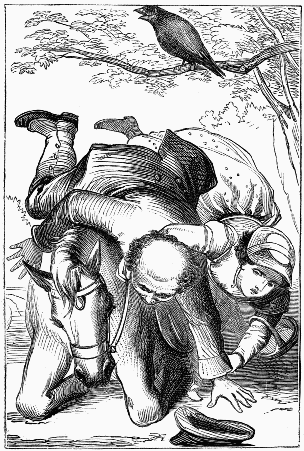
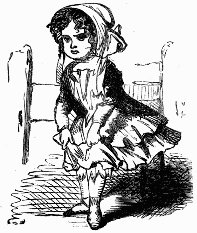
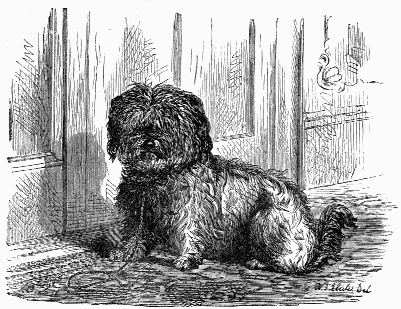
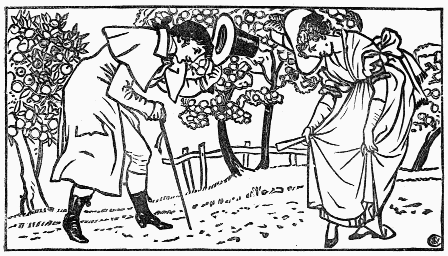
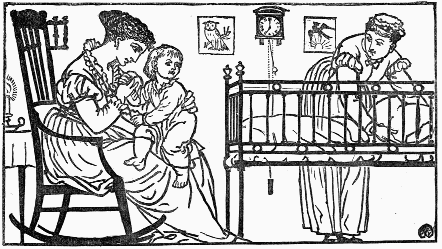
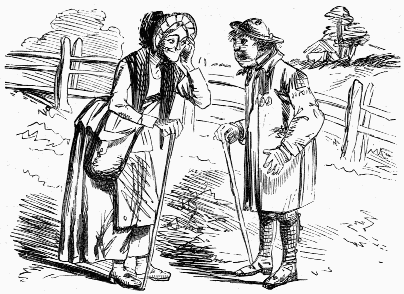
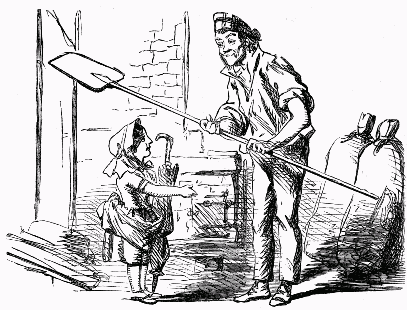
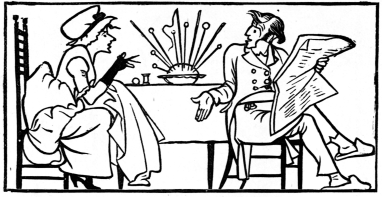
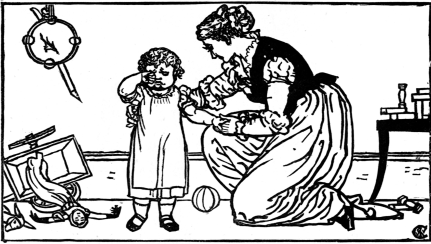
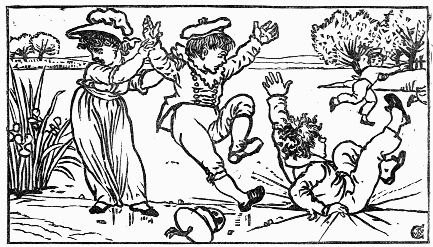
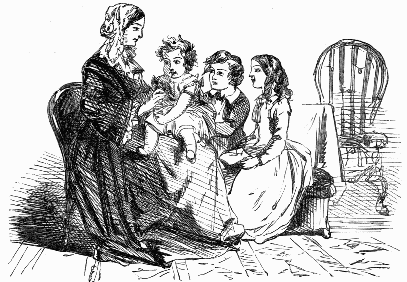
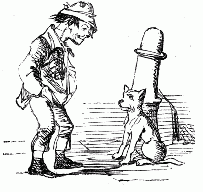
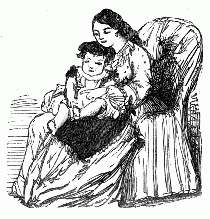
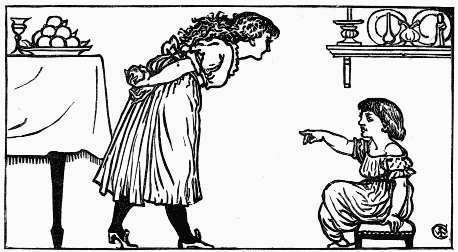
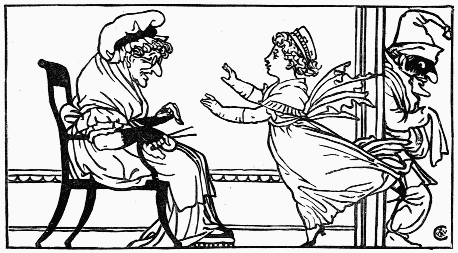
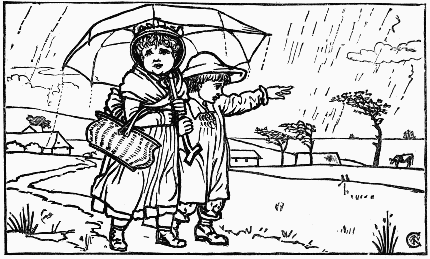
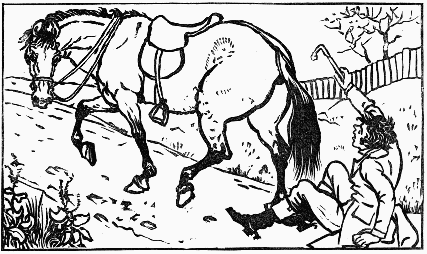
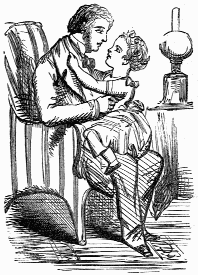
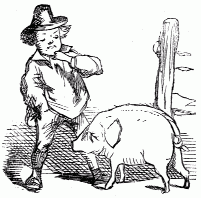
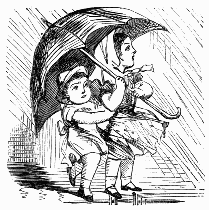
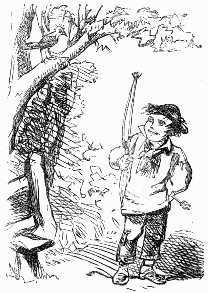
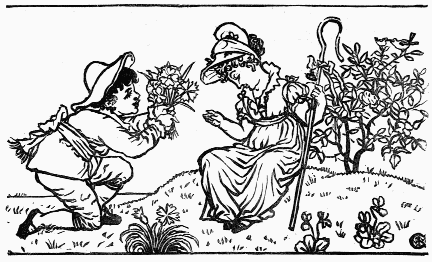
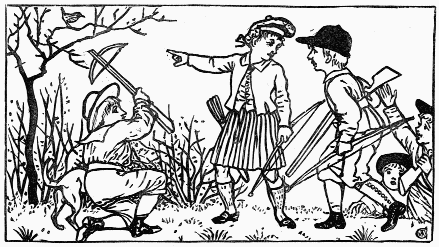
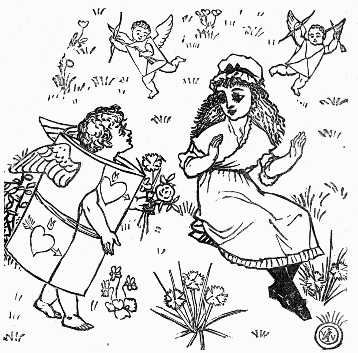
 "LITTLE BO-PEEP HAS LOST HER SHEEP, AND CAN'T TELL WHERE
TO FIND THEM."
"LITTLE BO-PEEP HAS LOST HER SHEEP, AND CAN'T TELL WHERE
TO FIND THEM."
